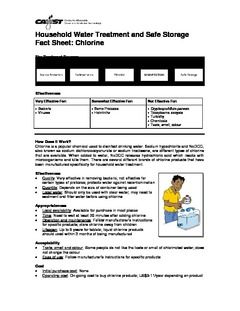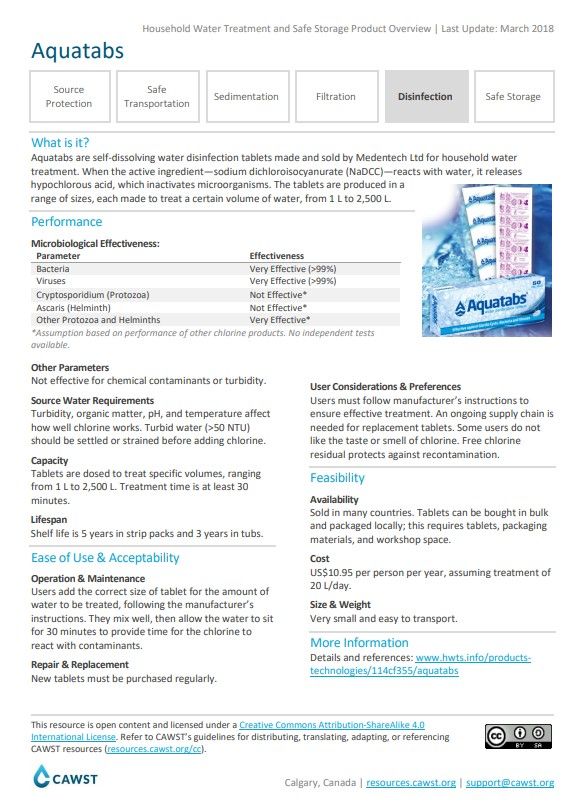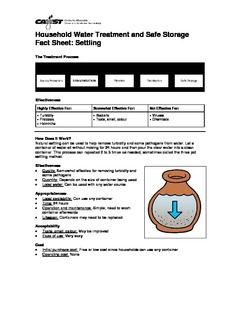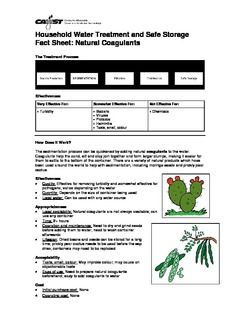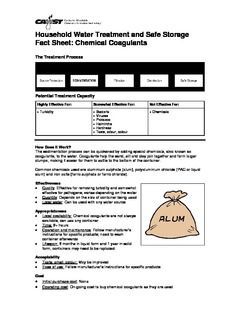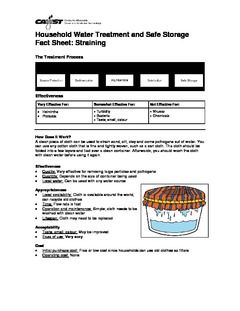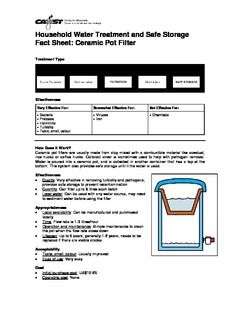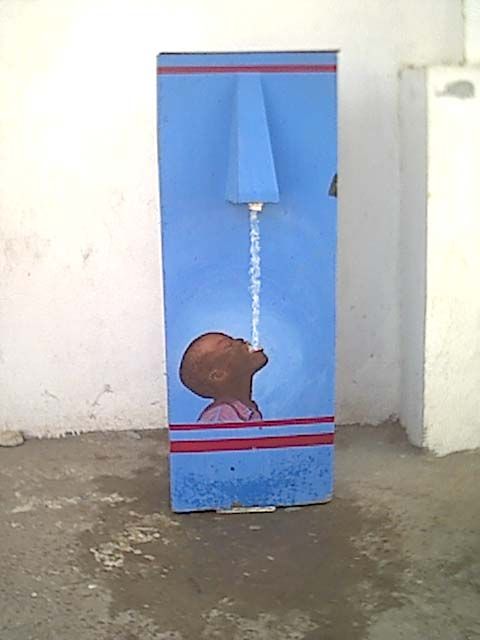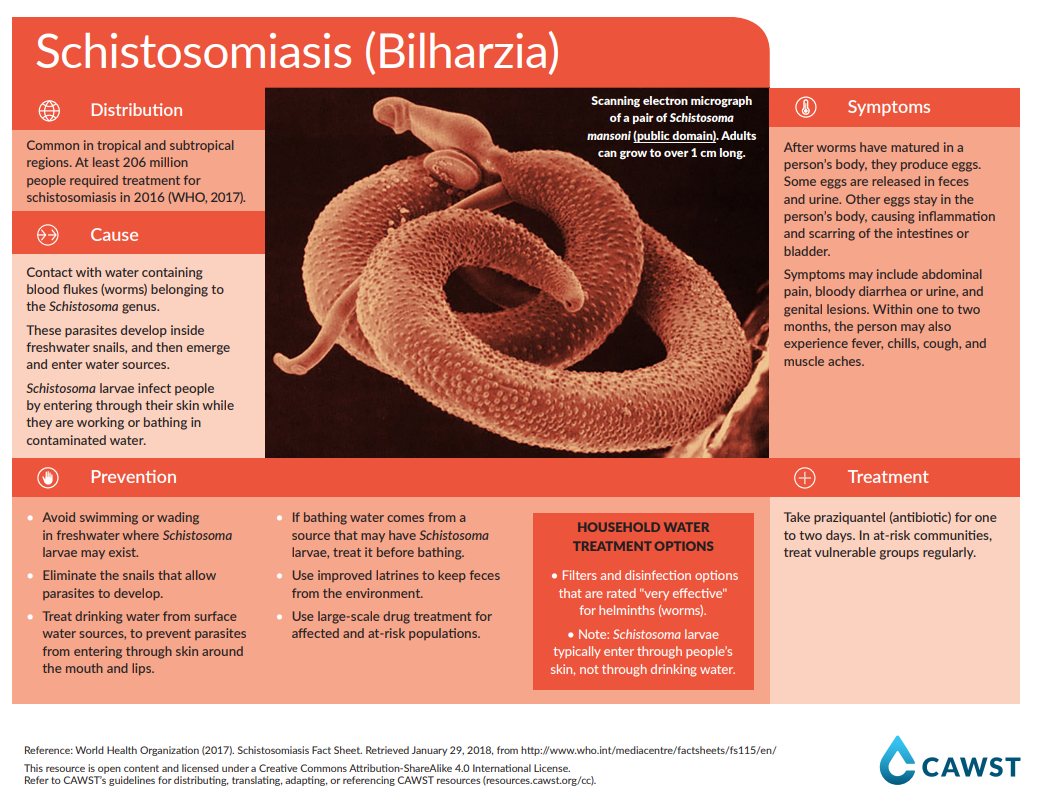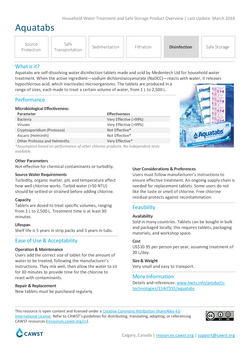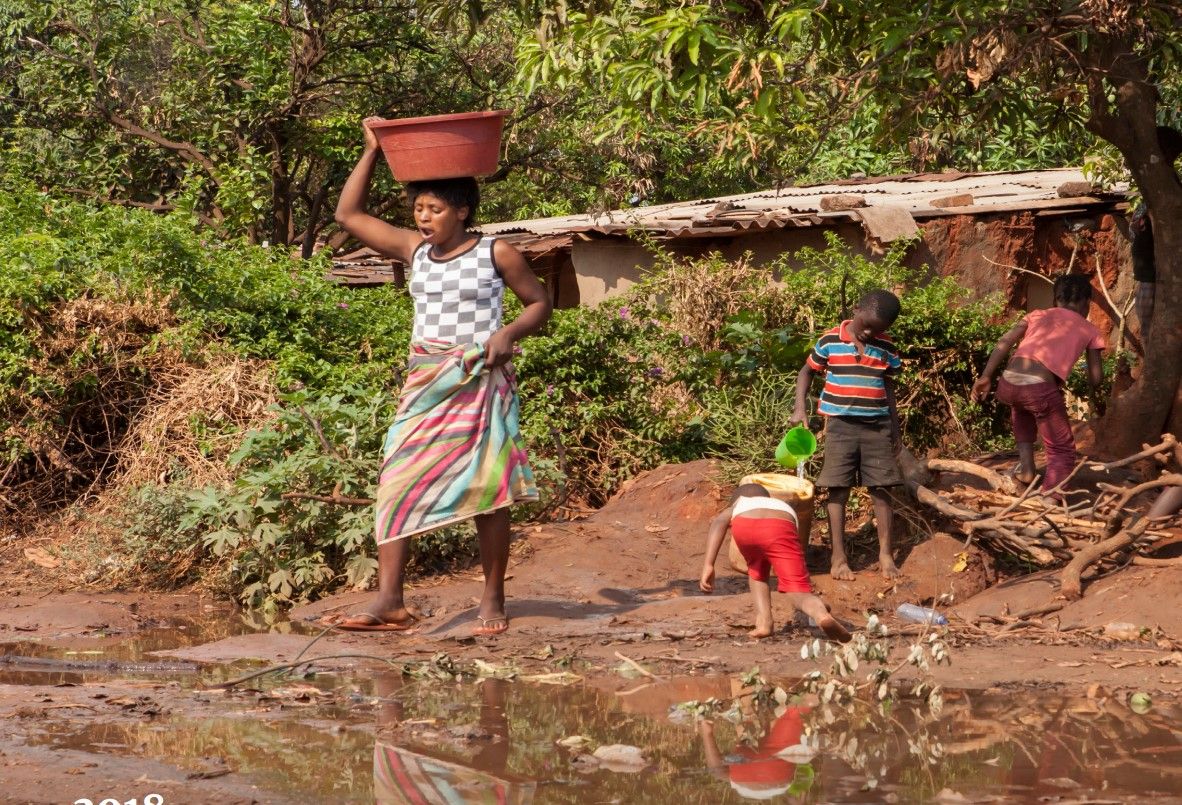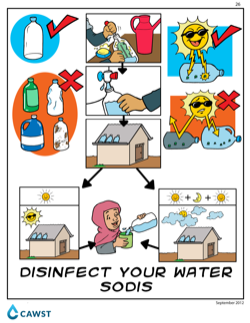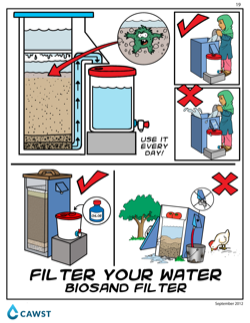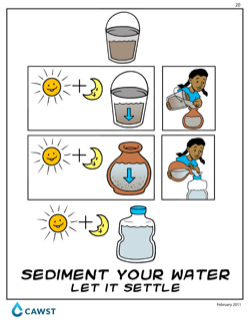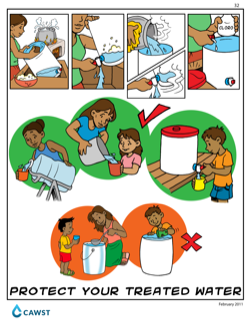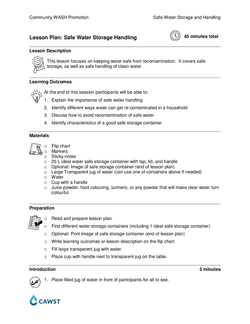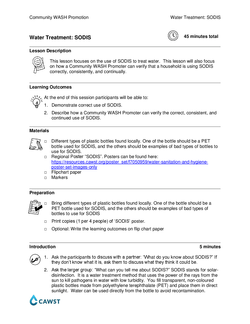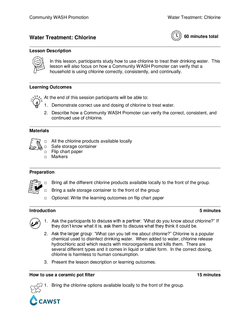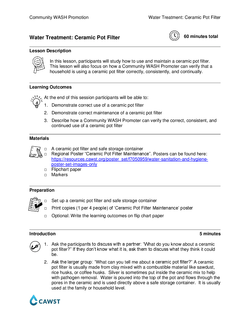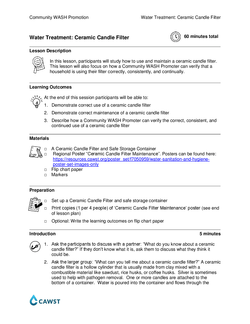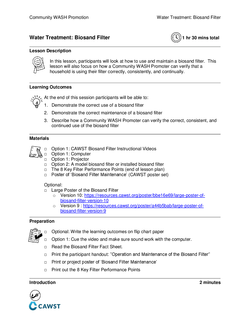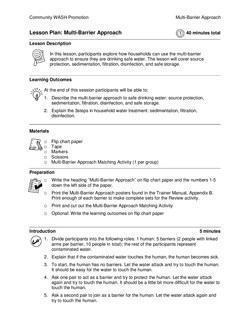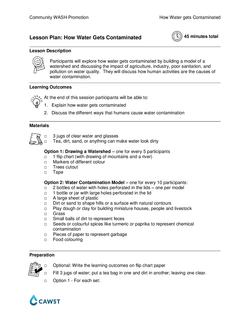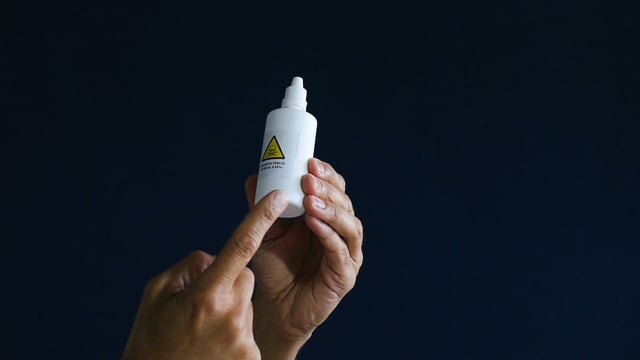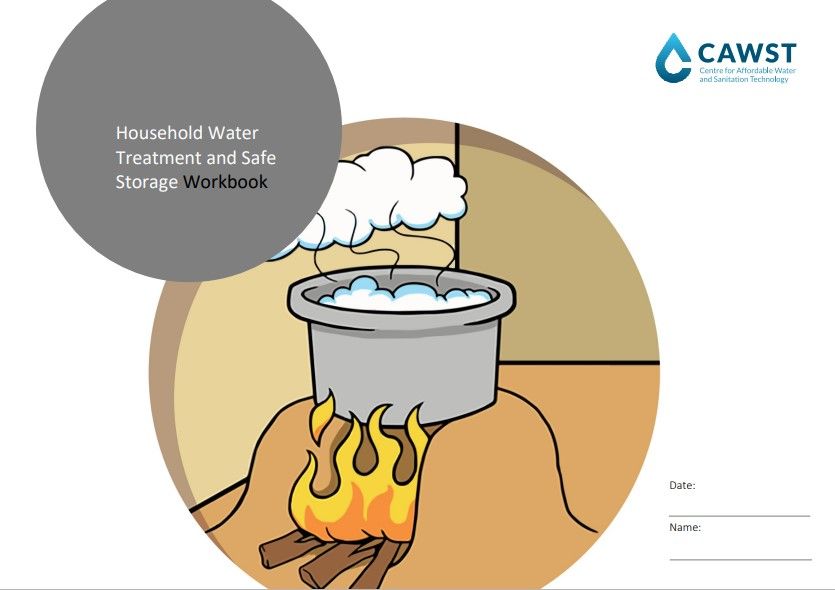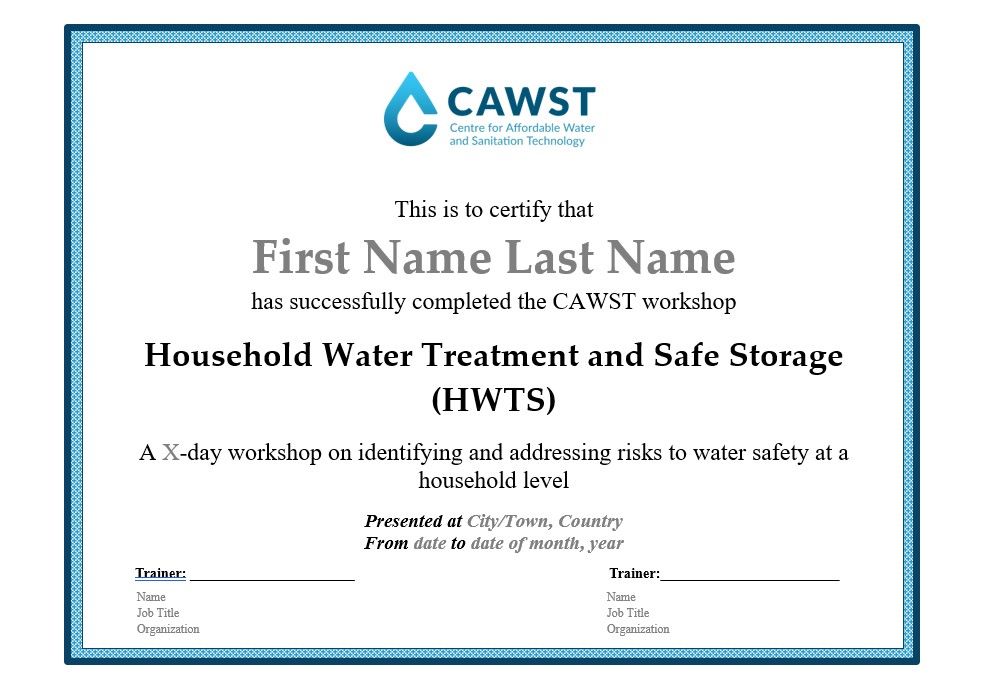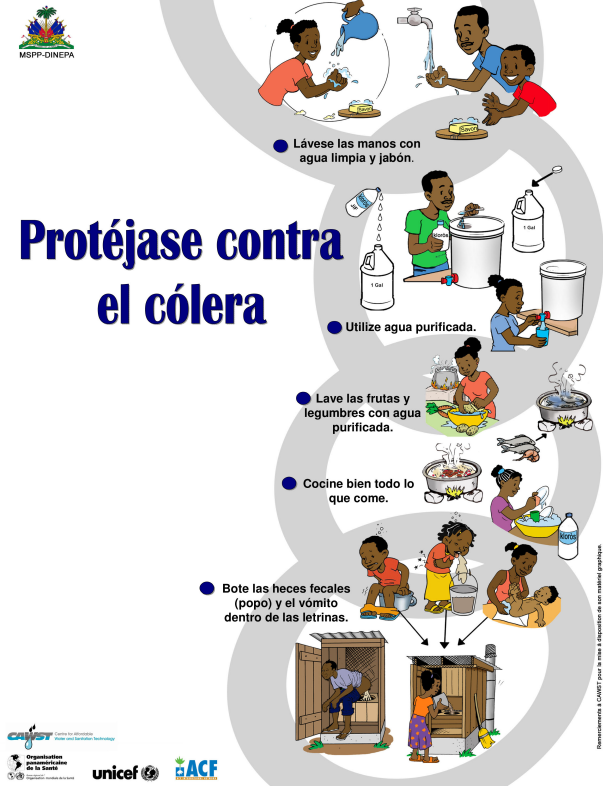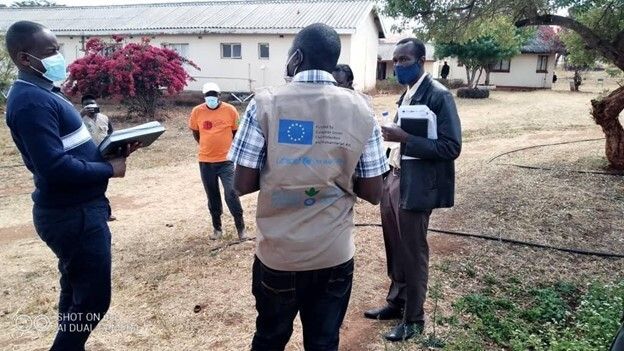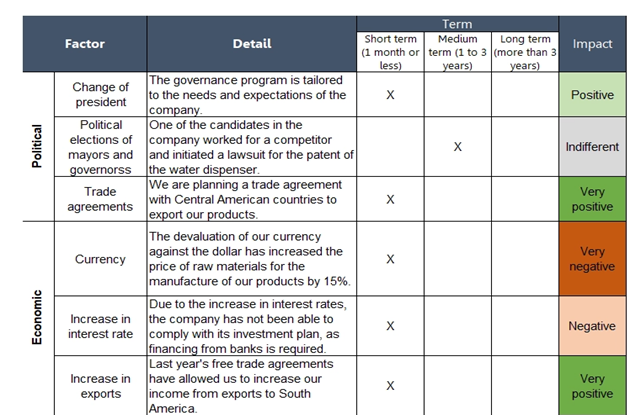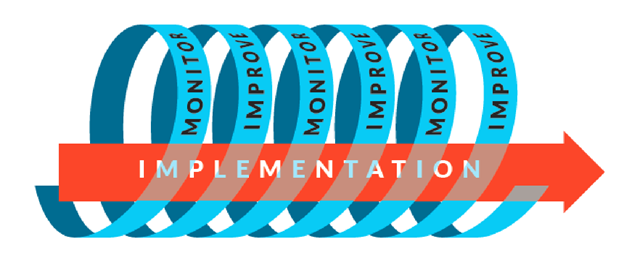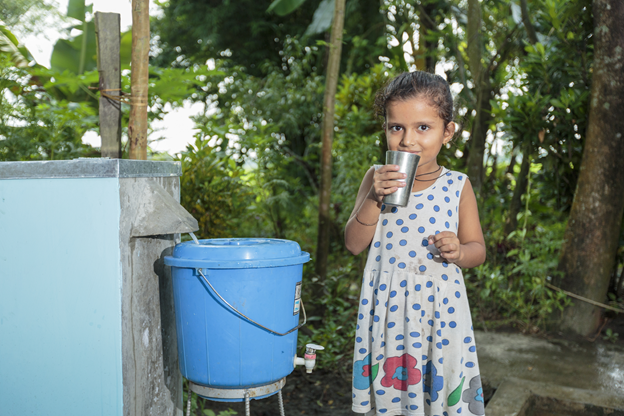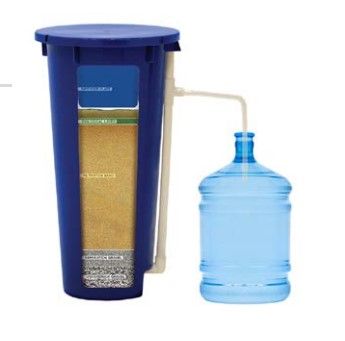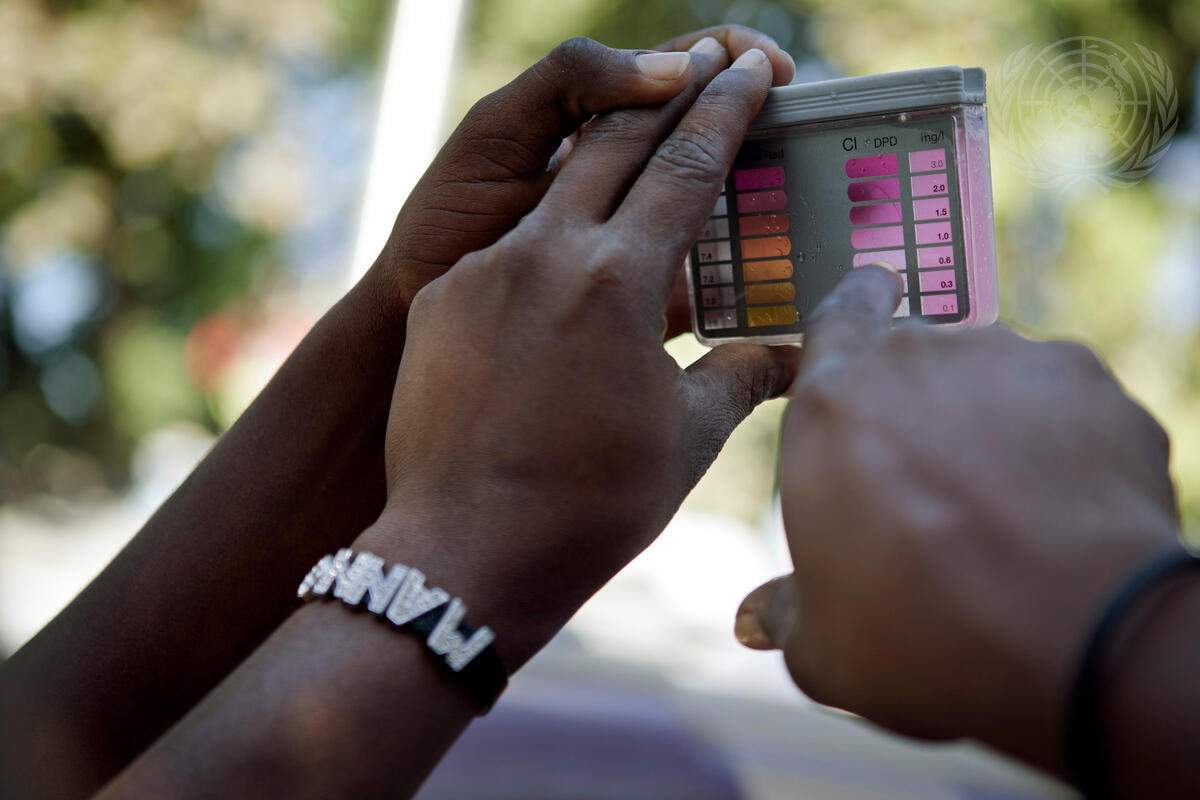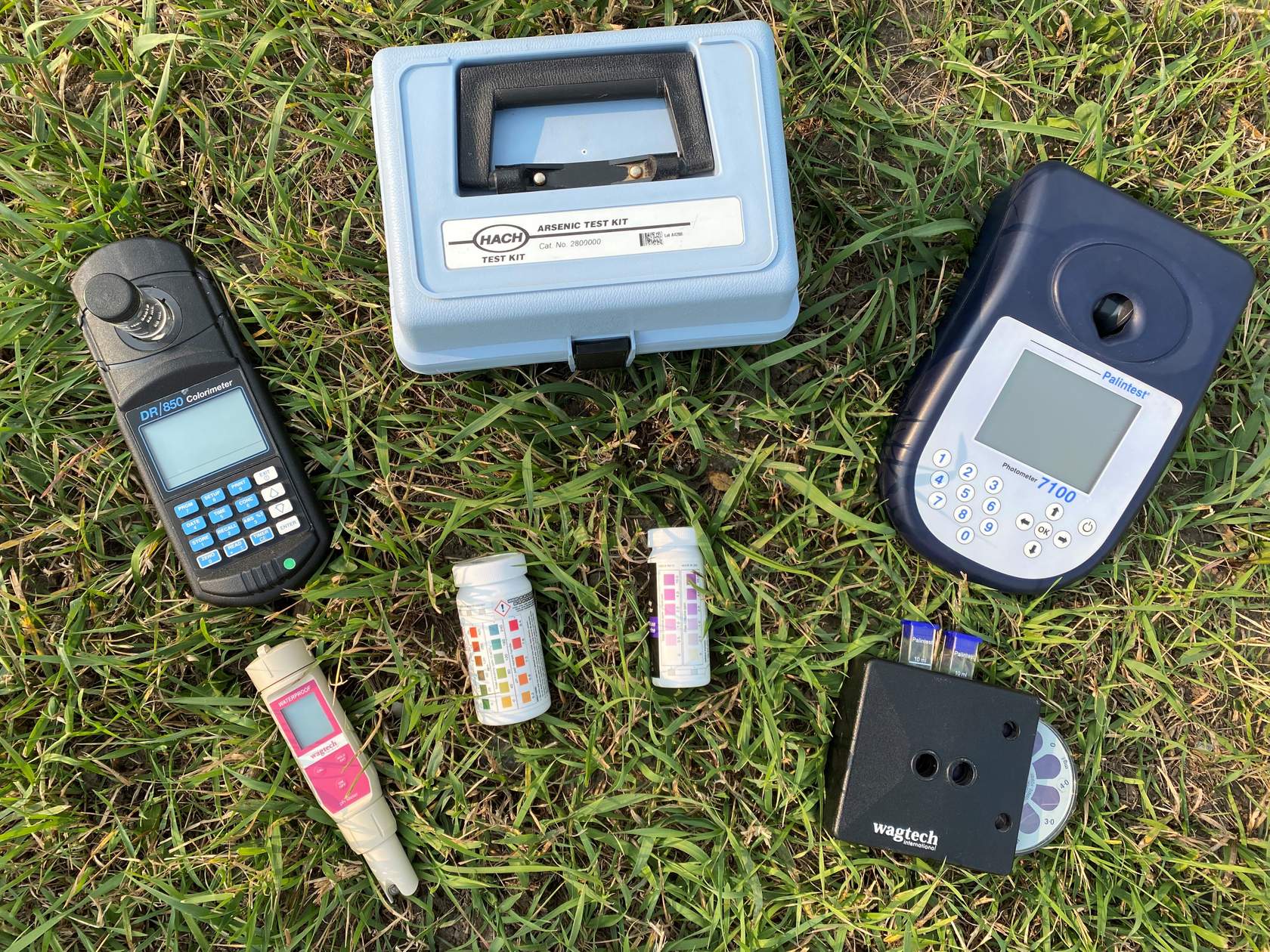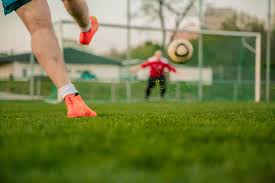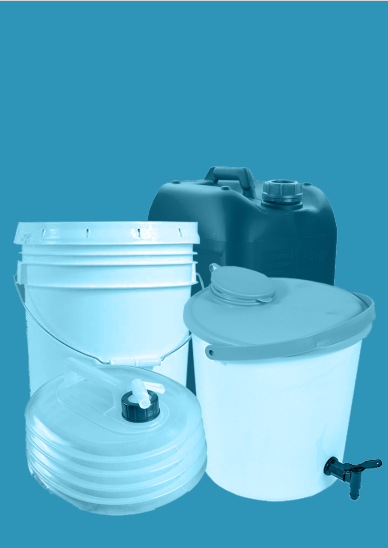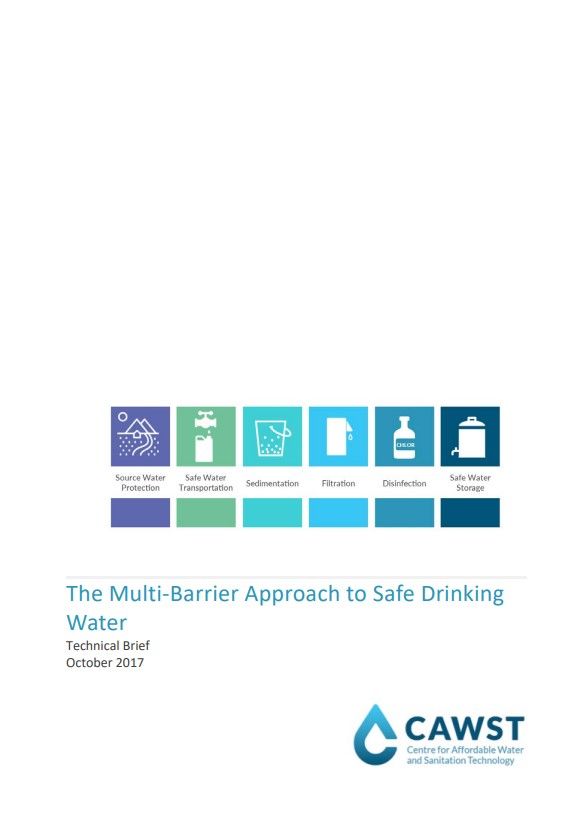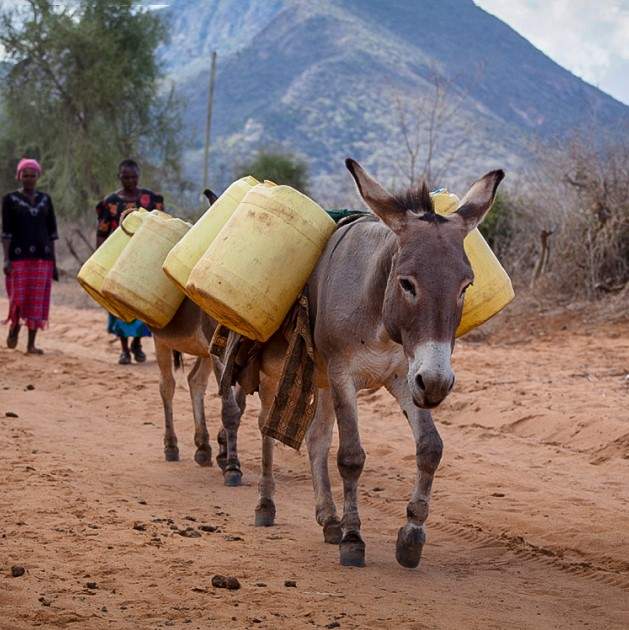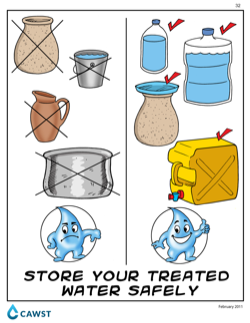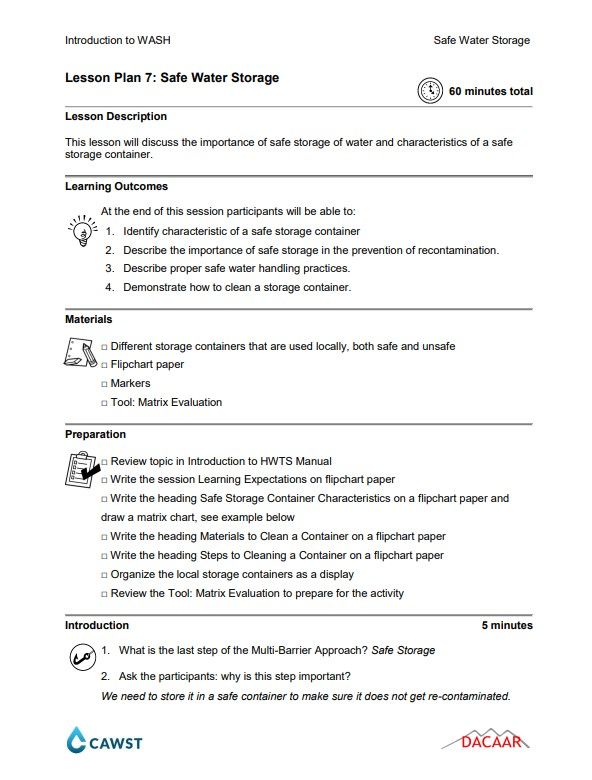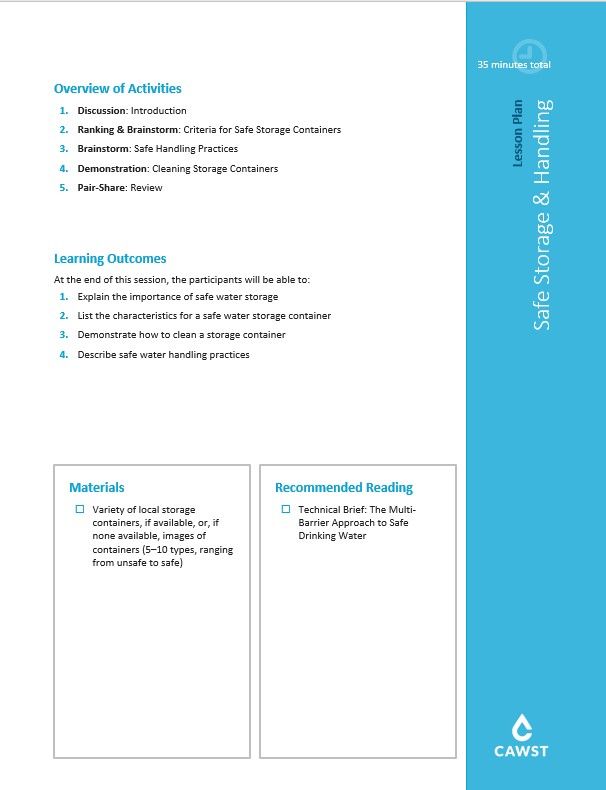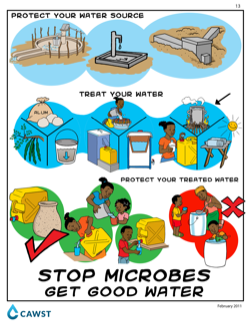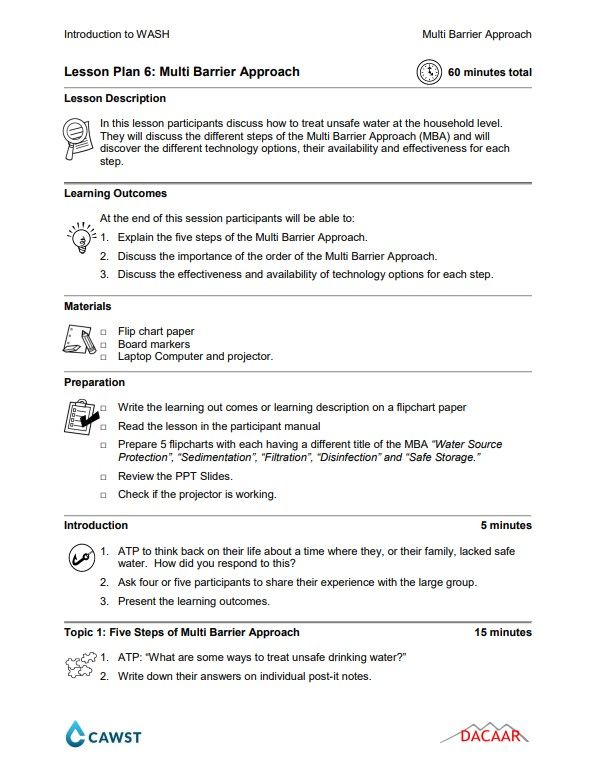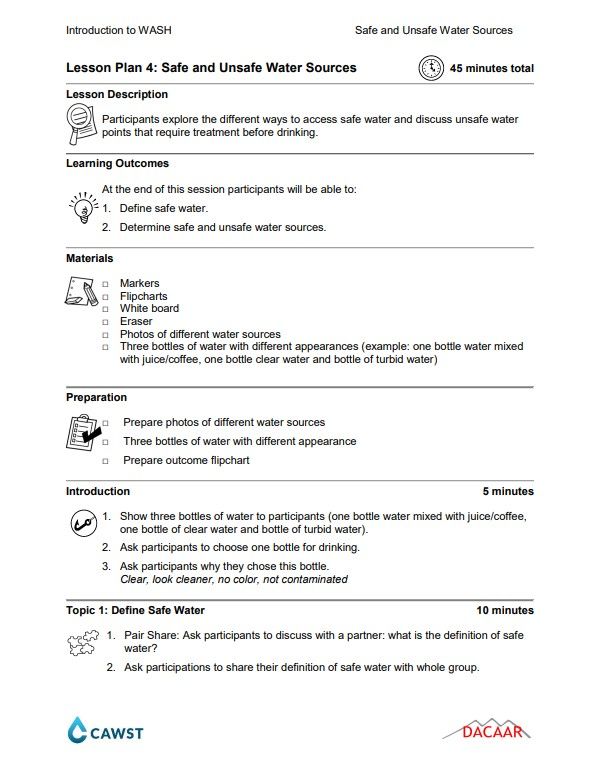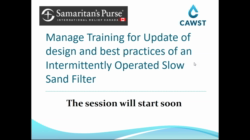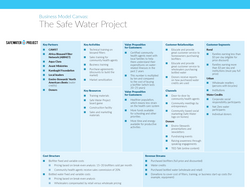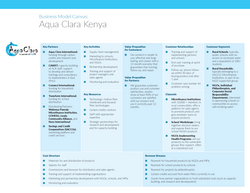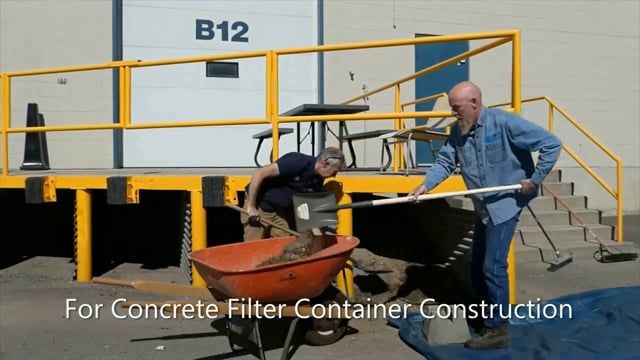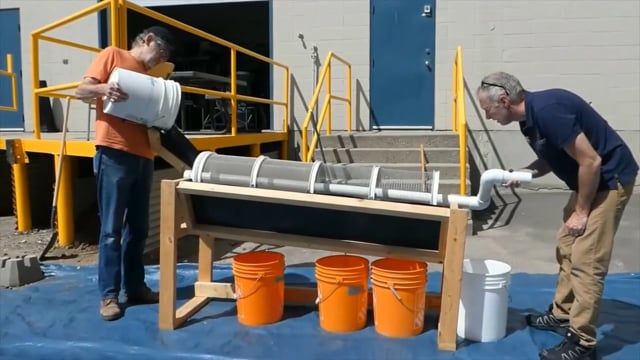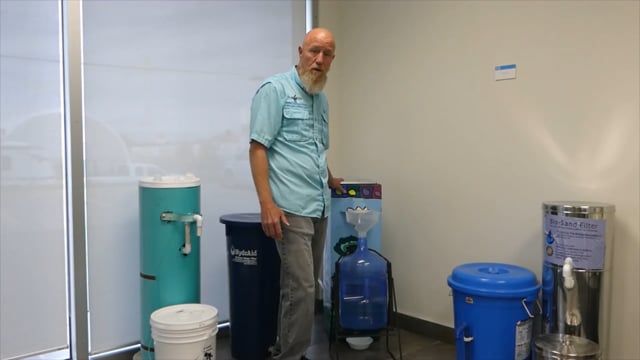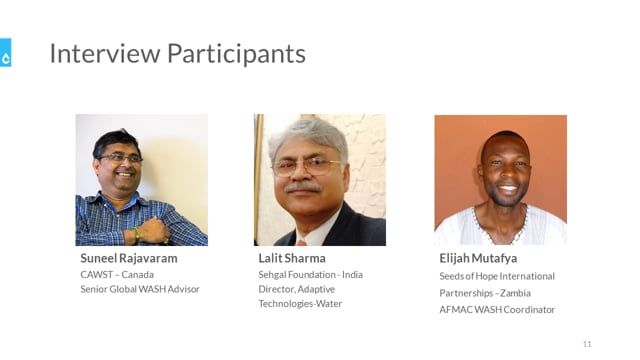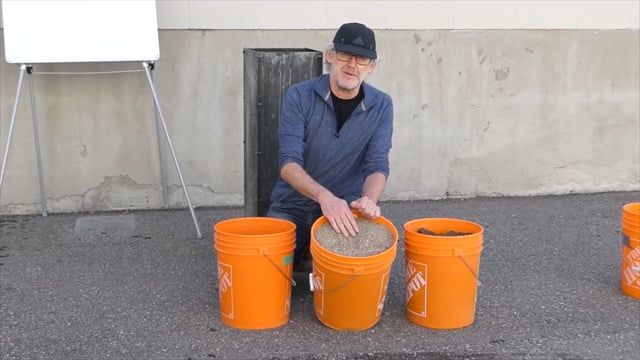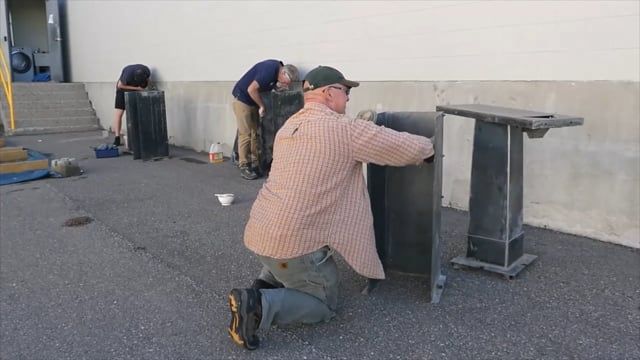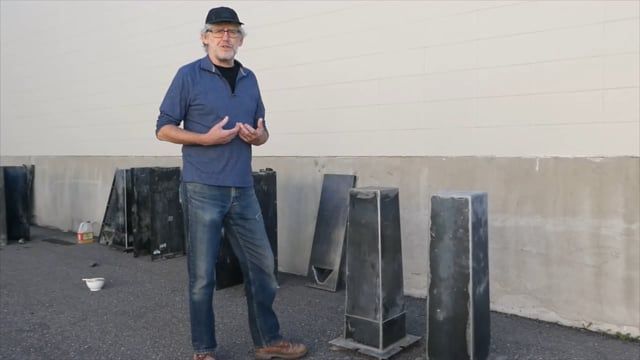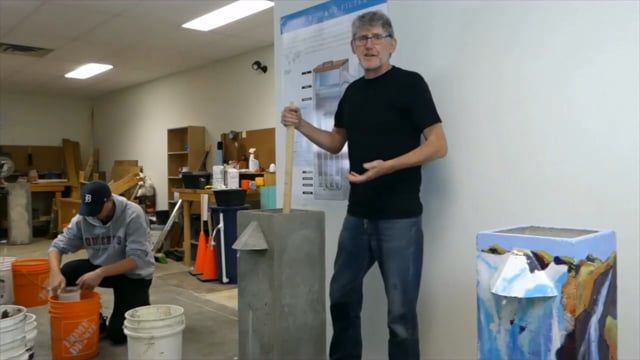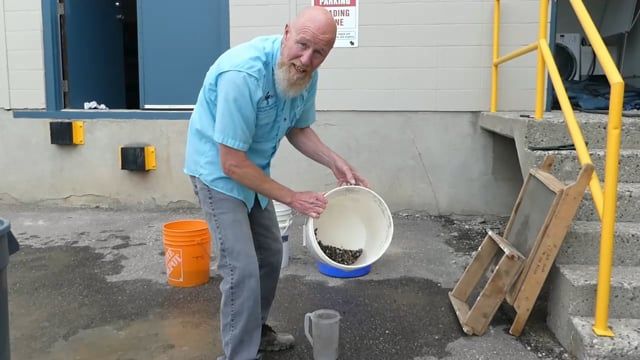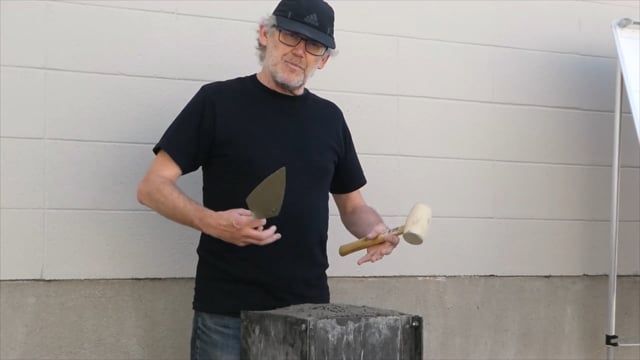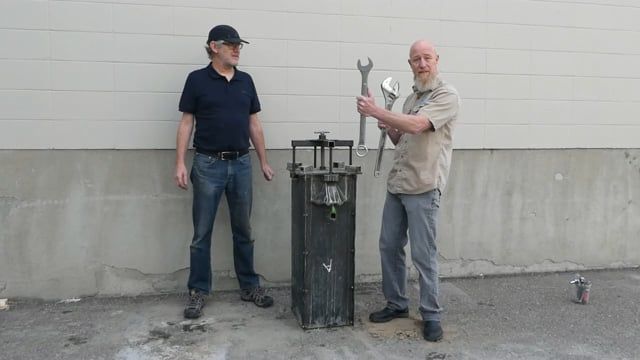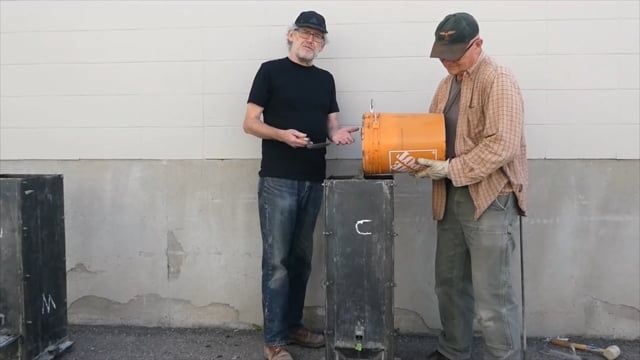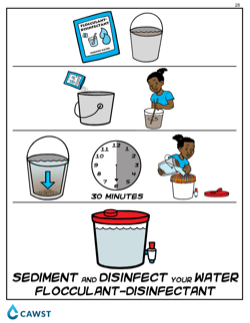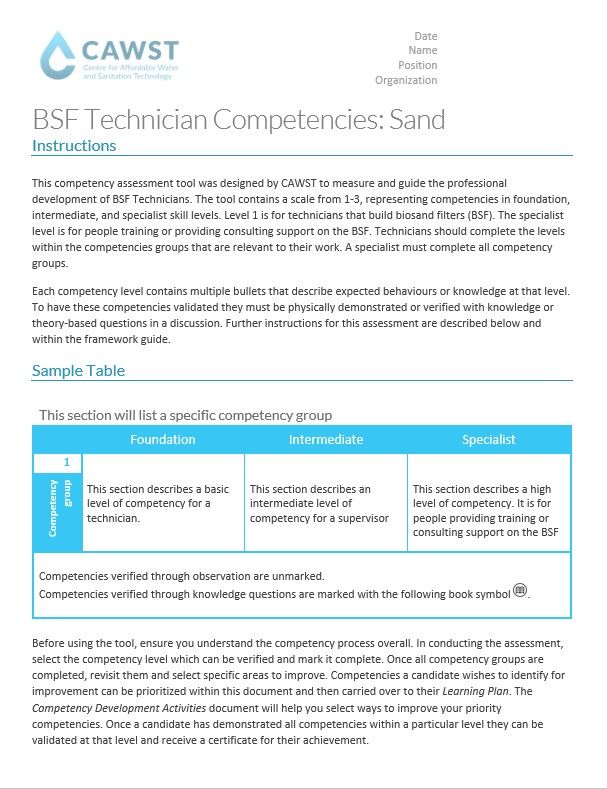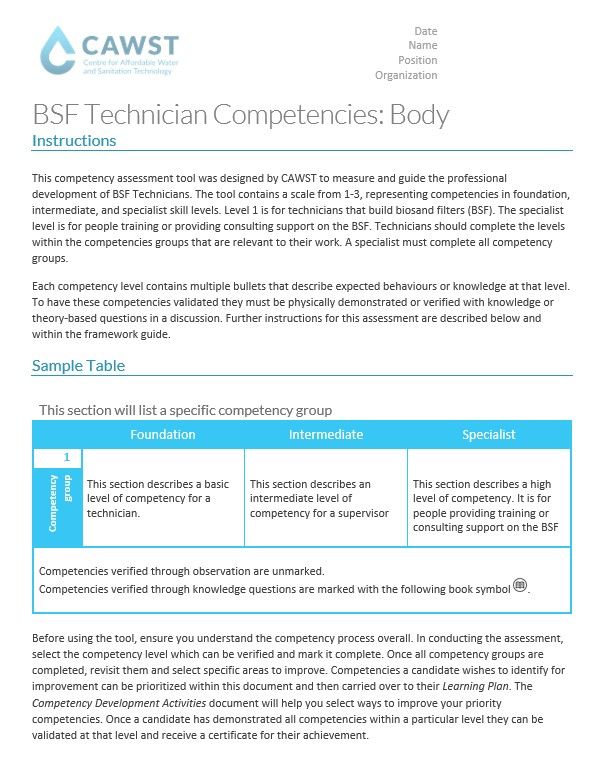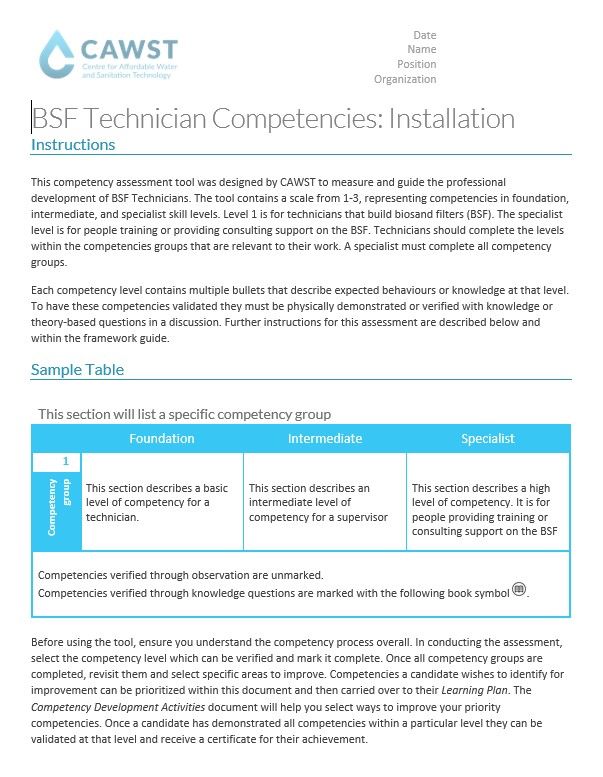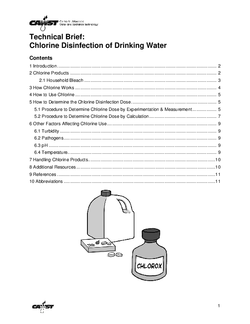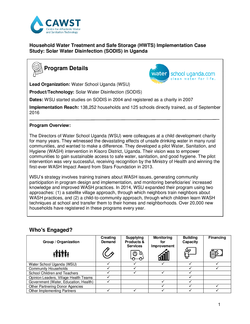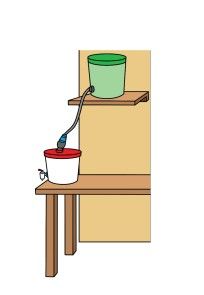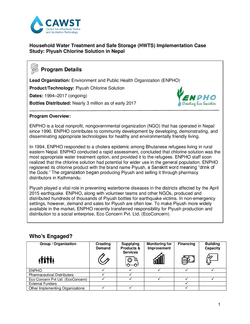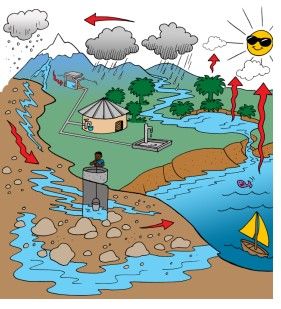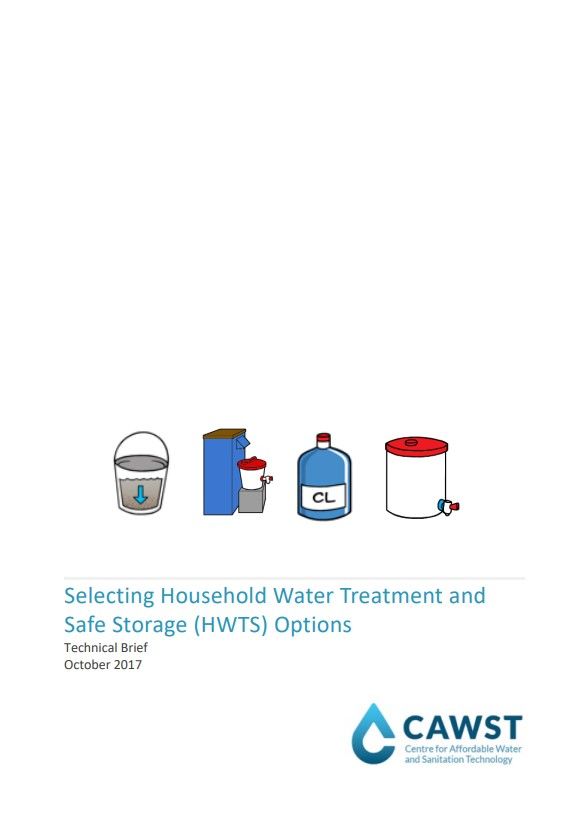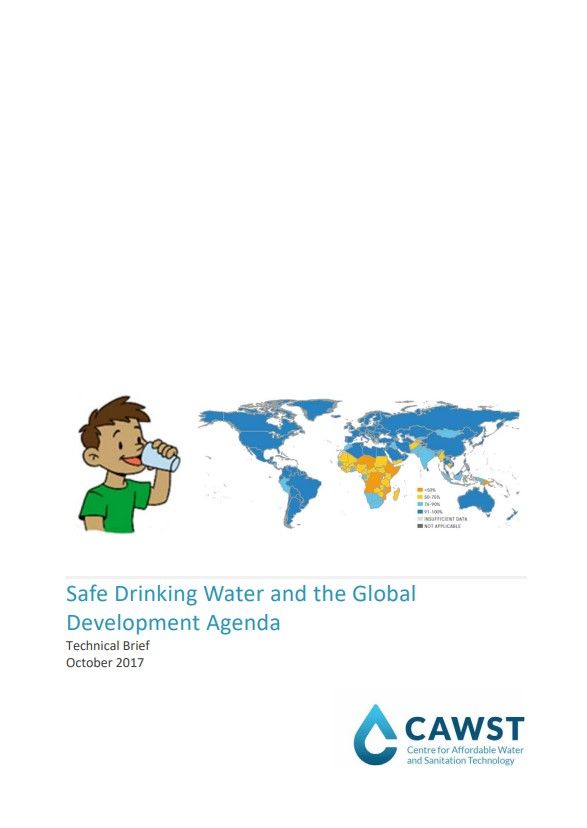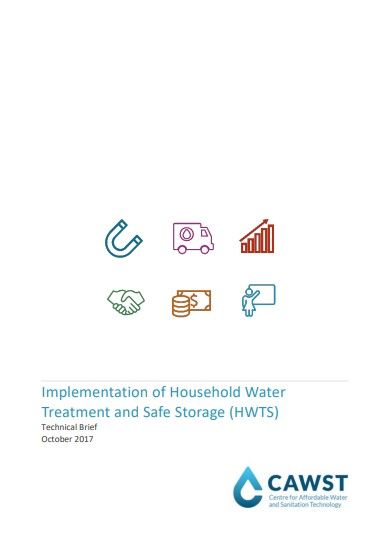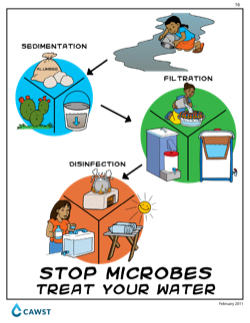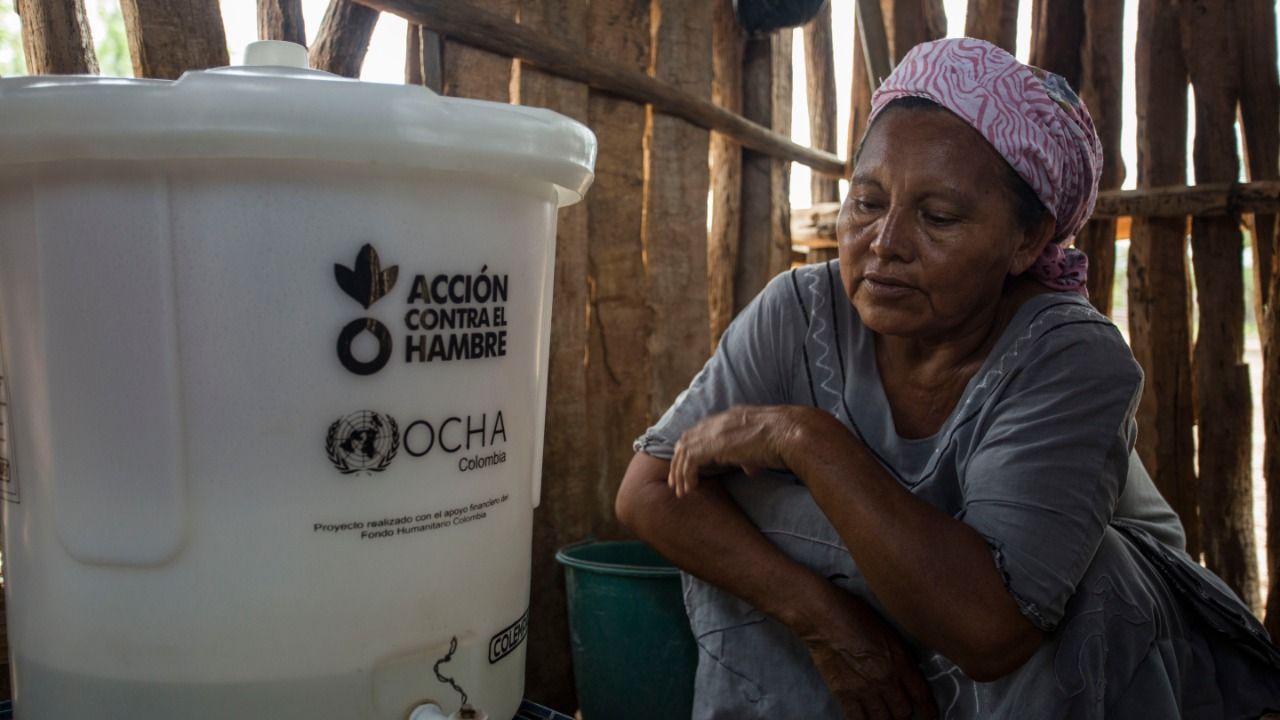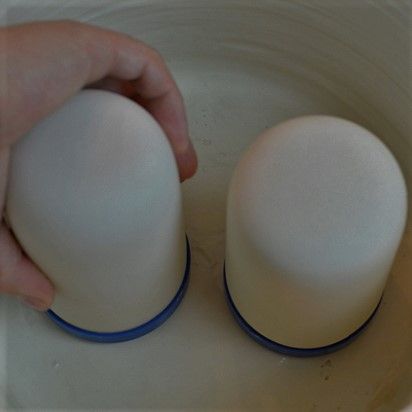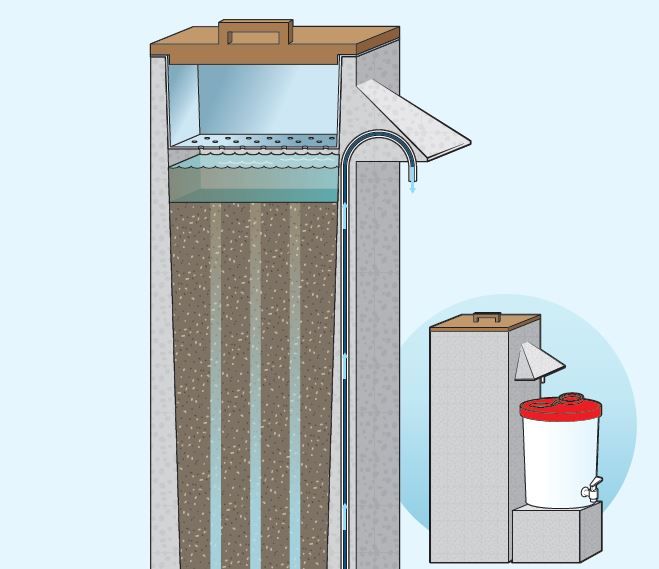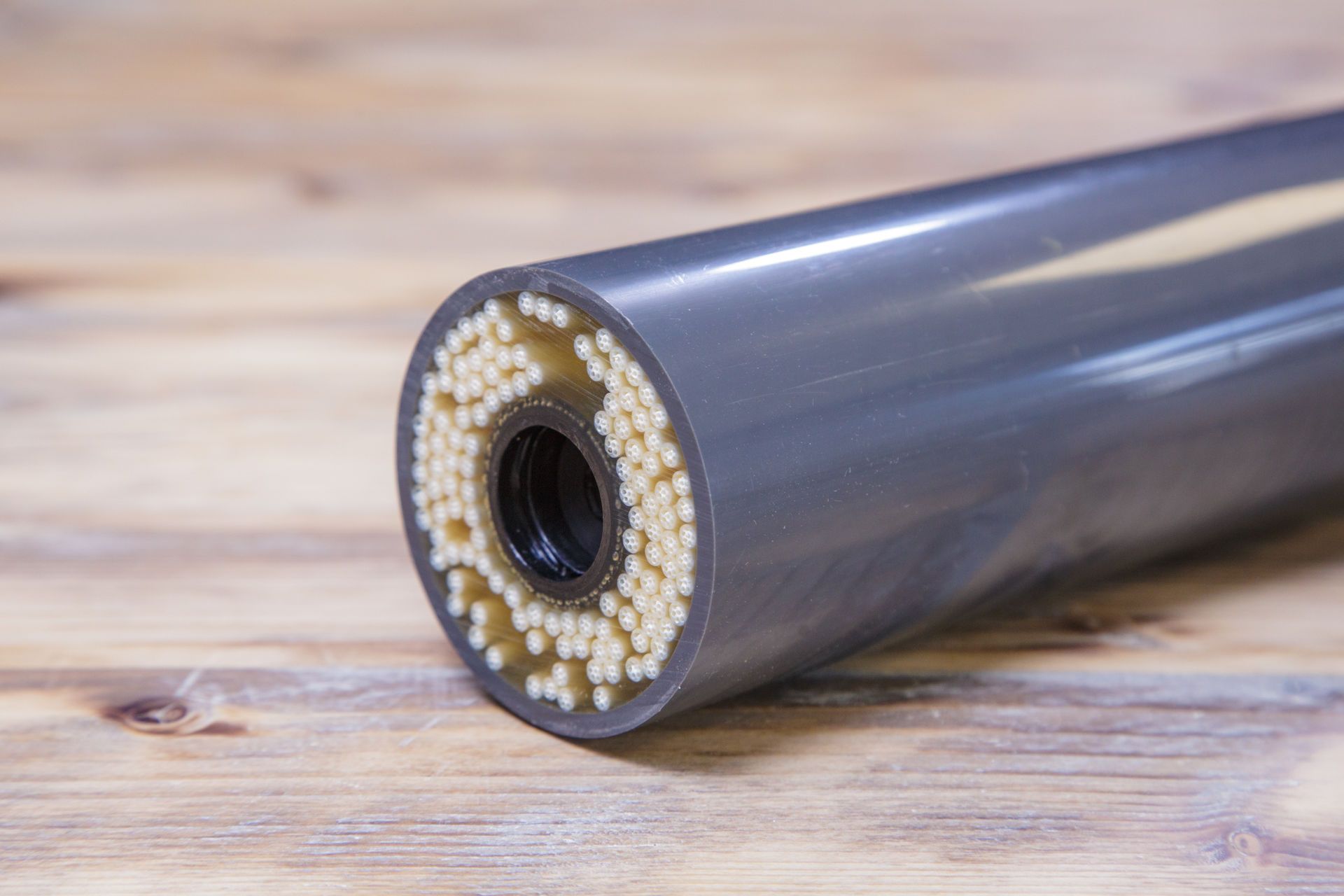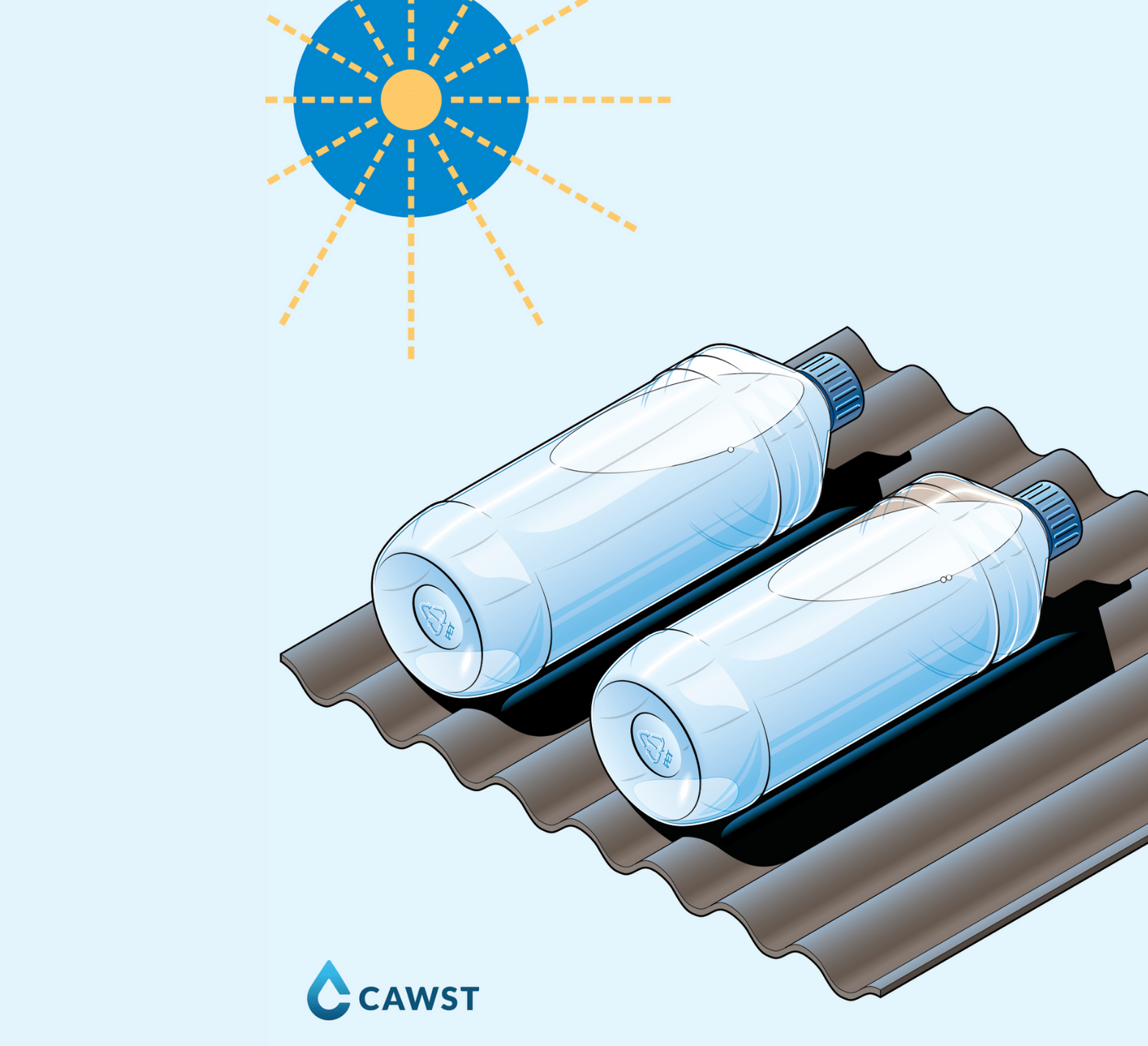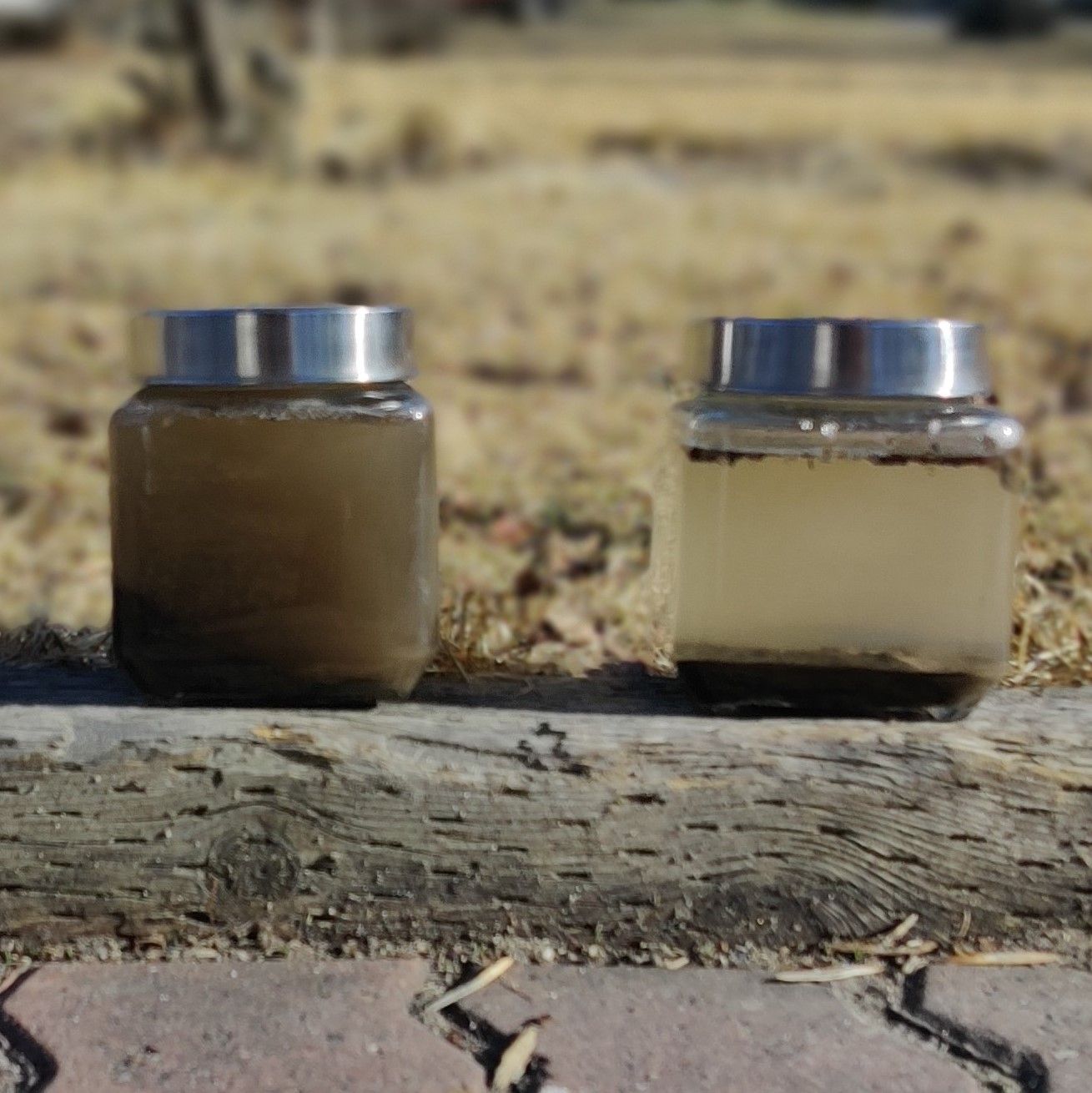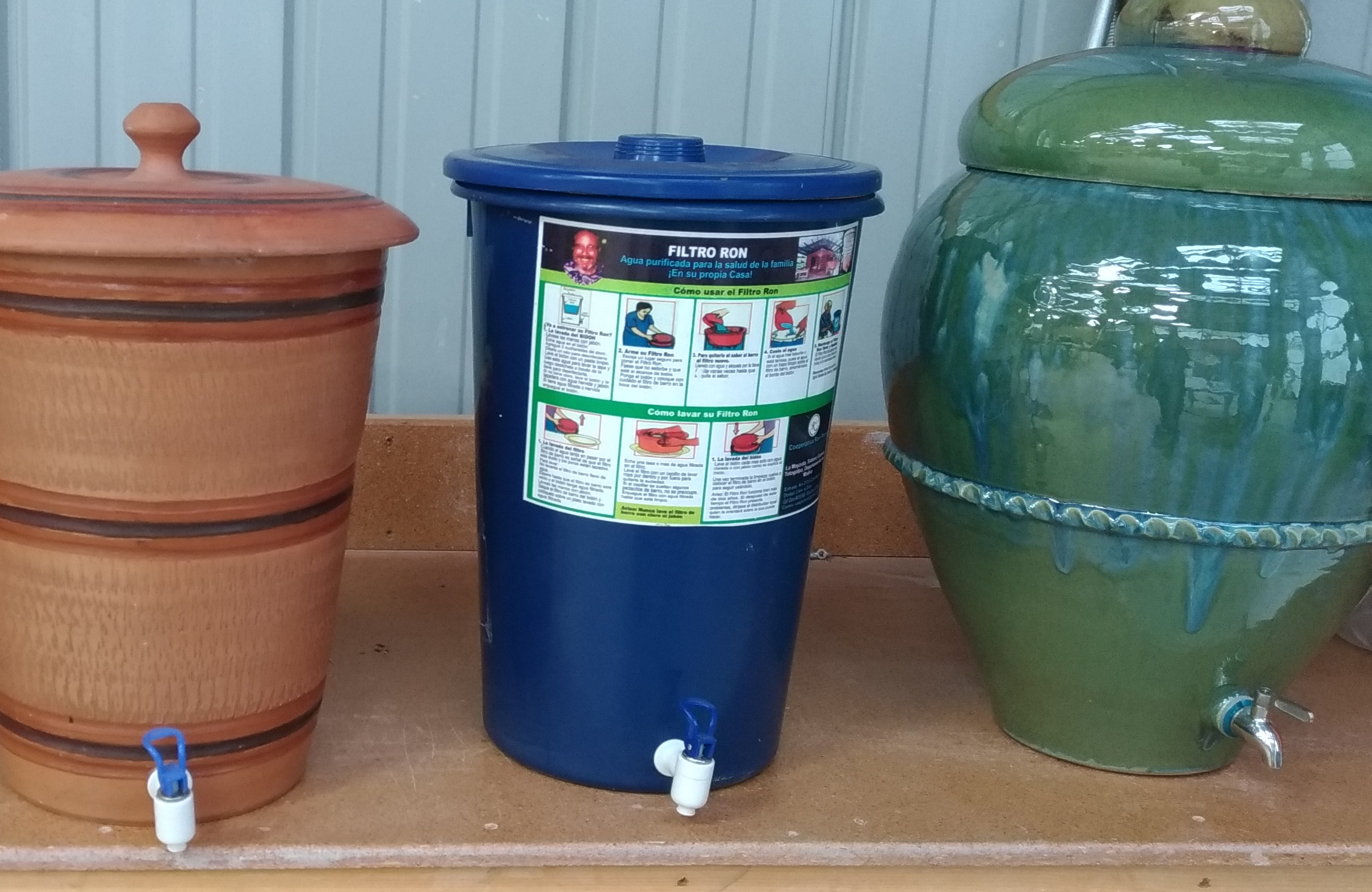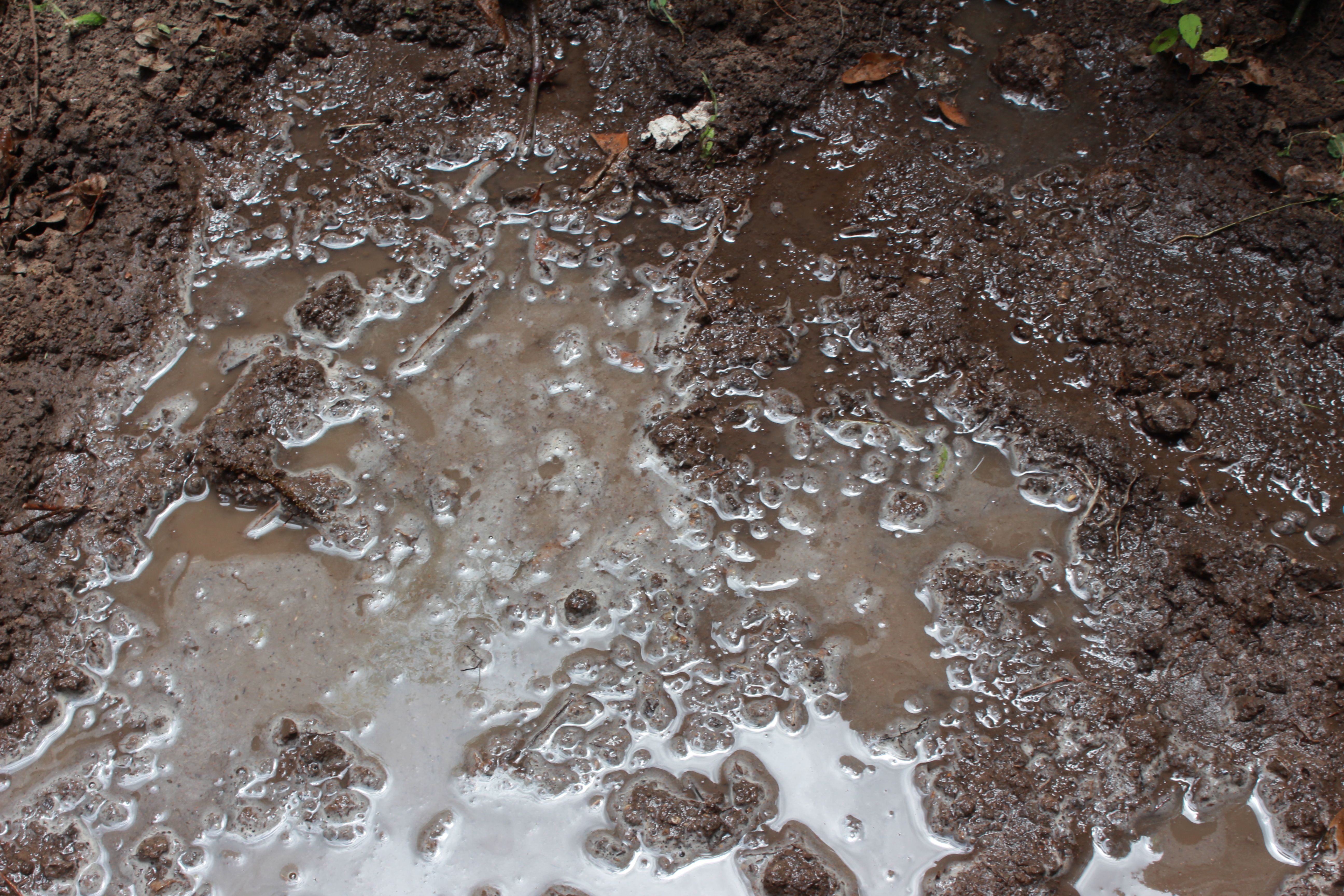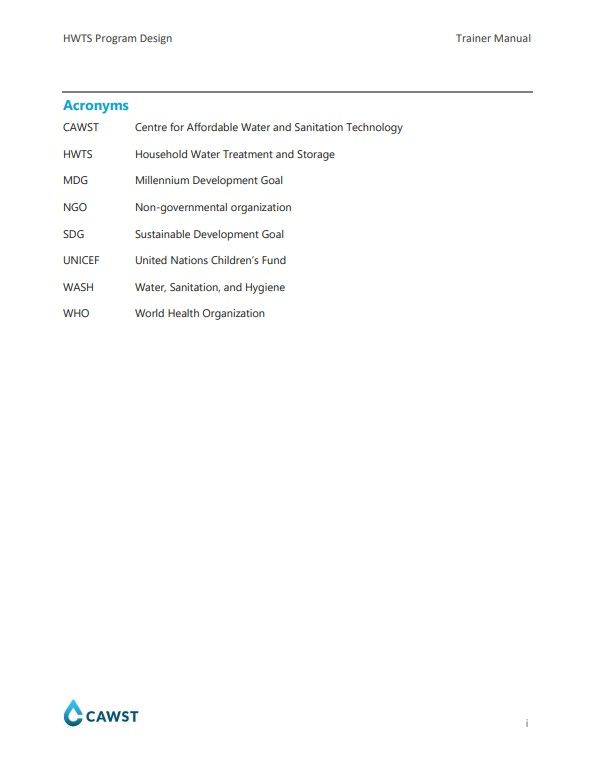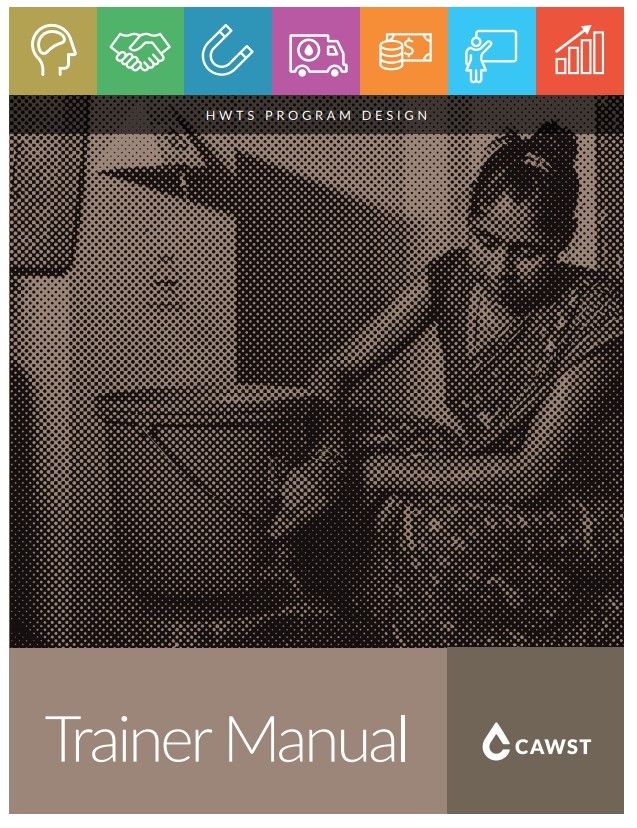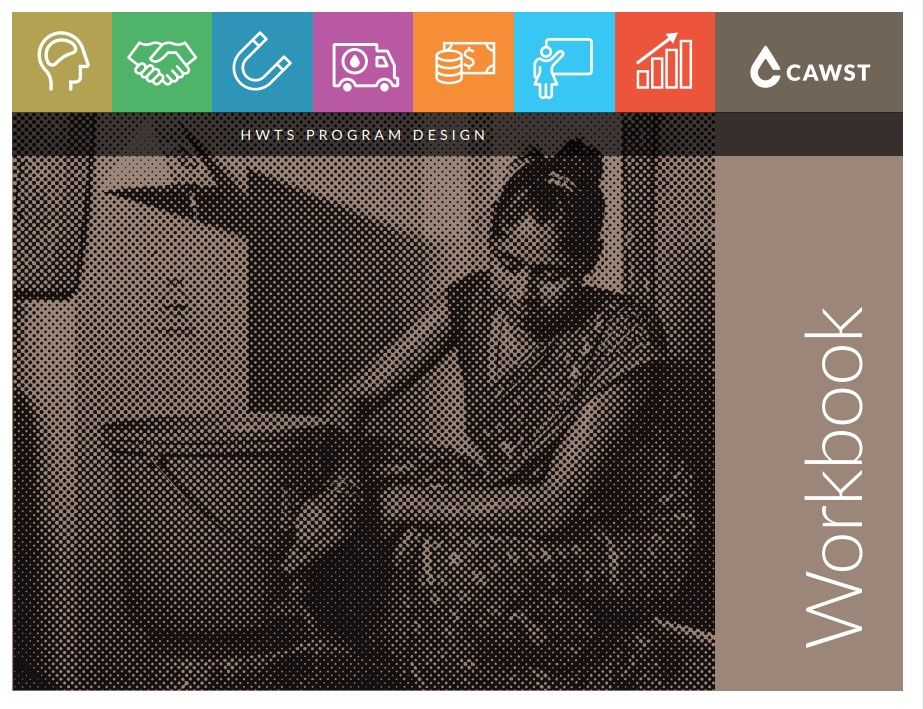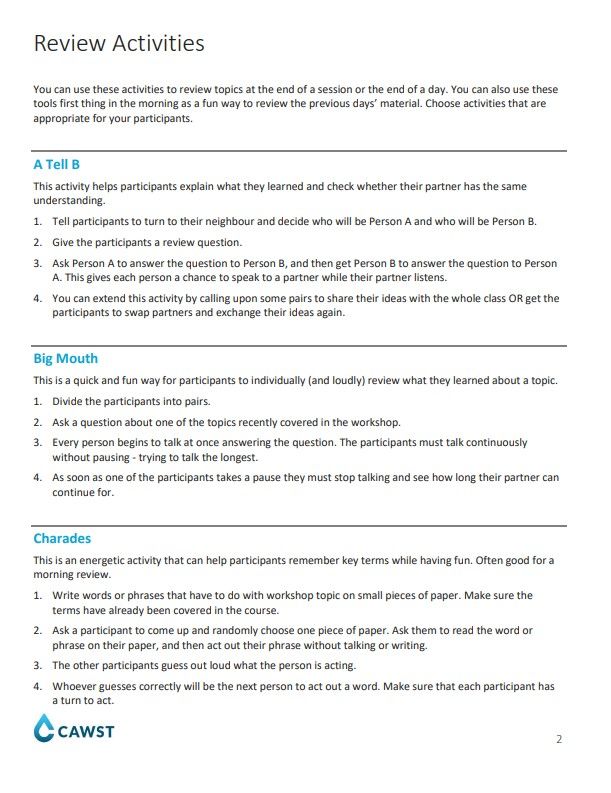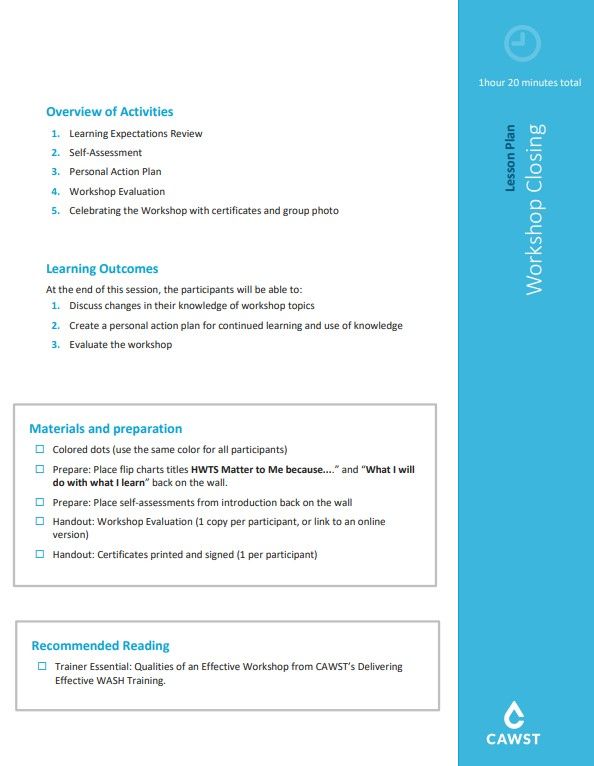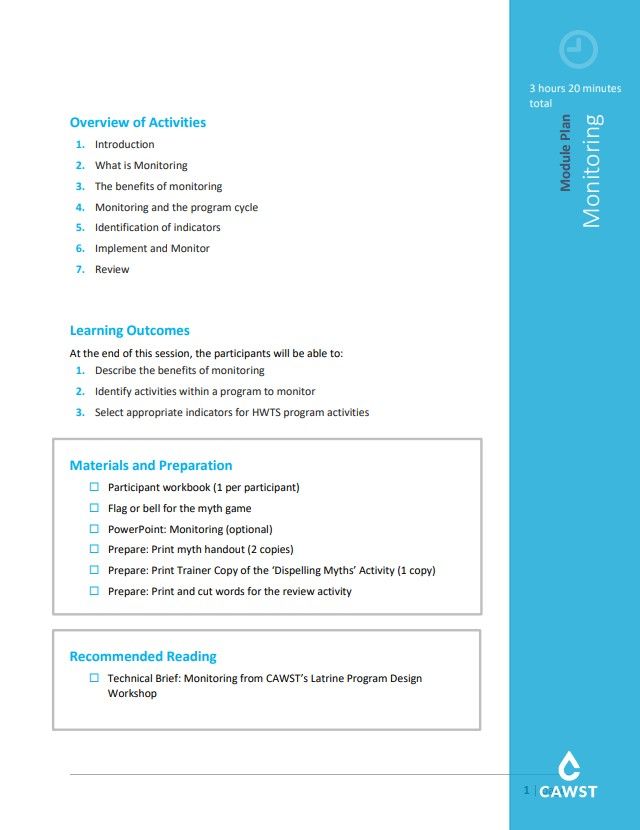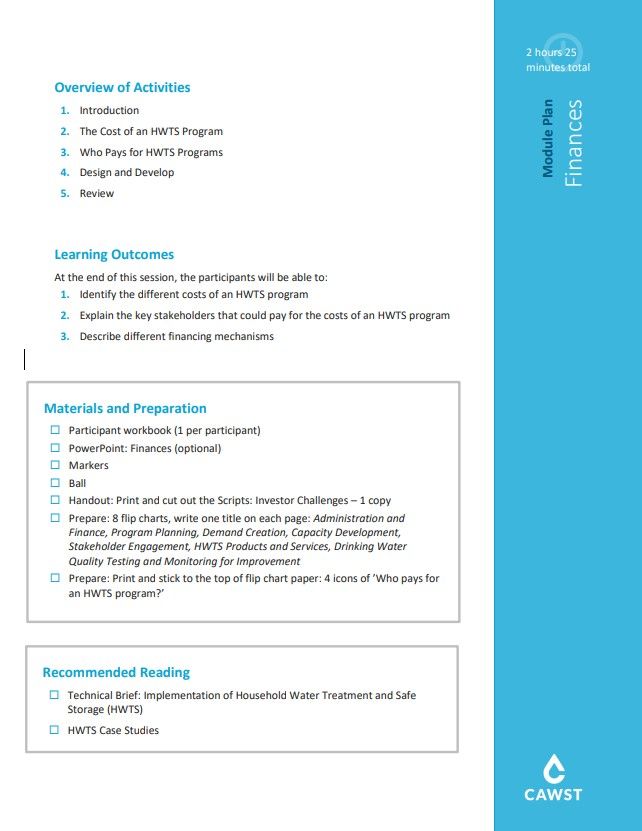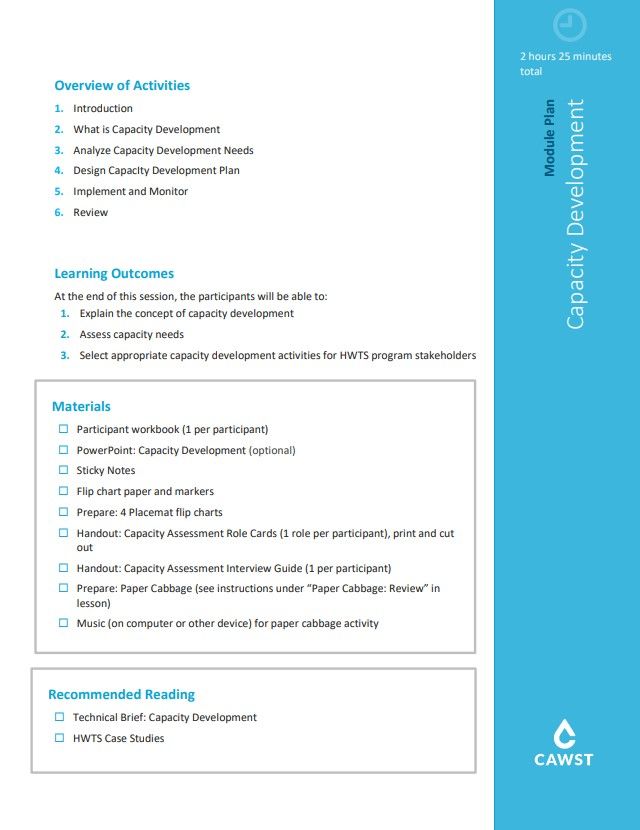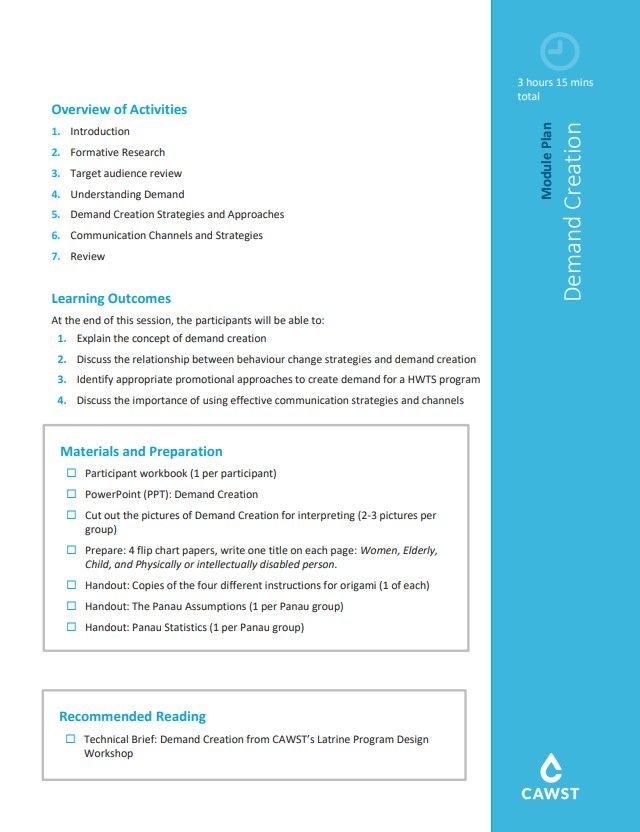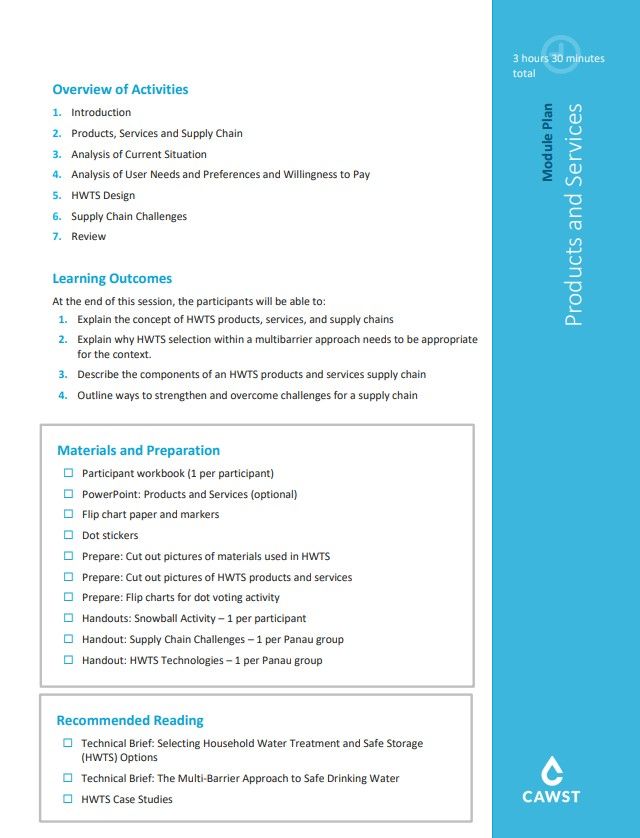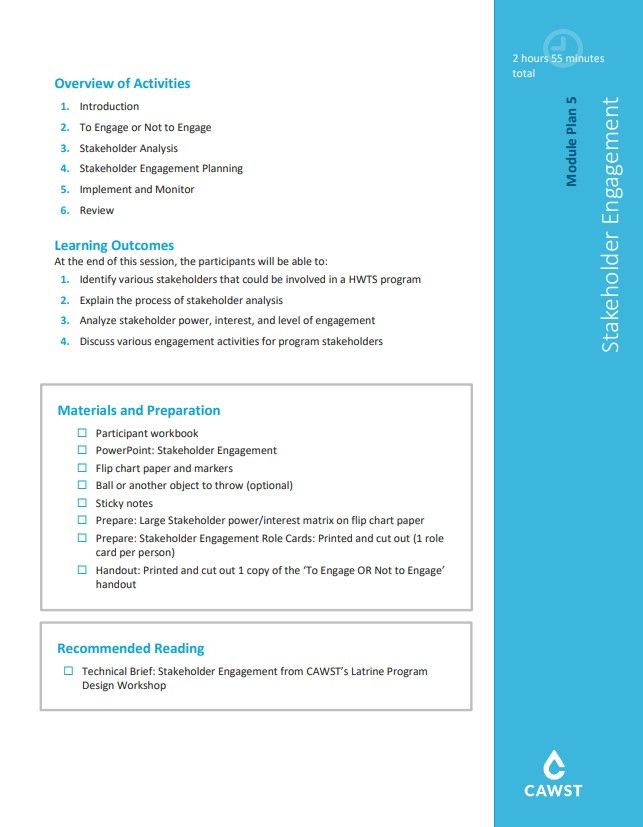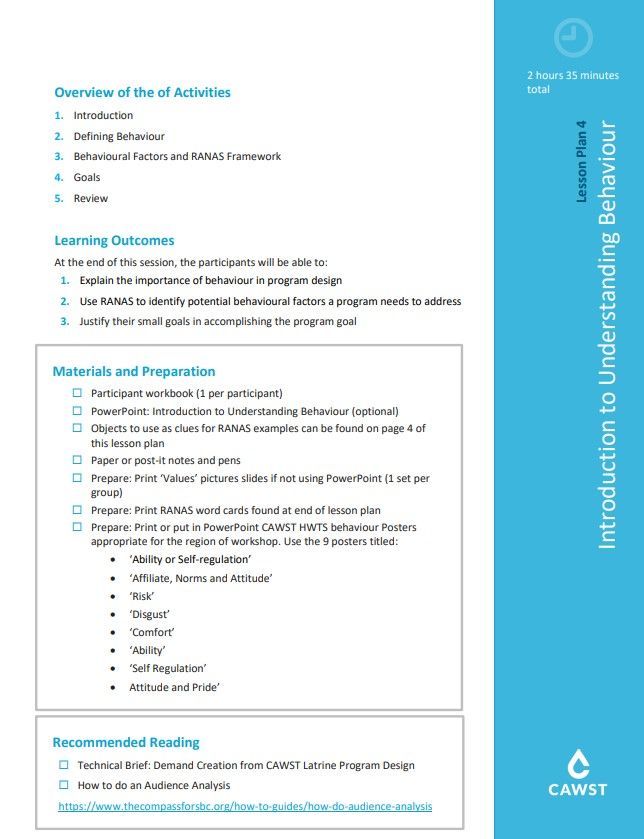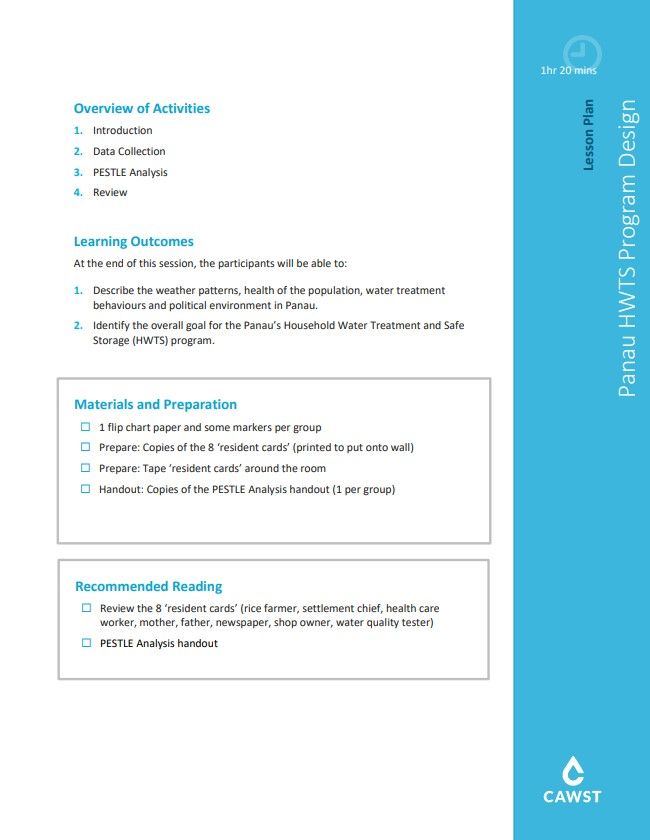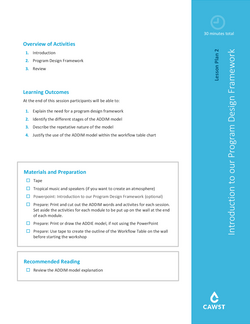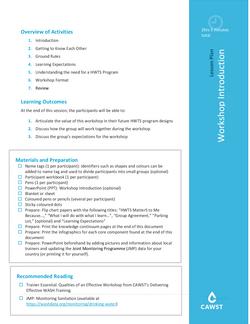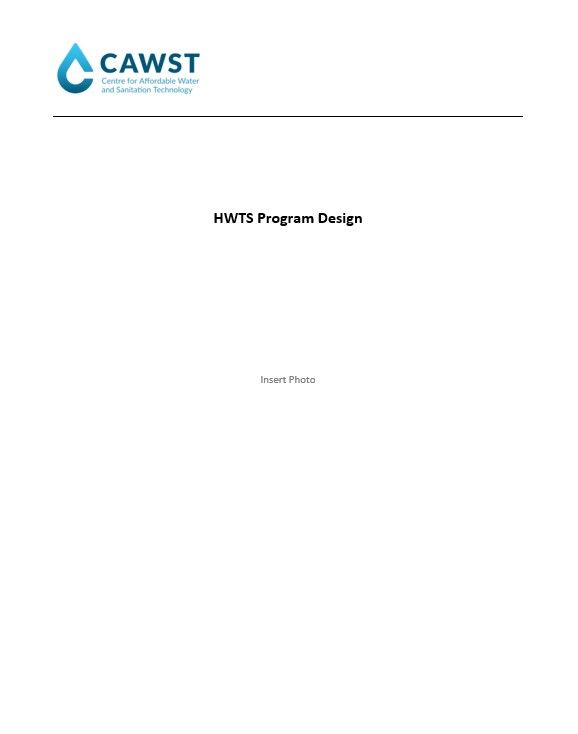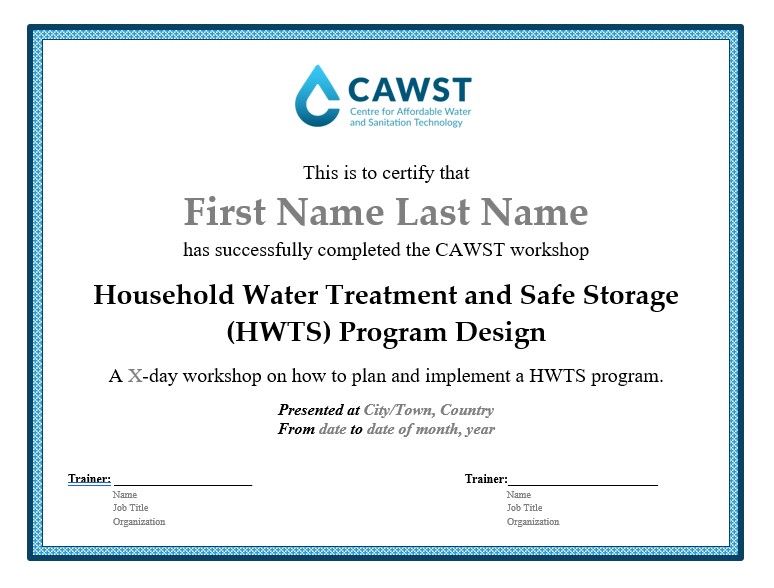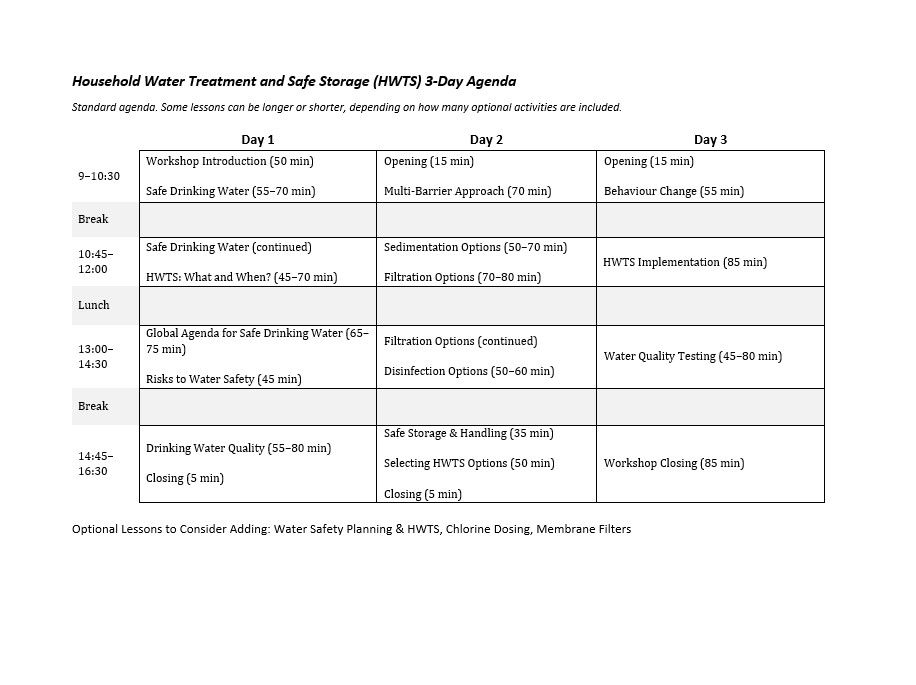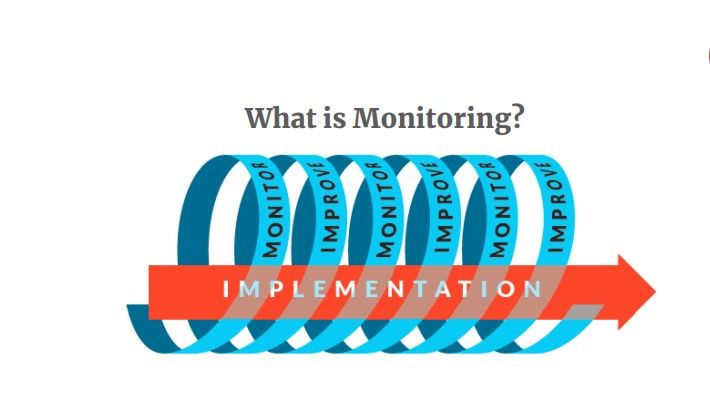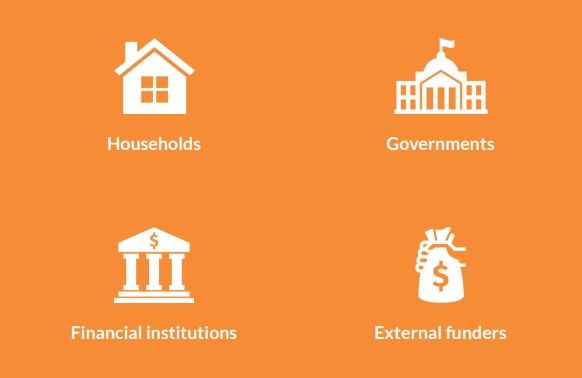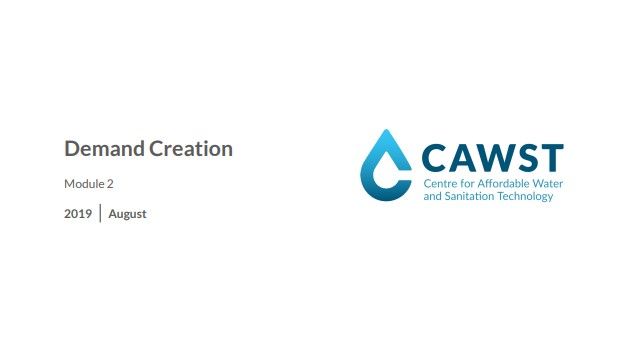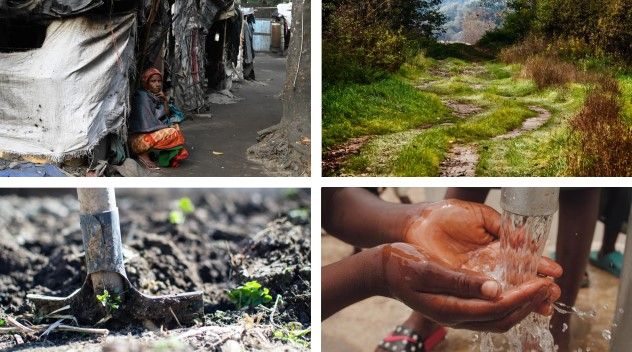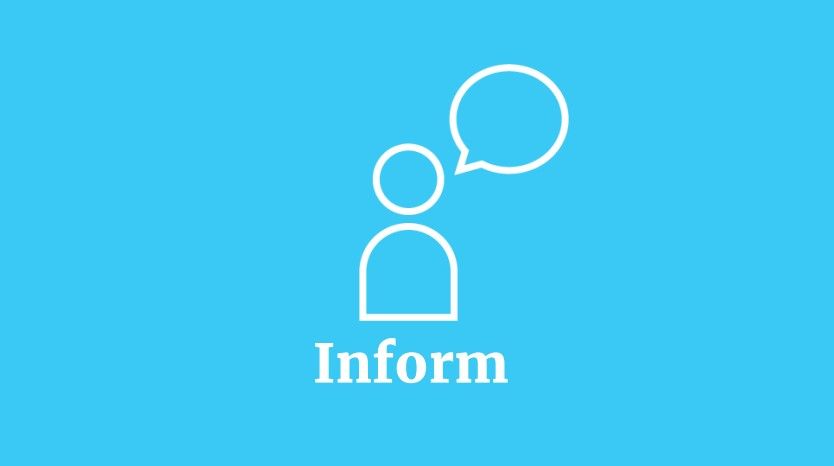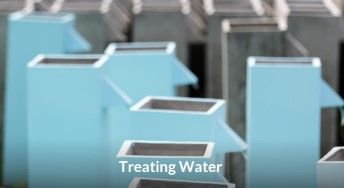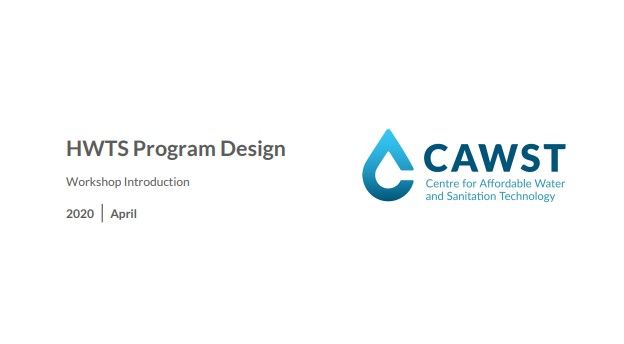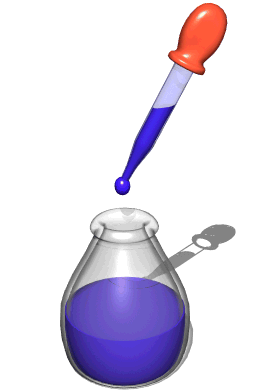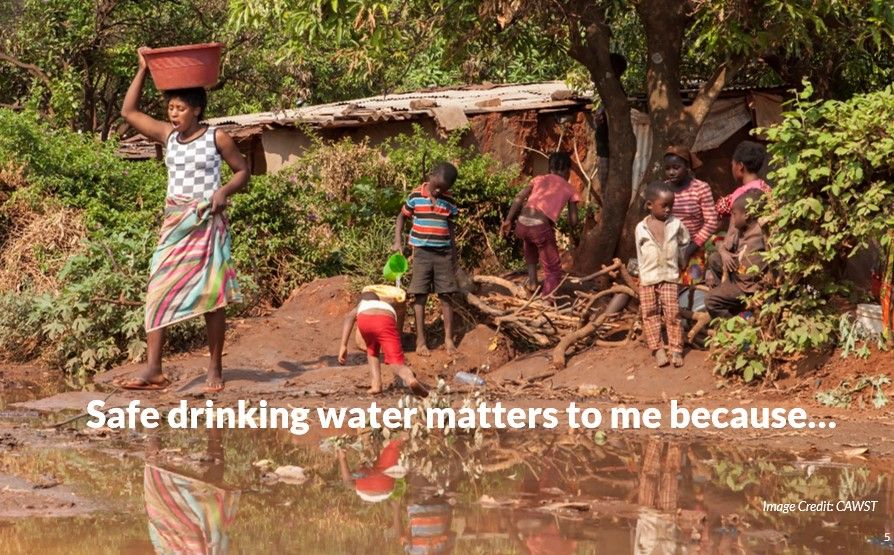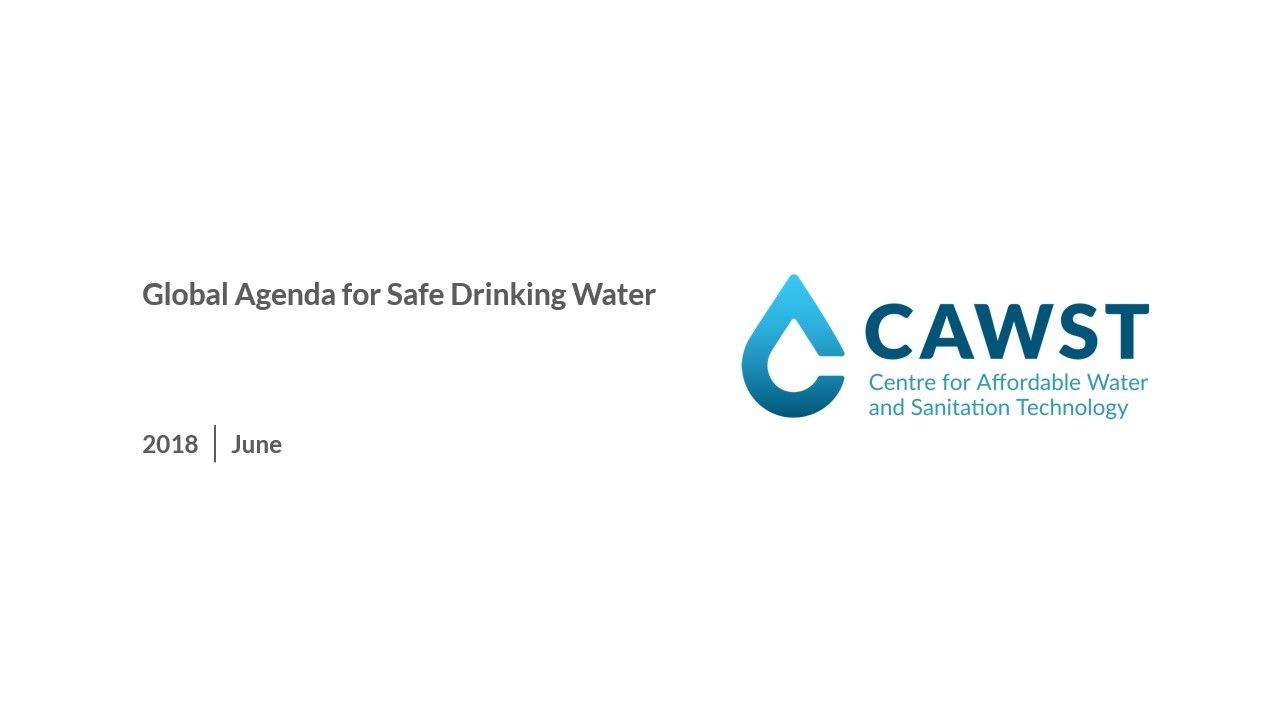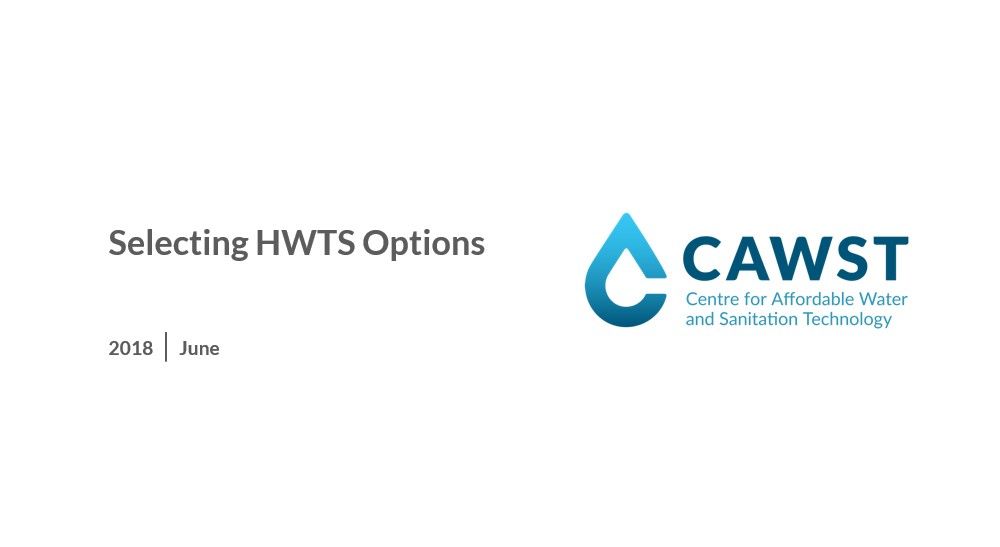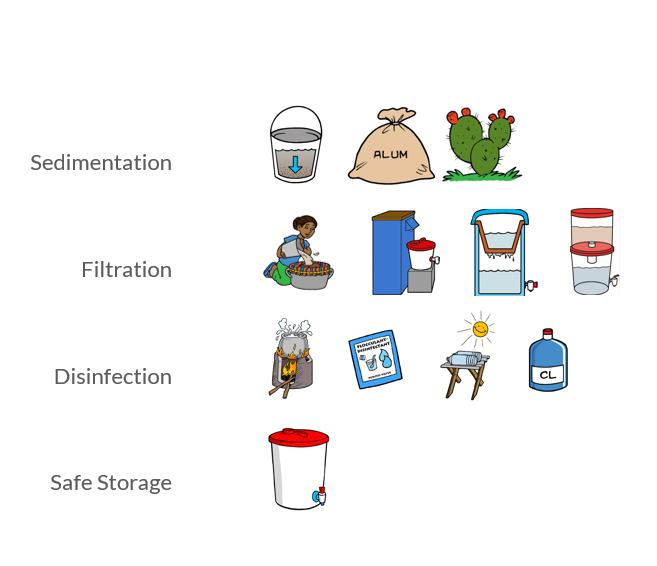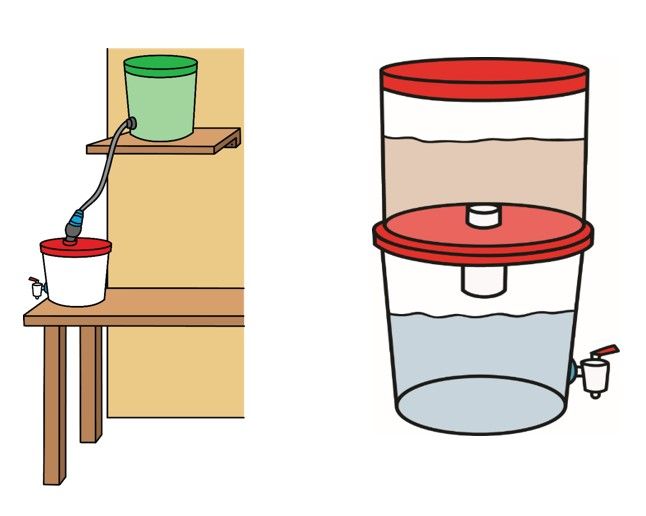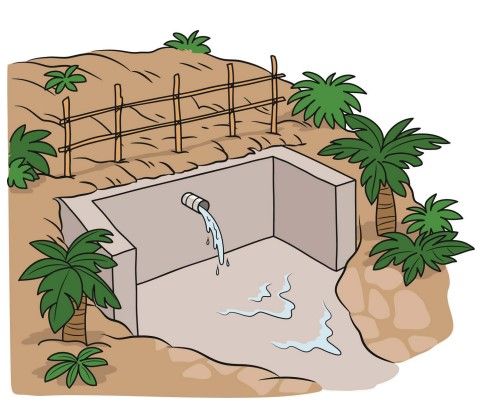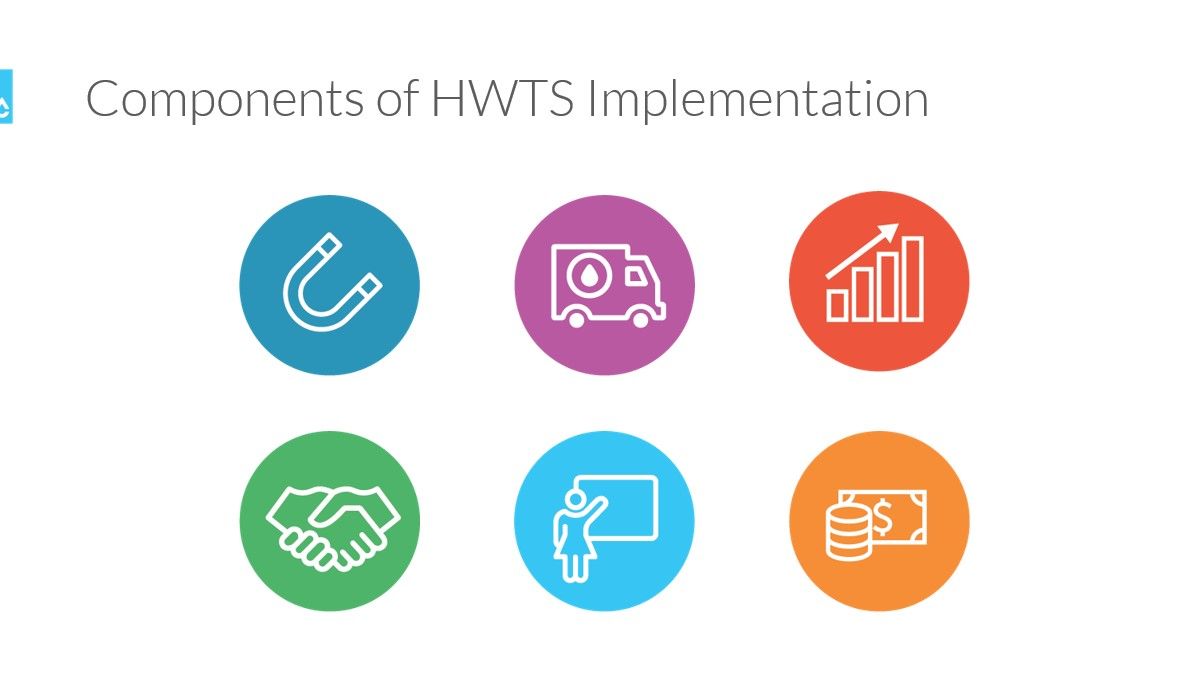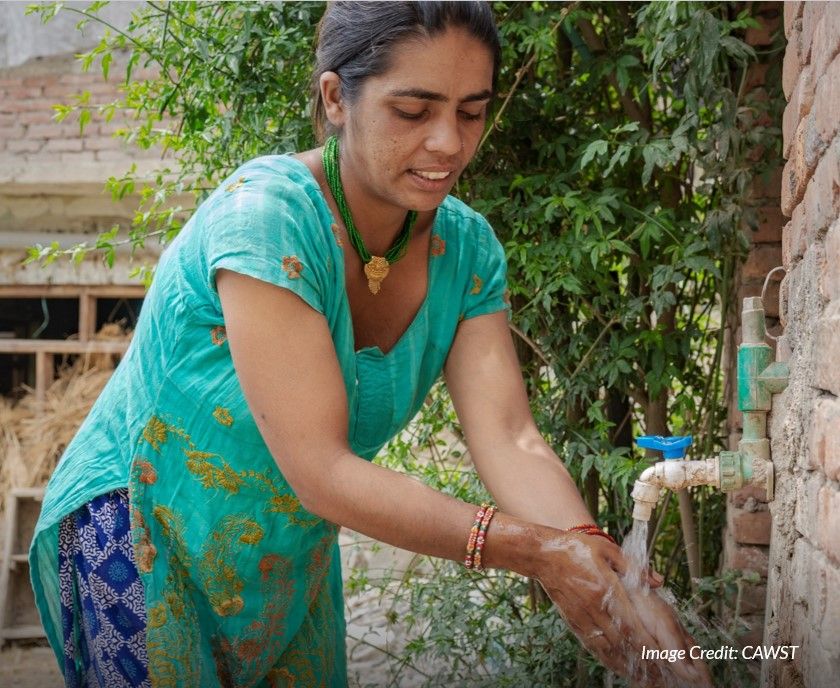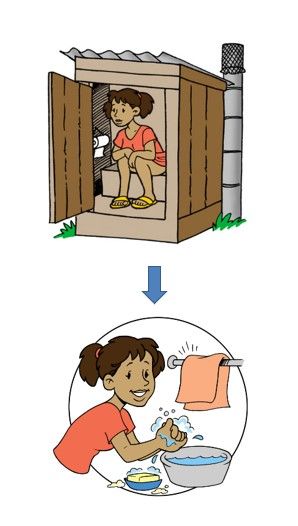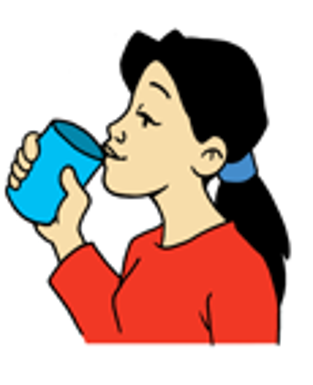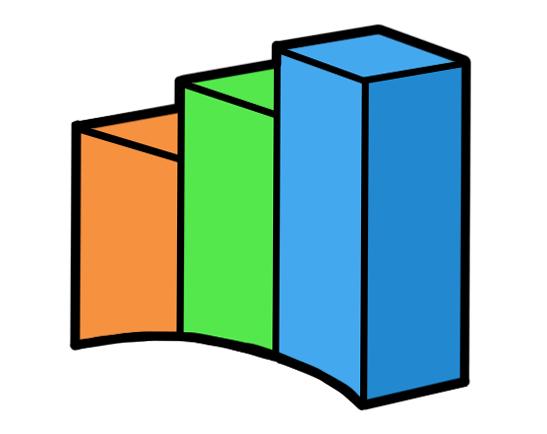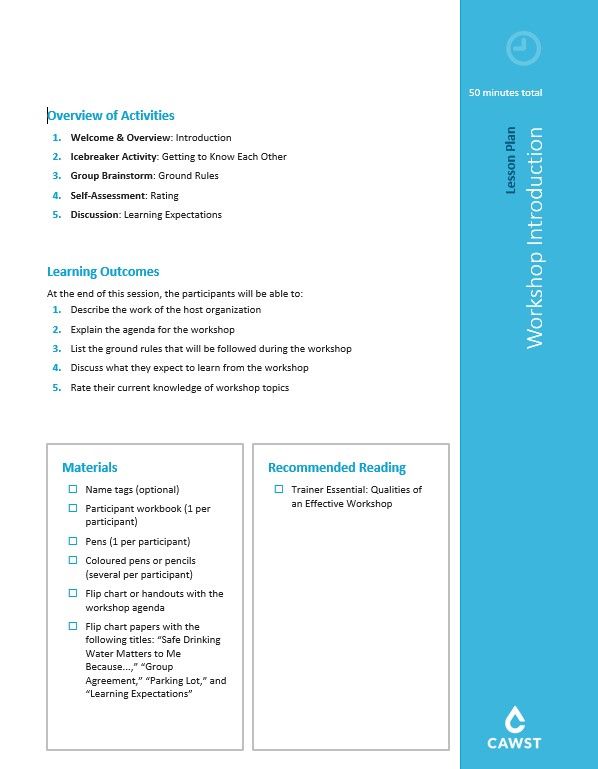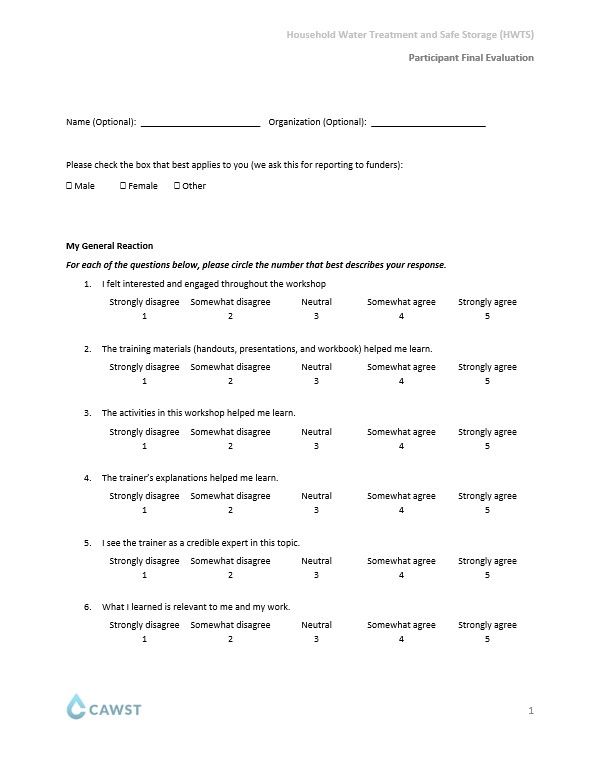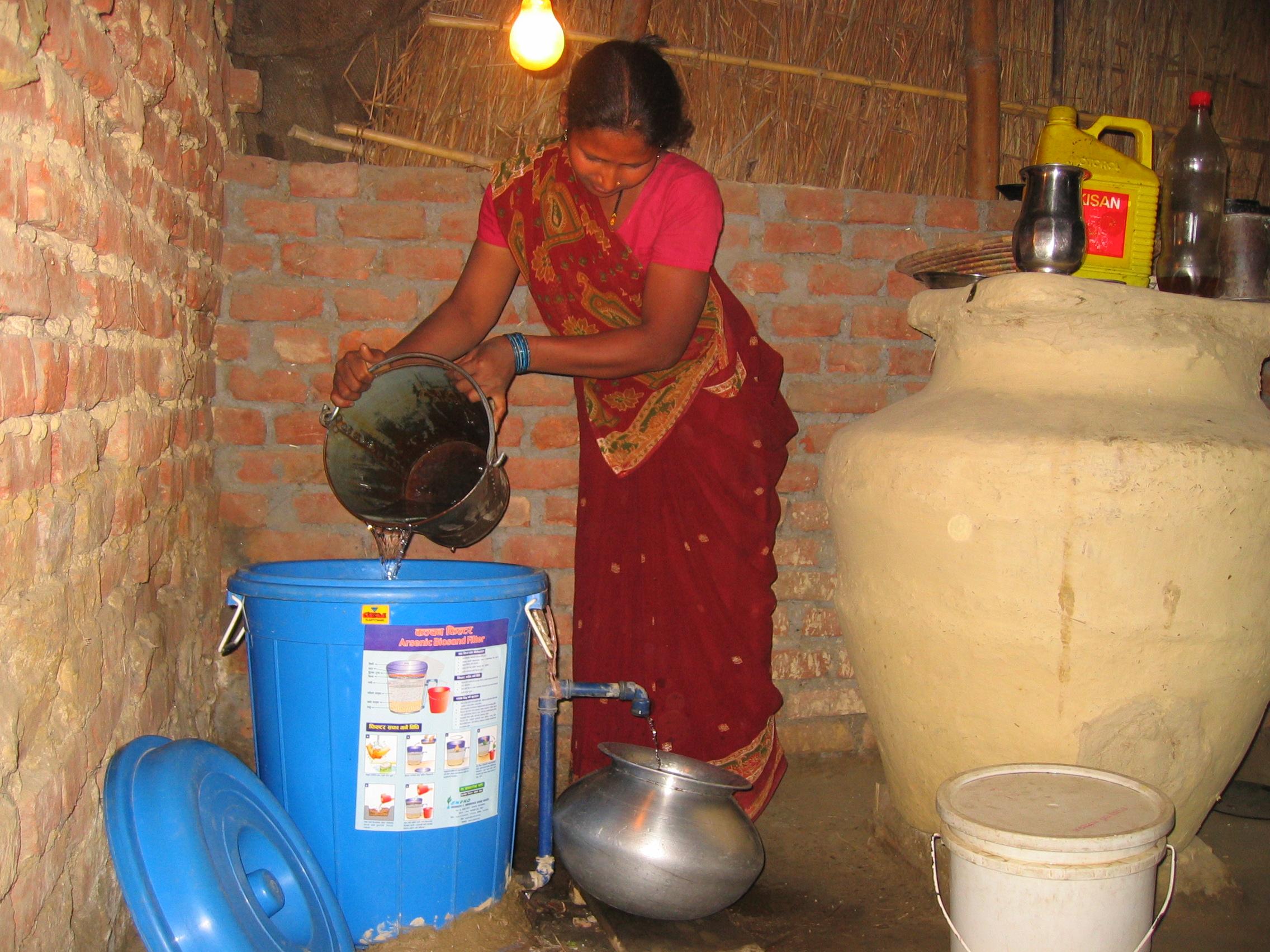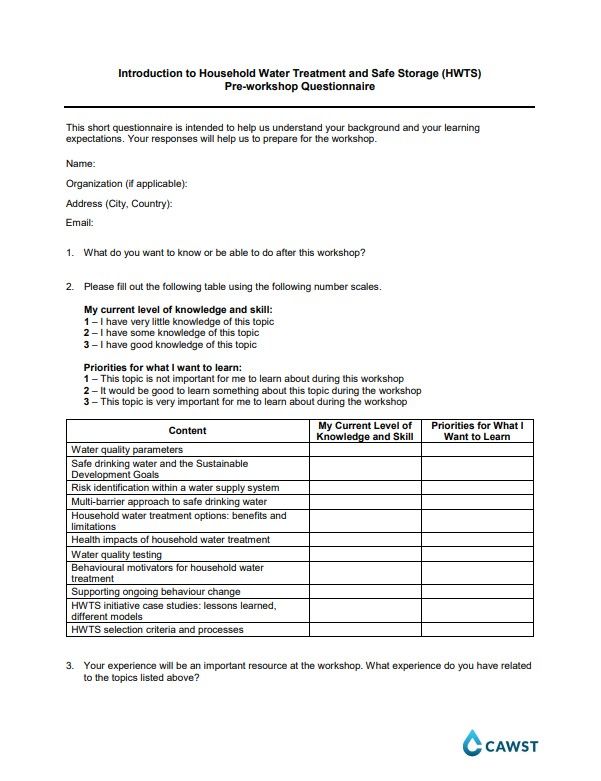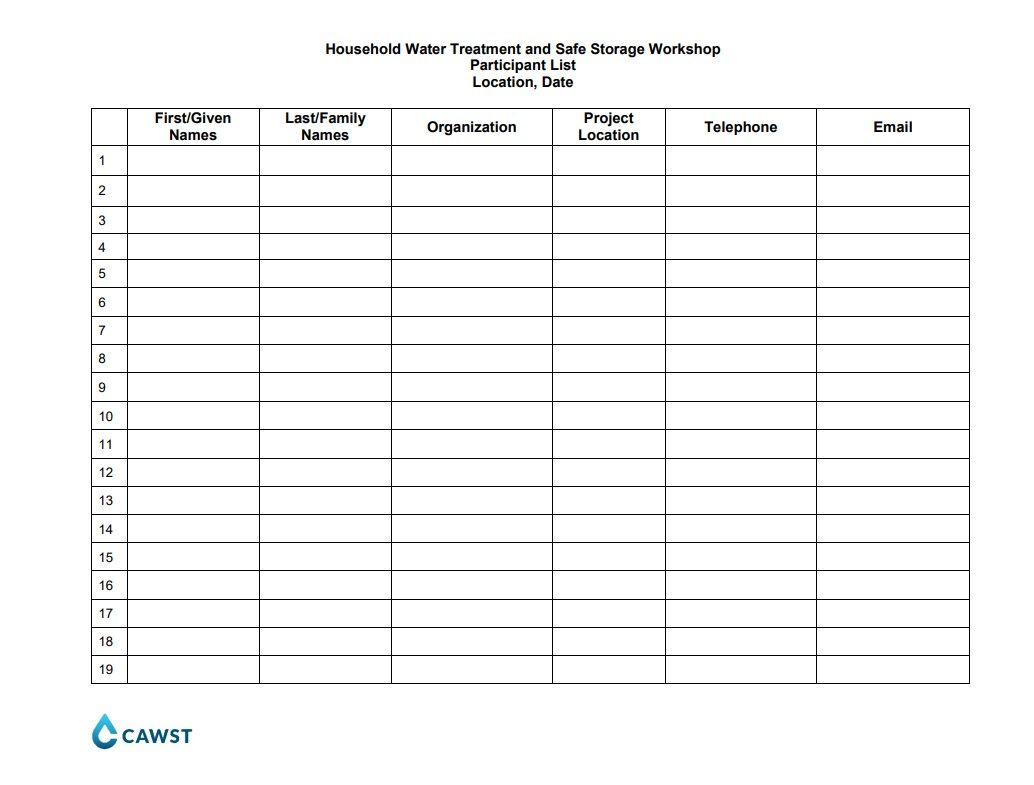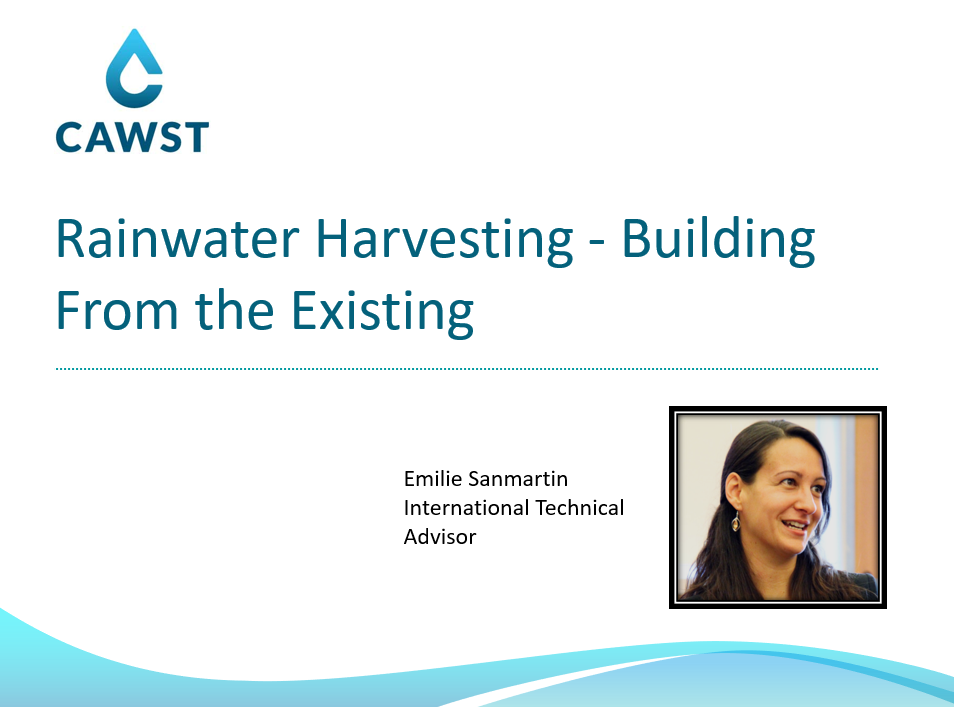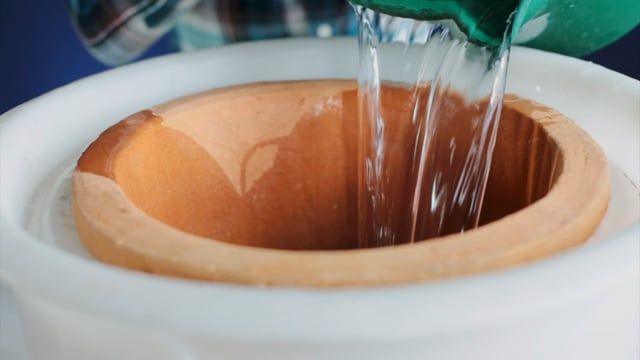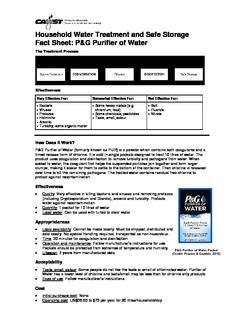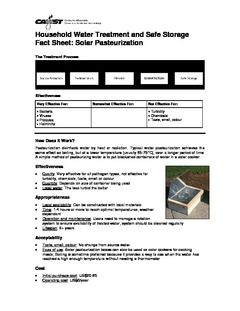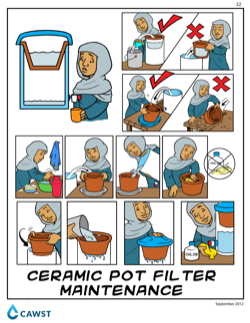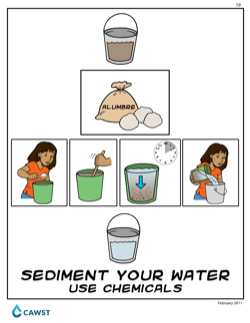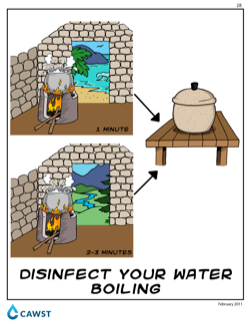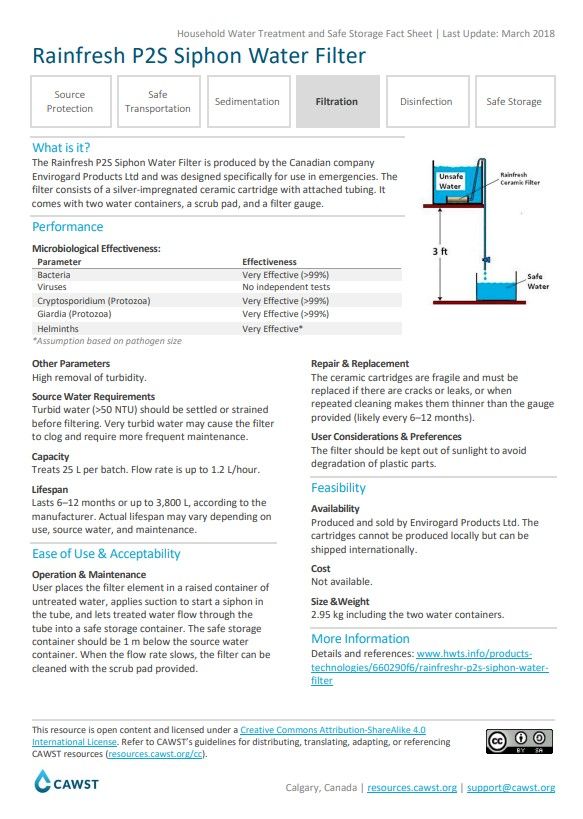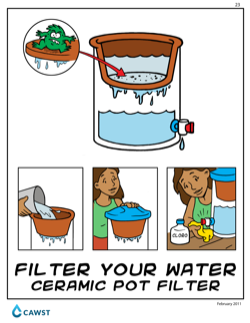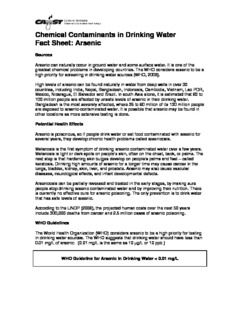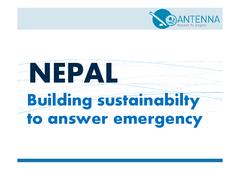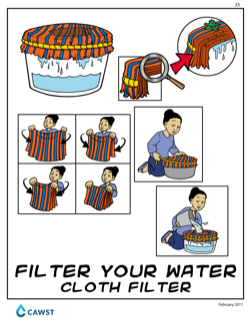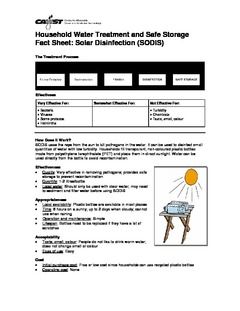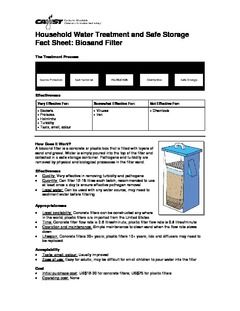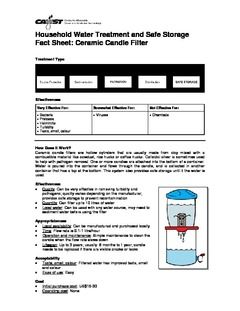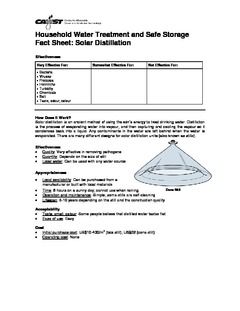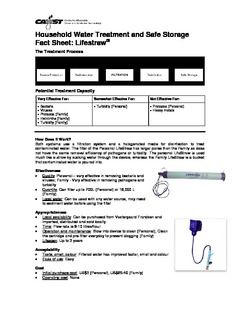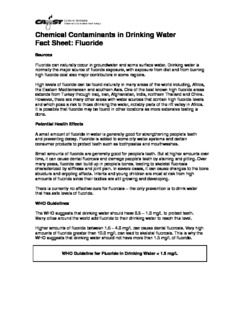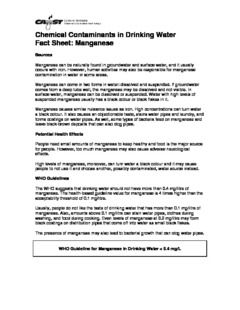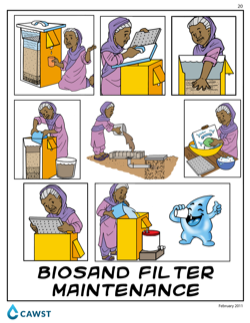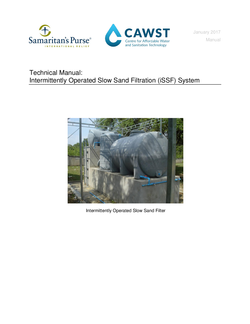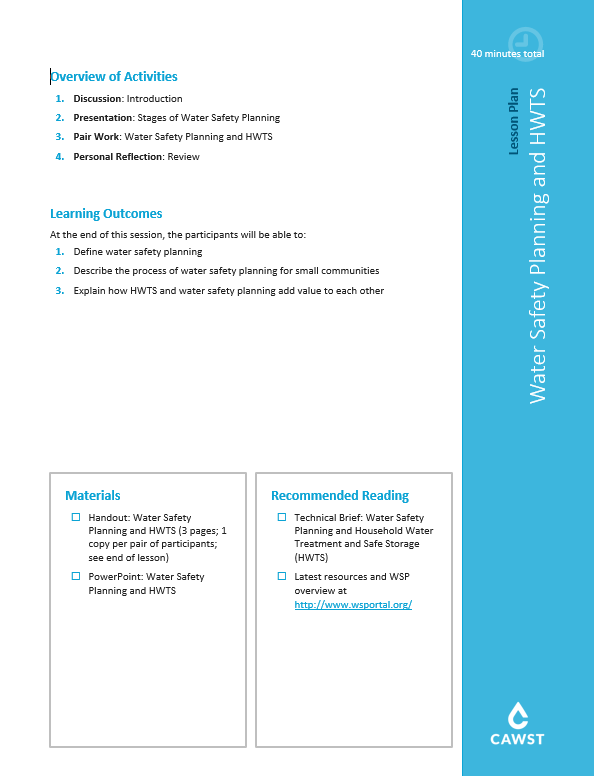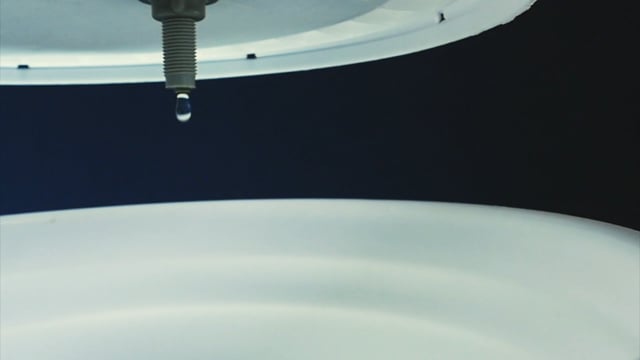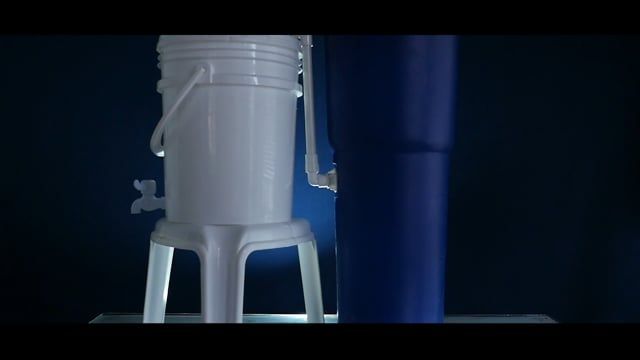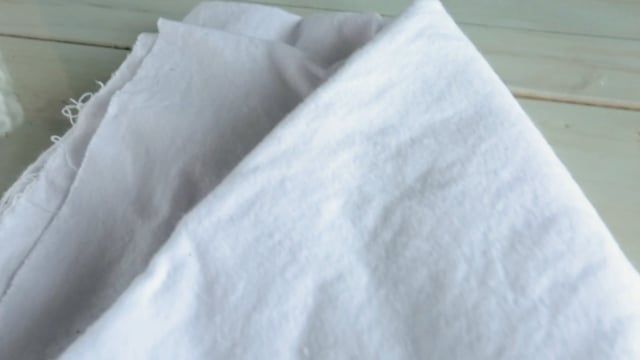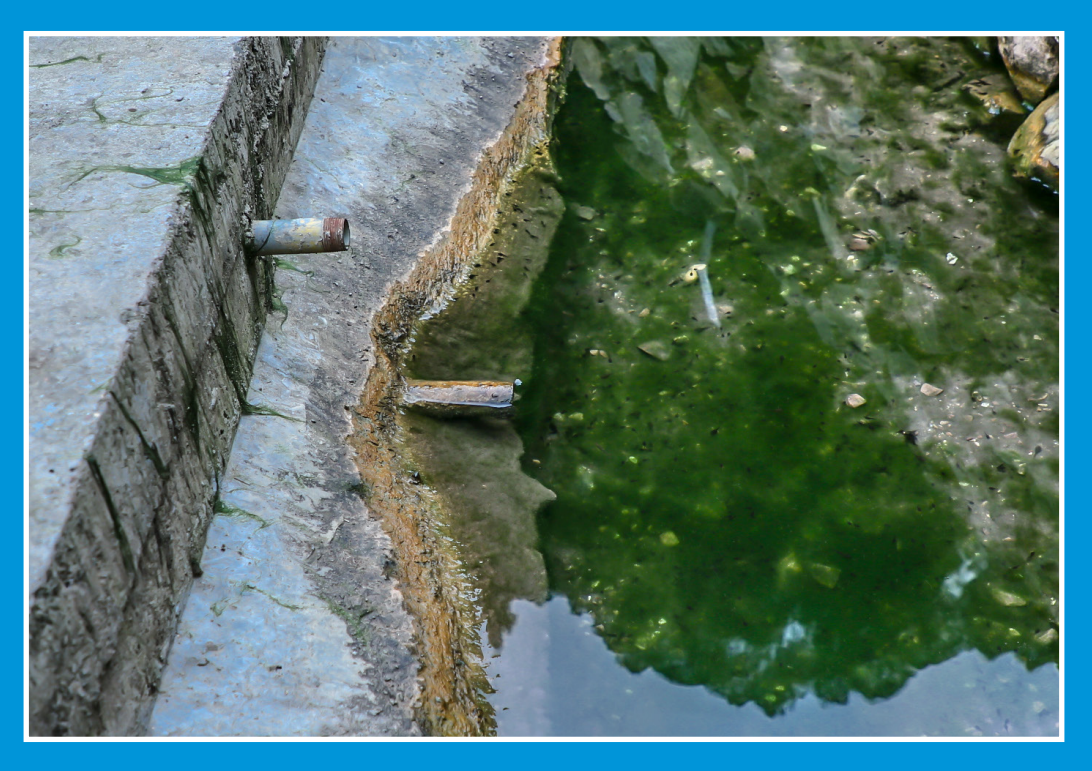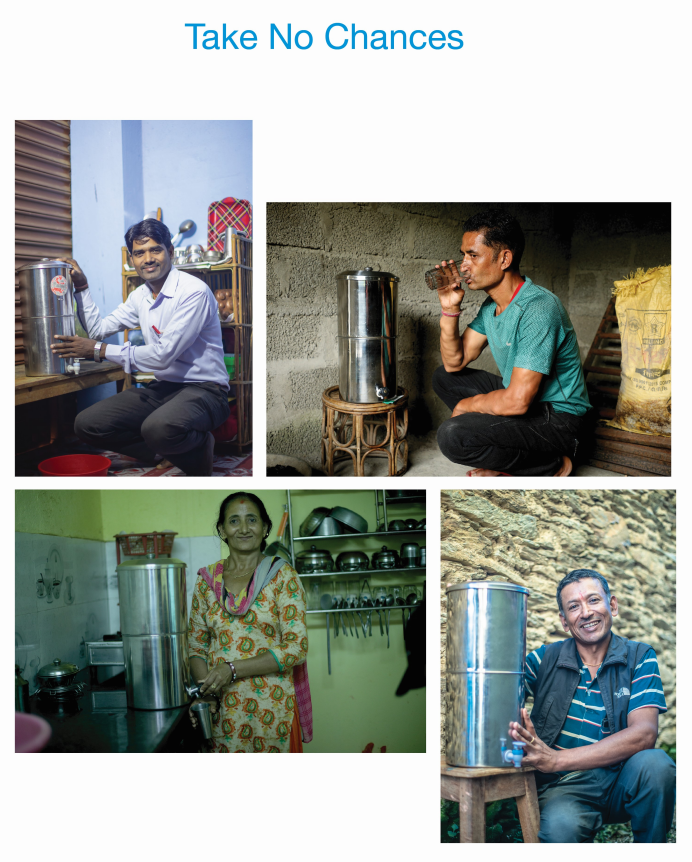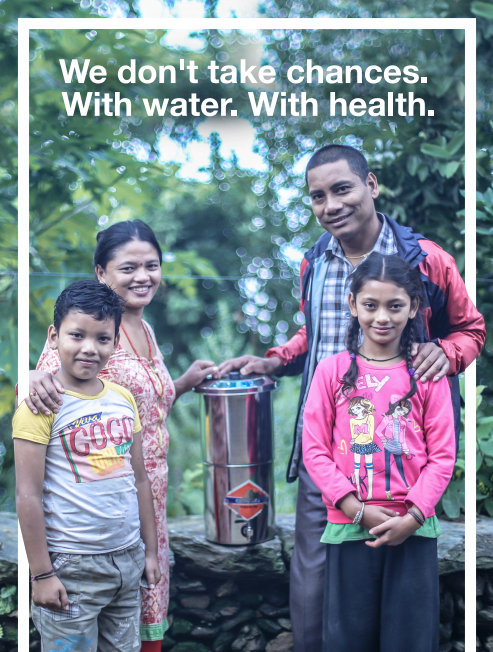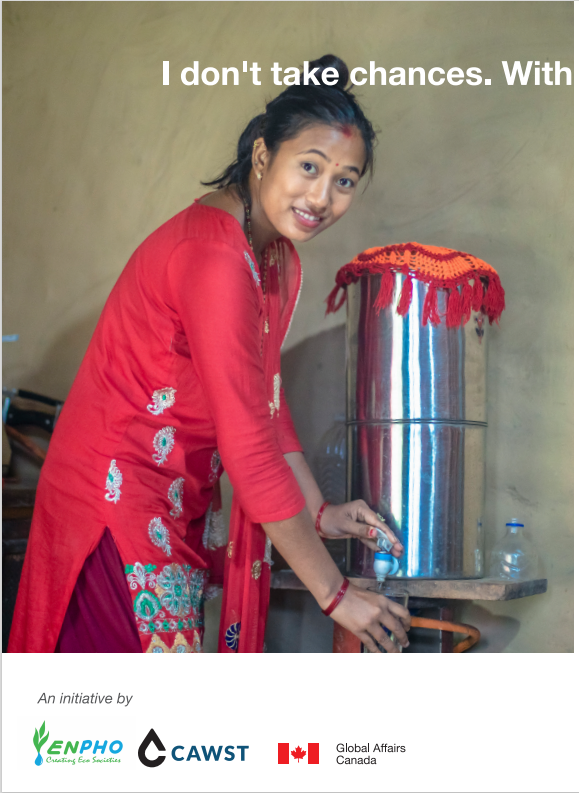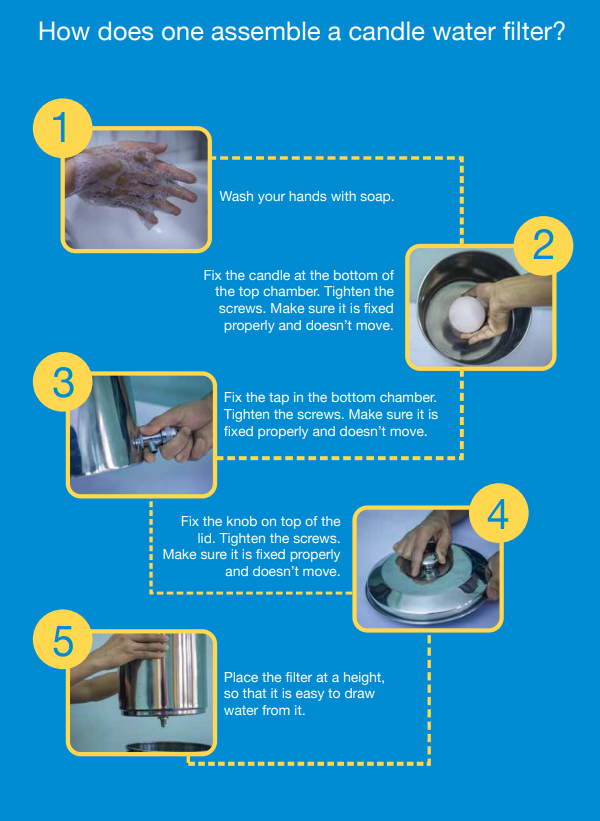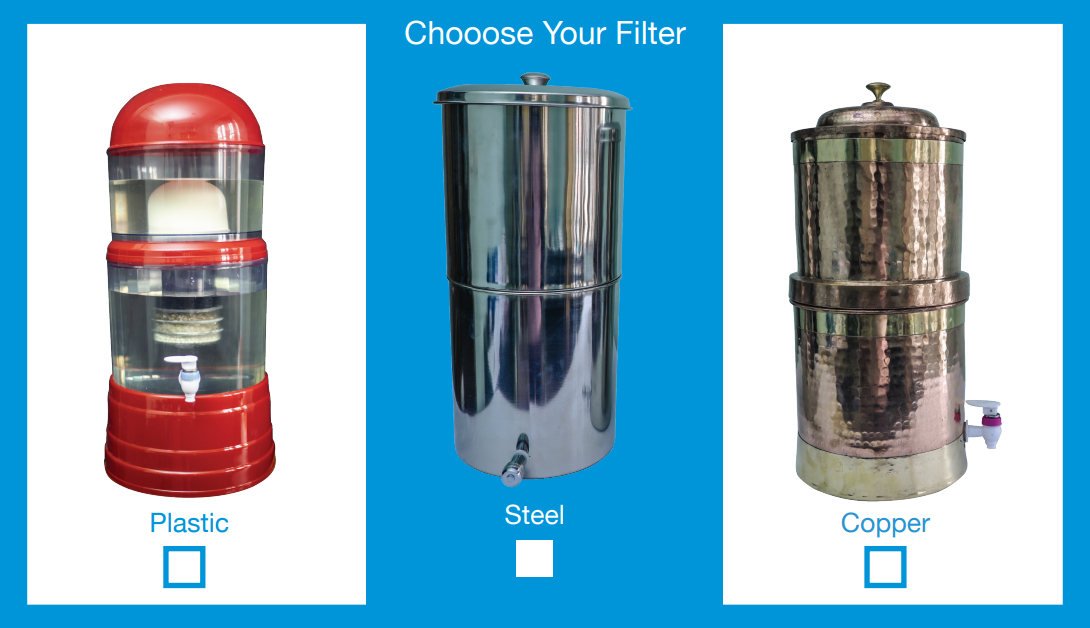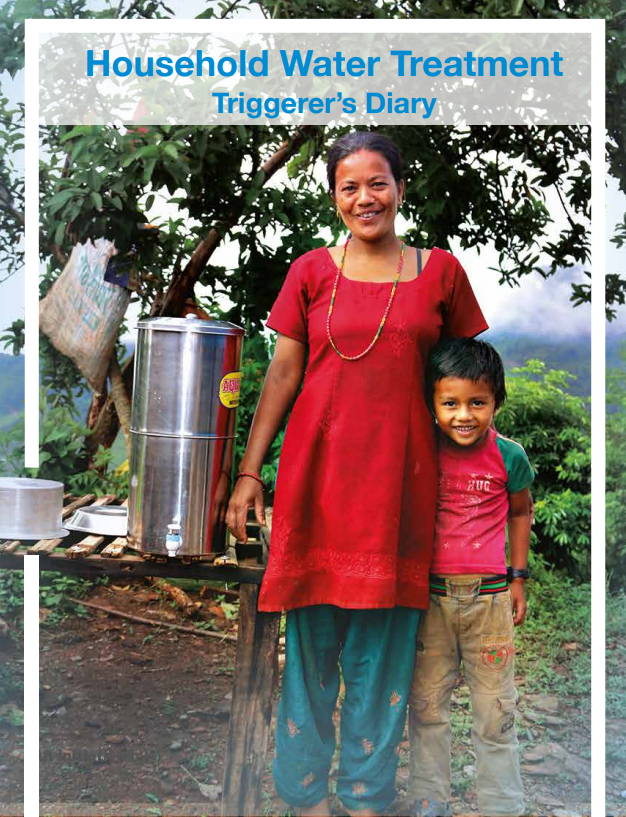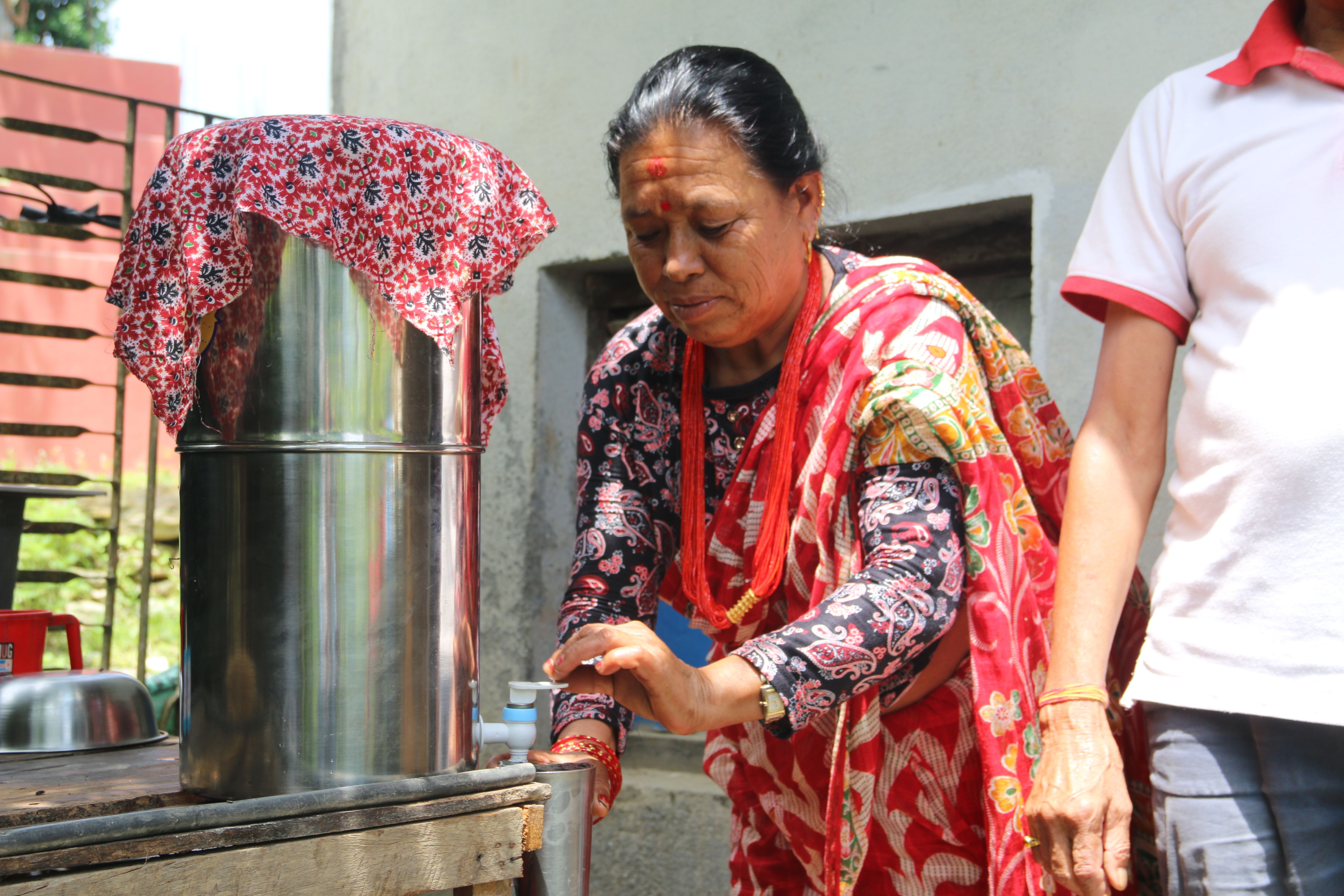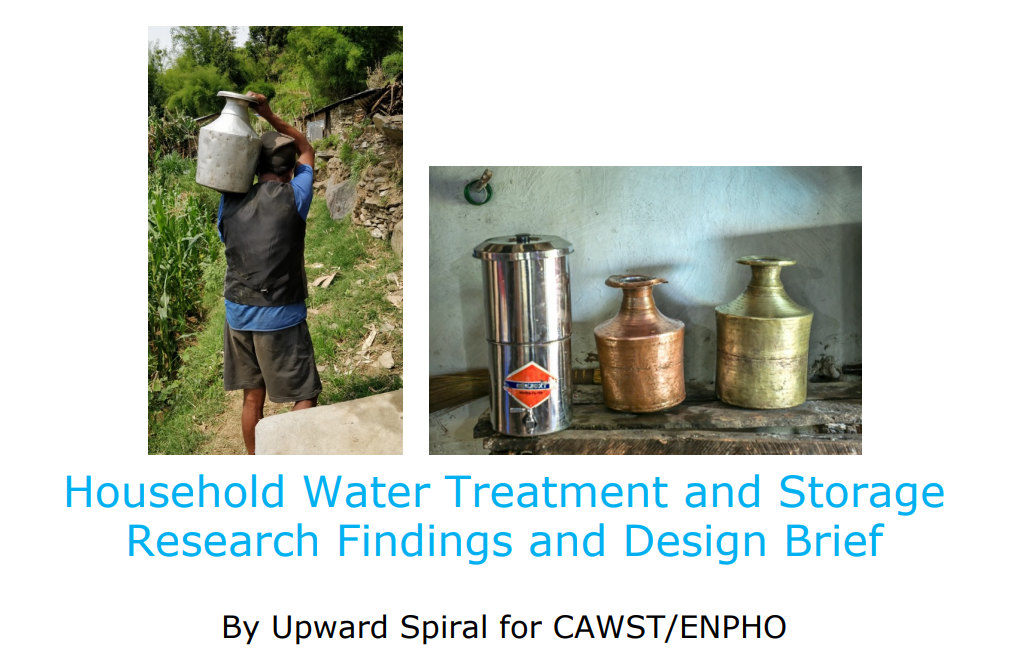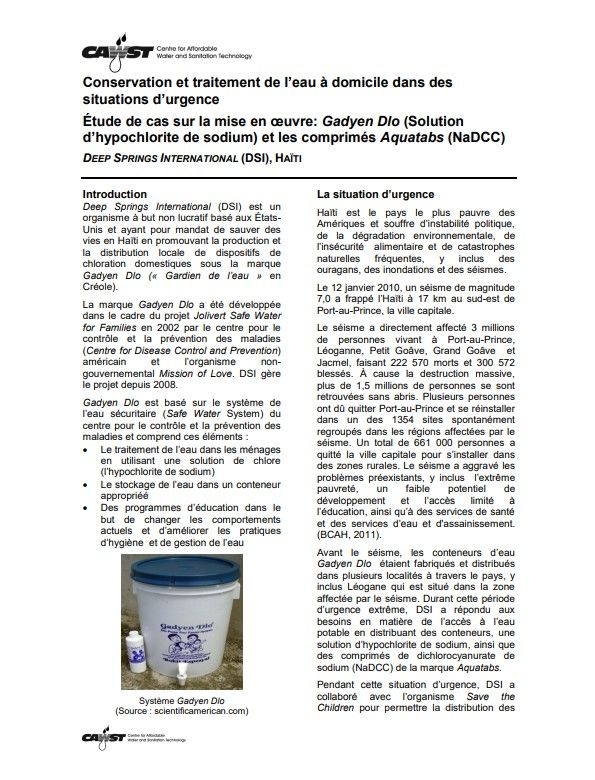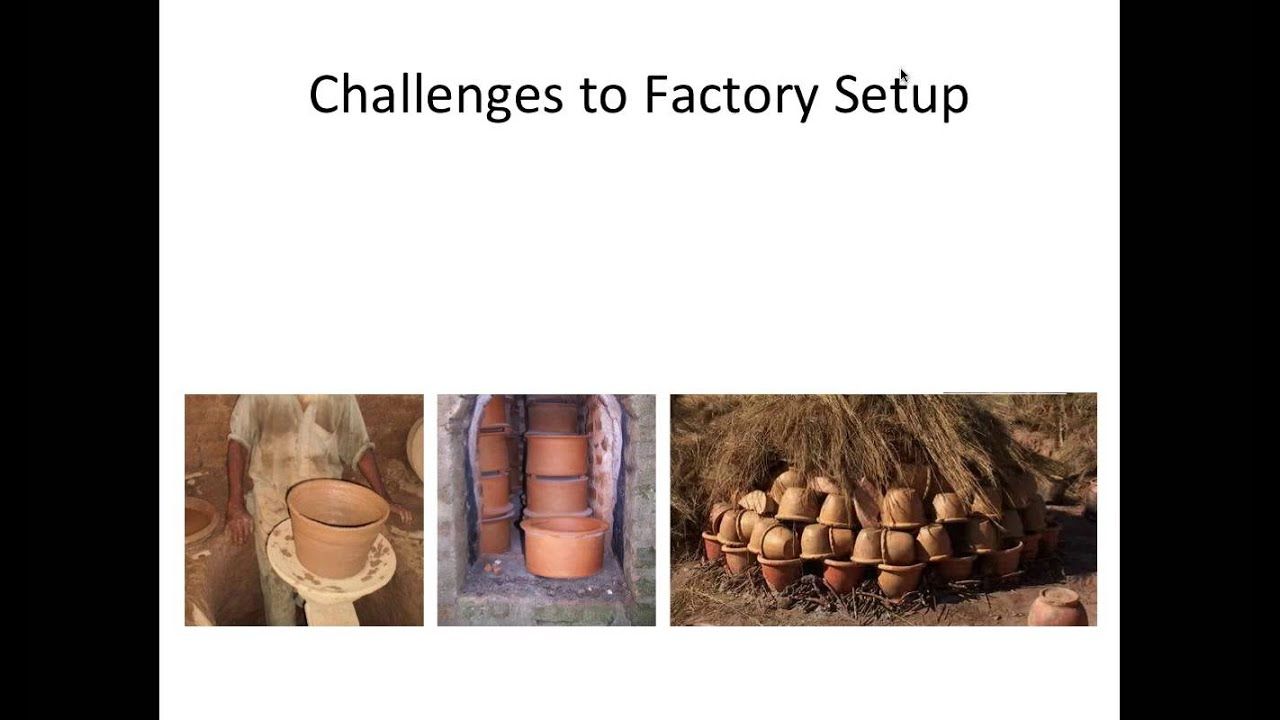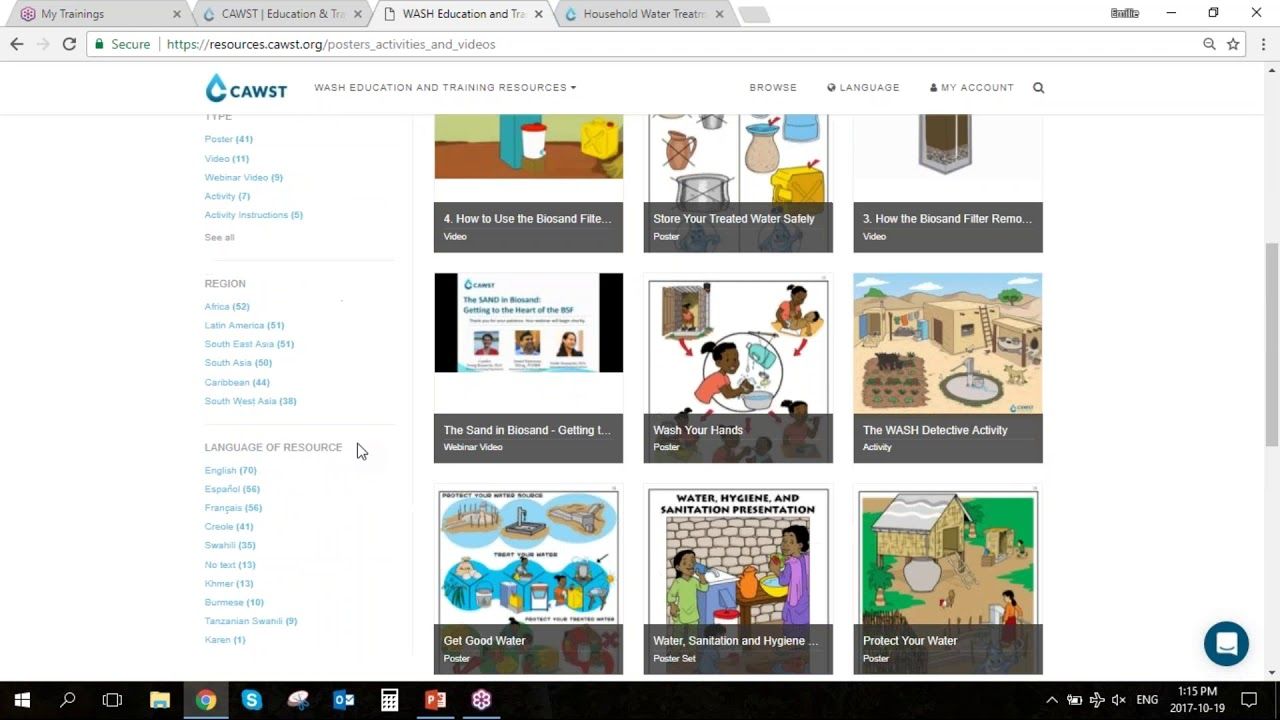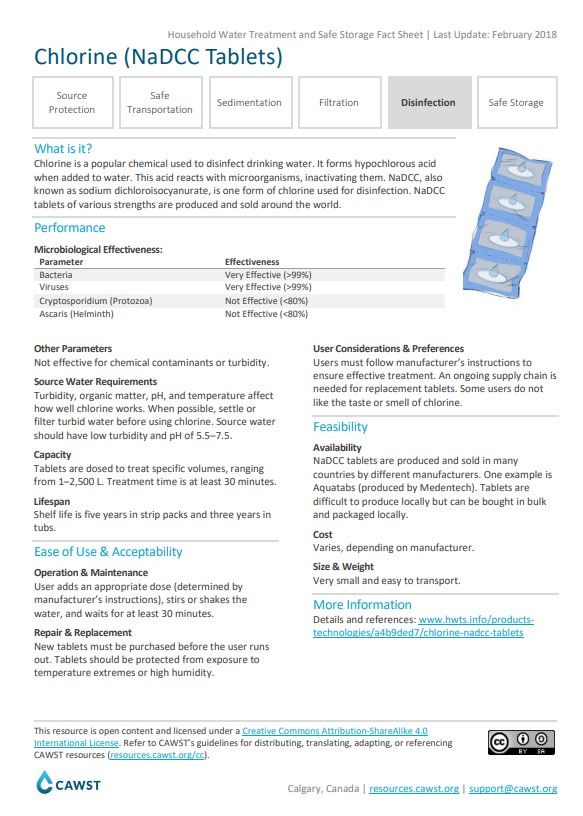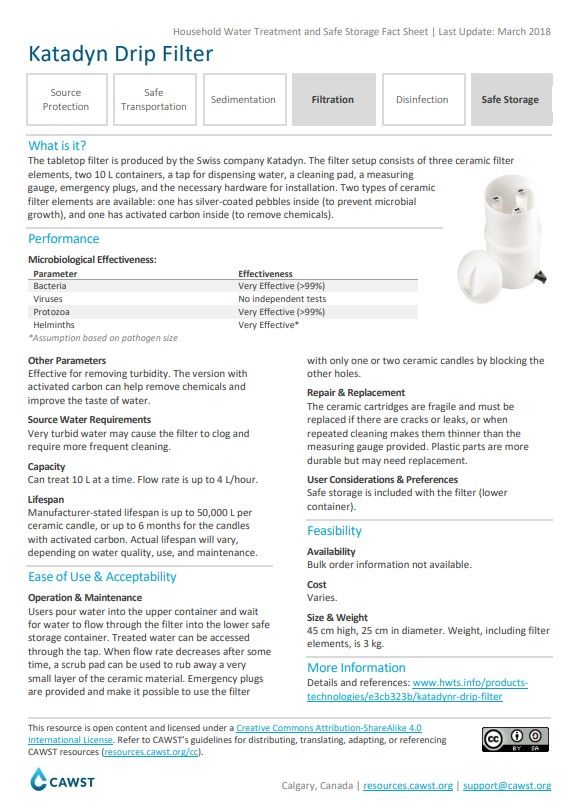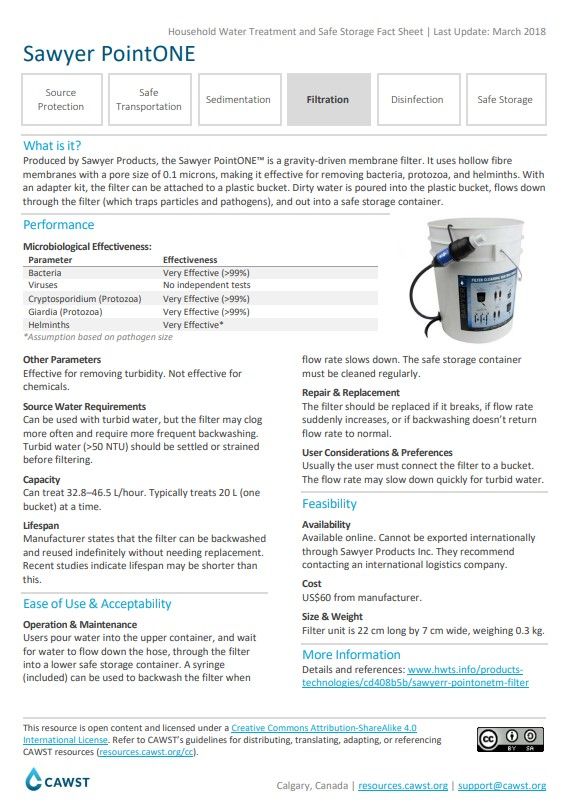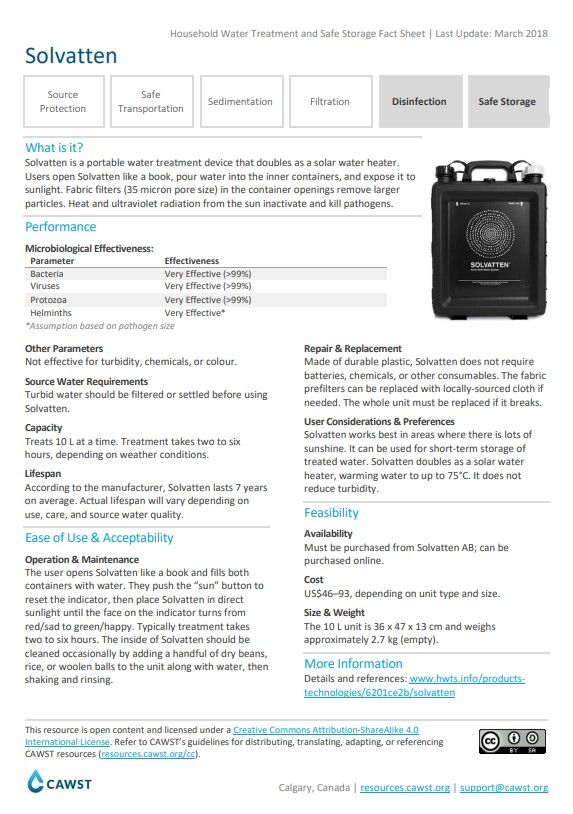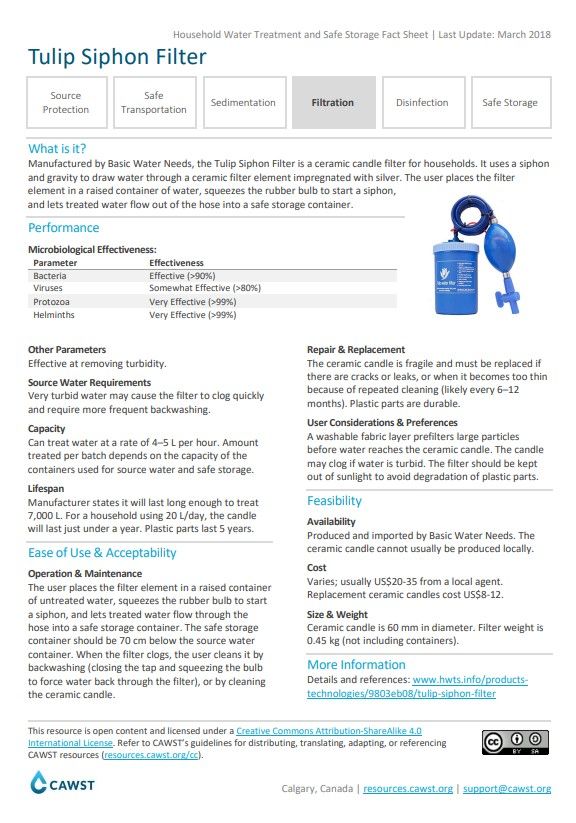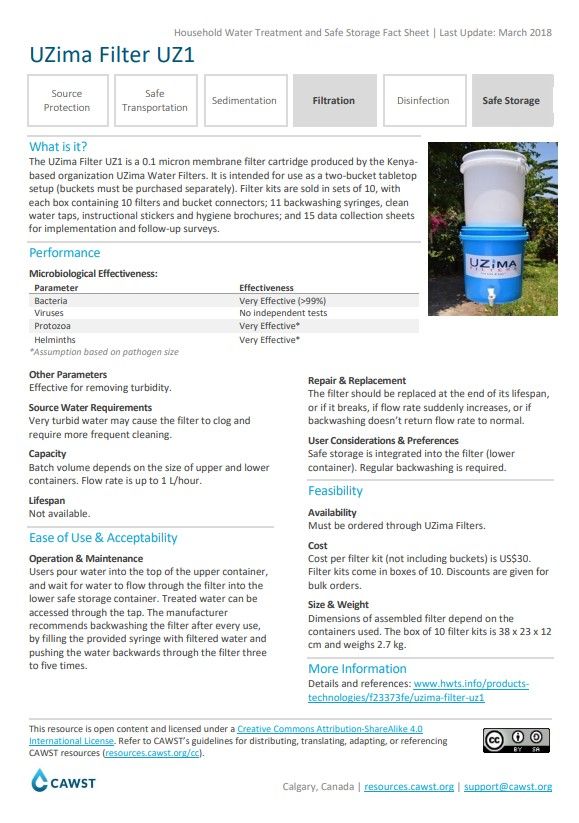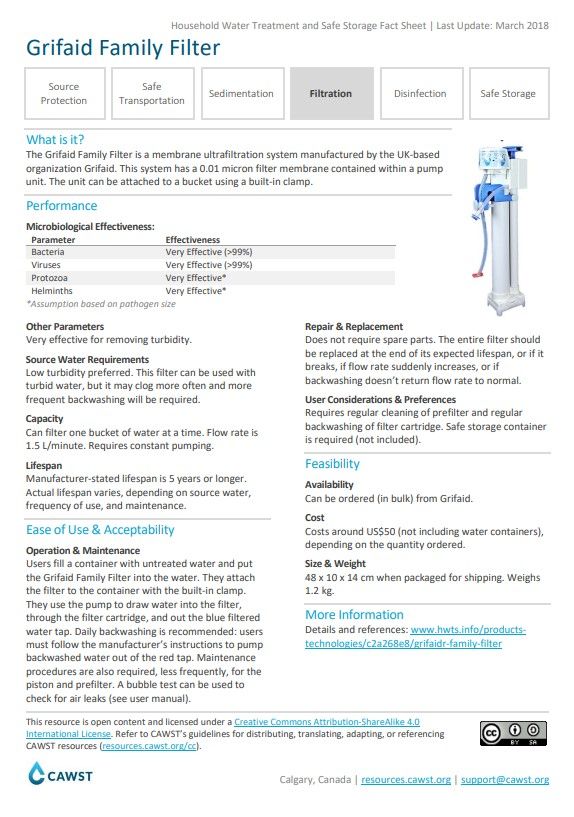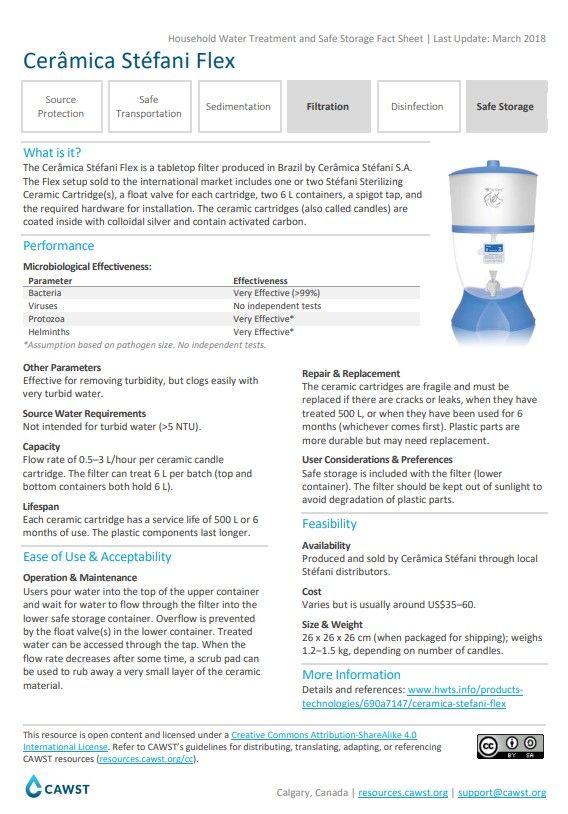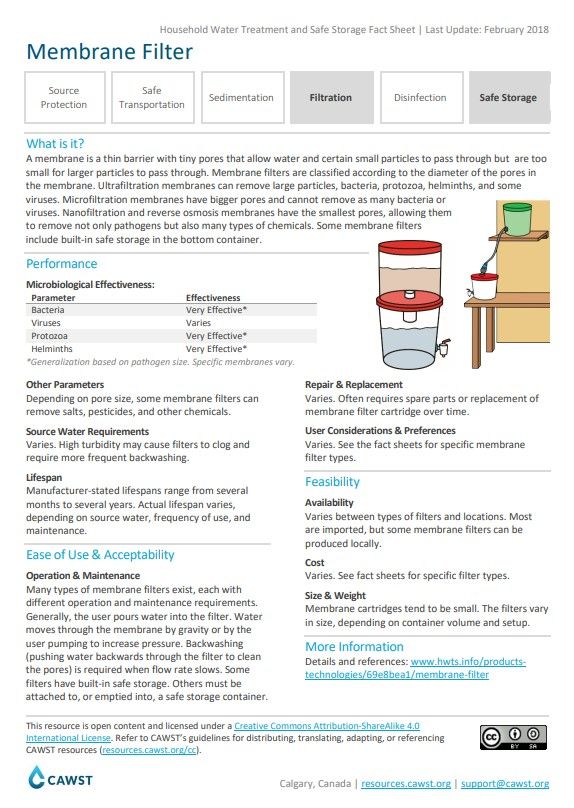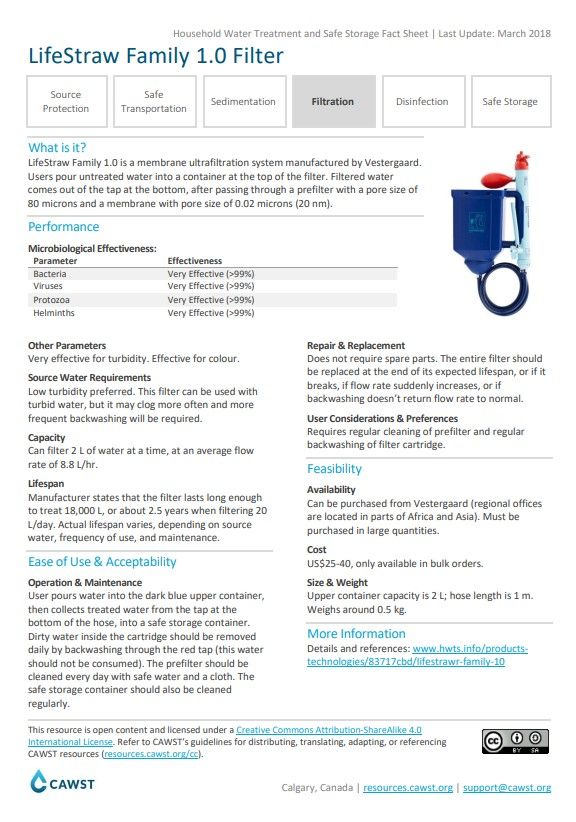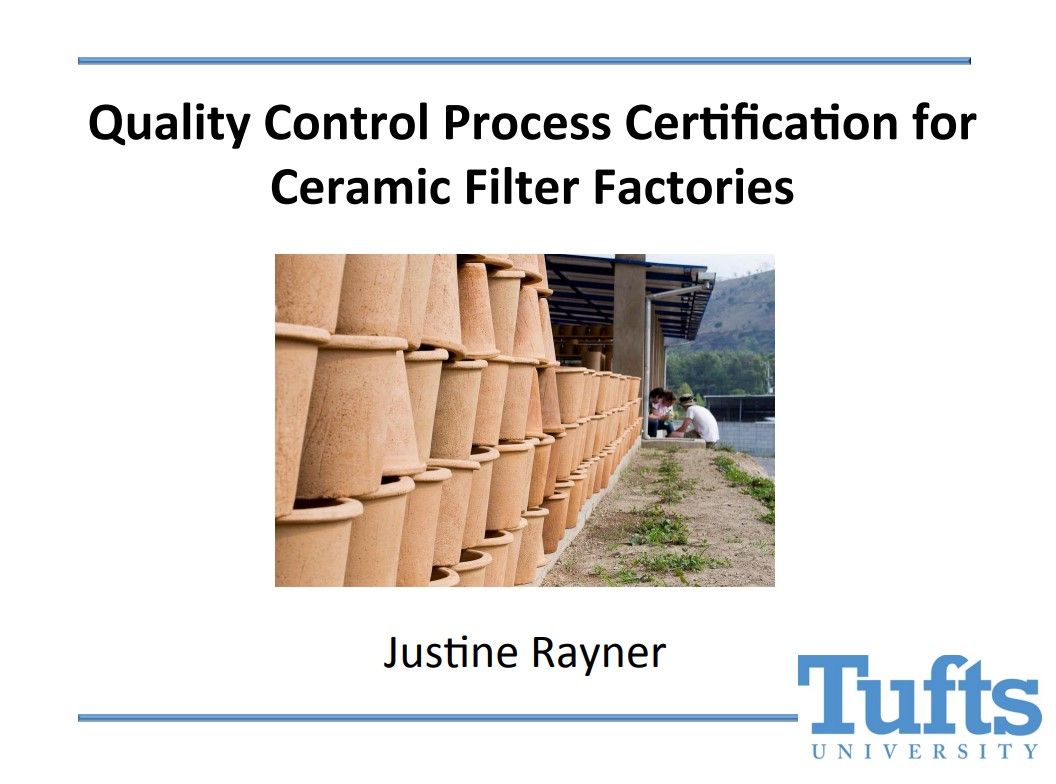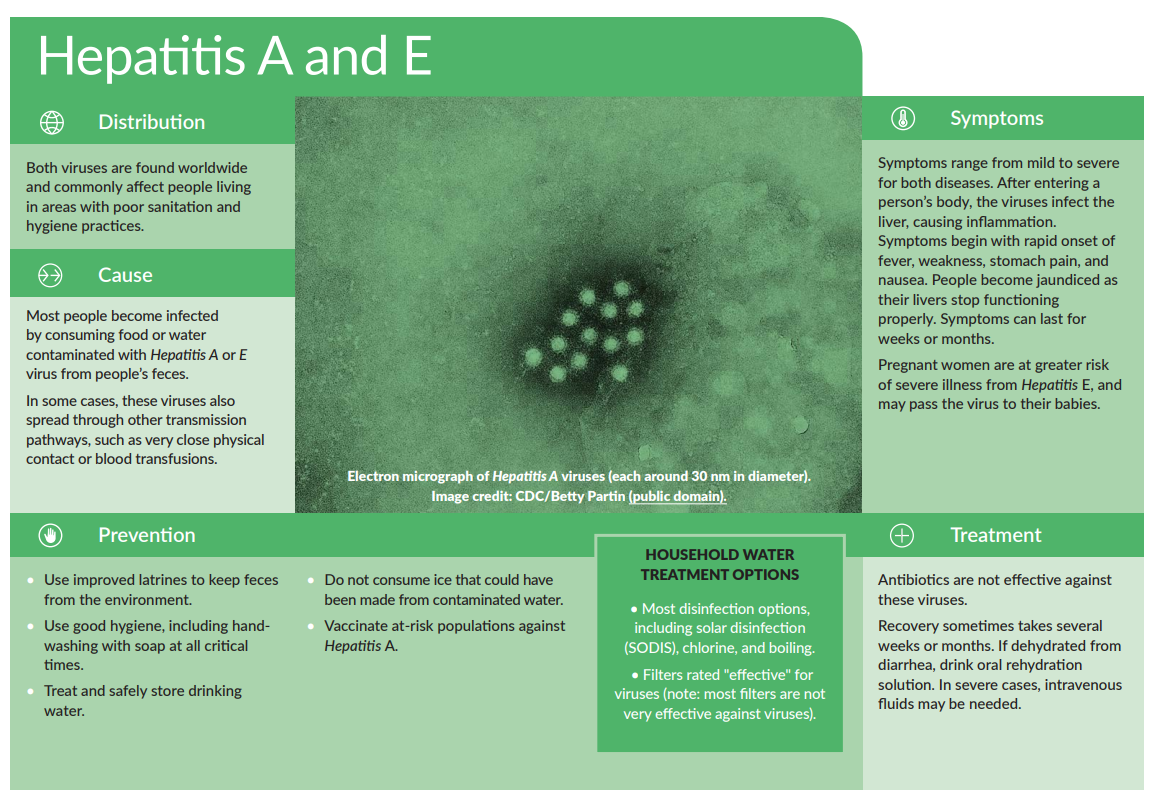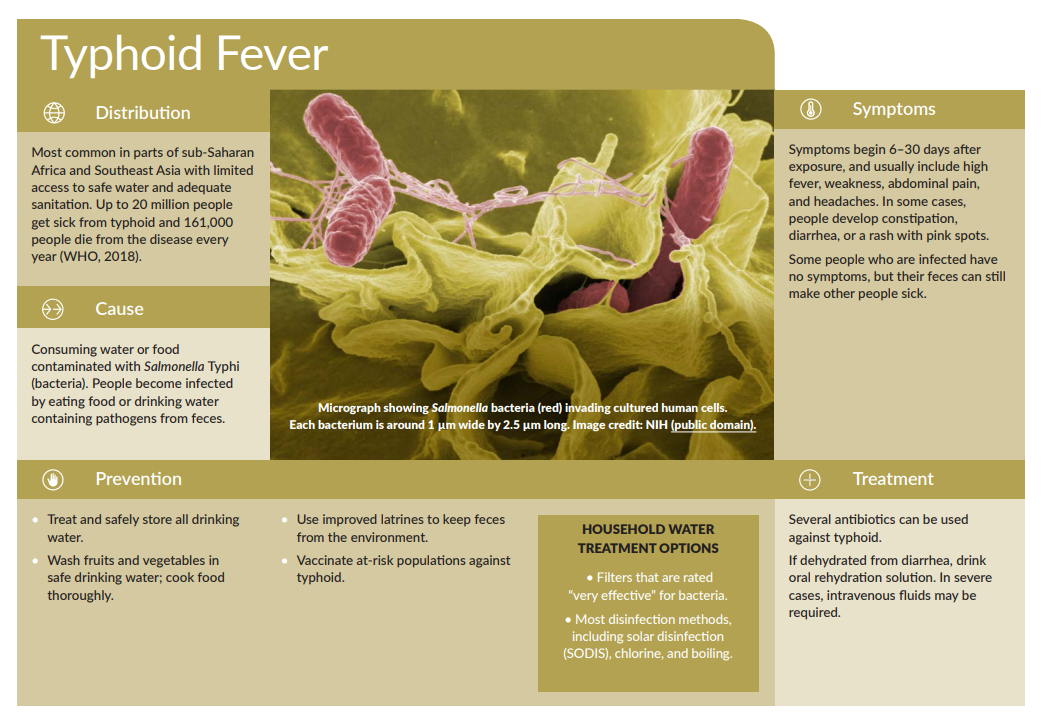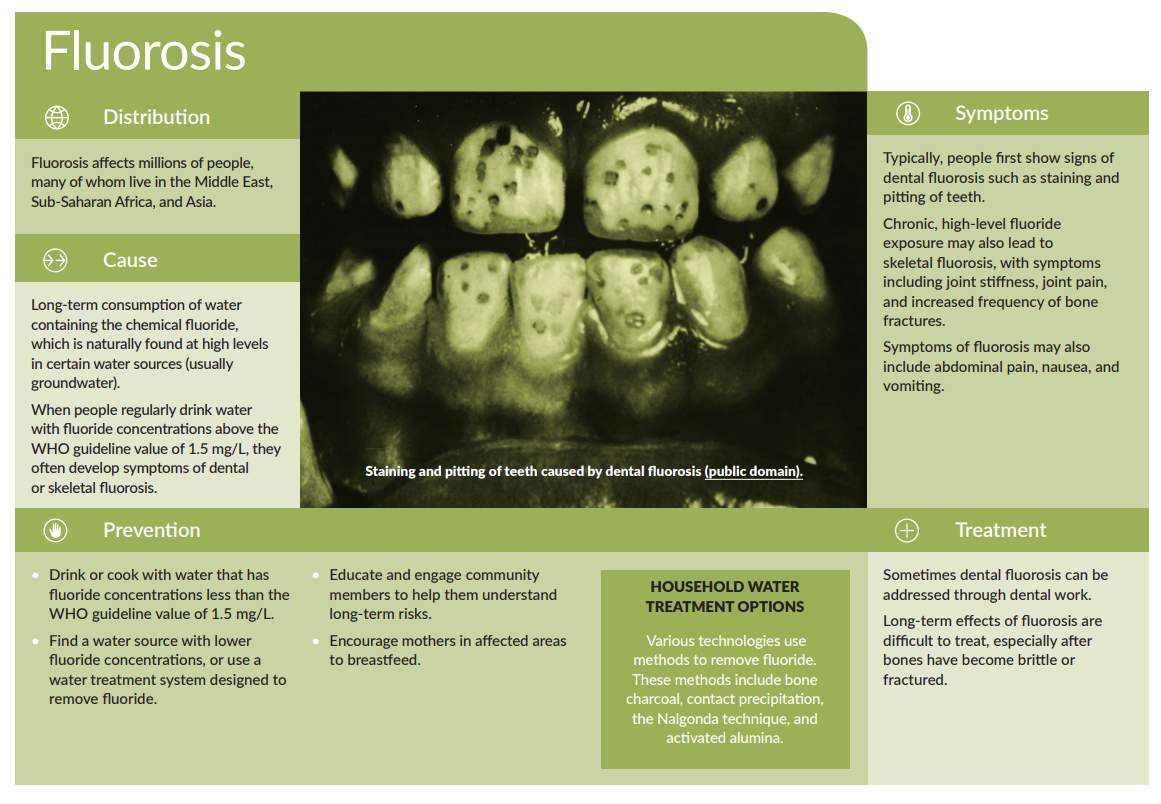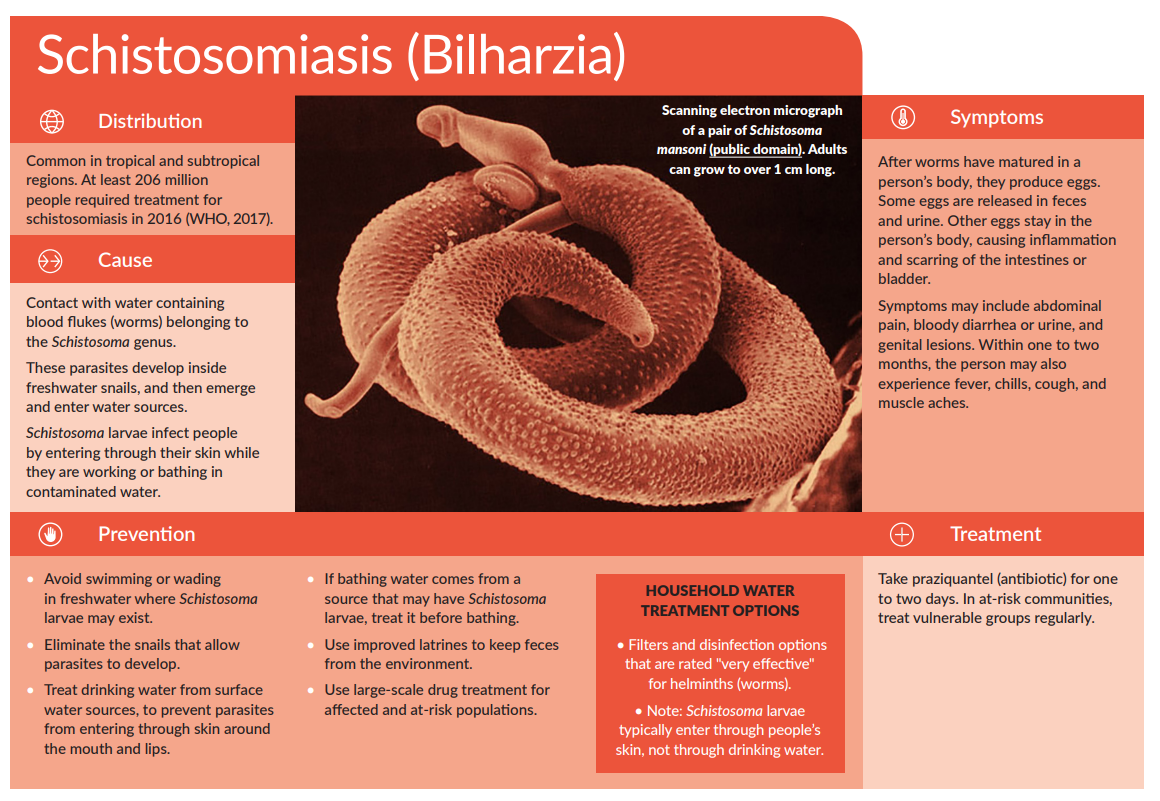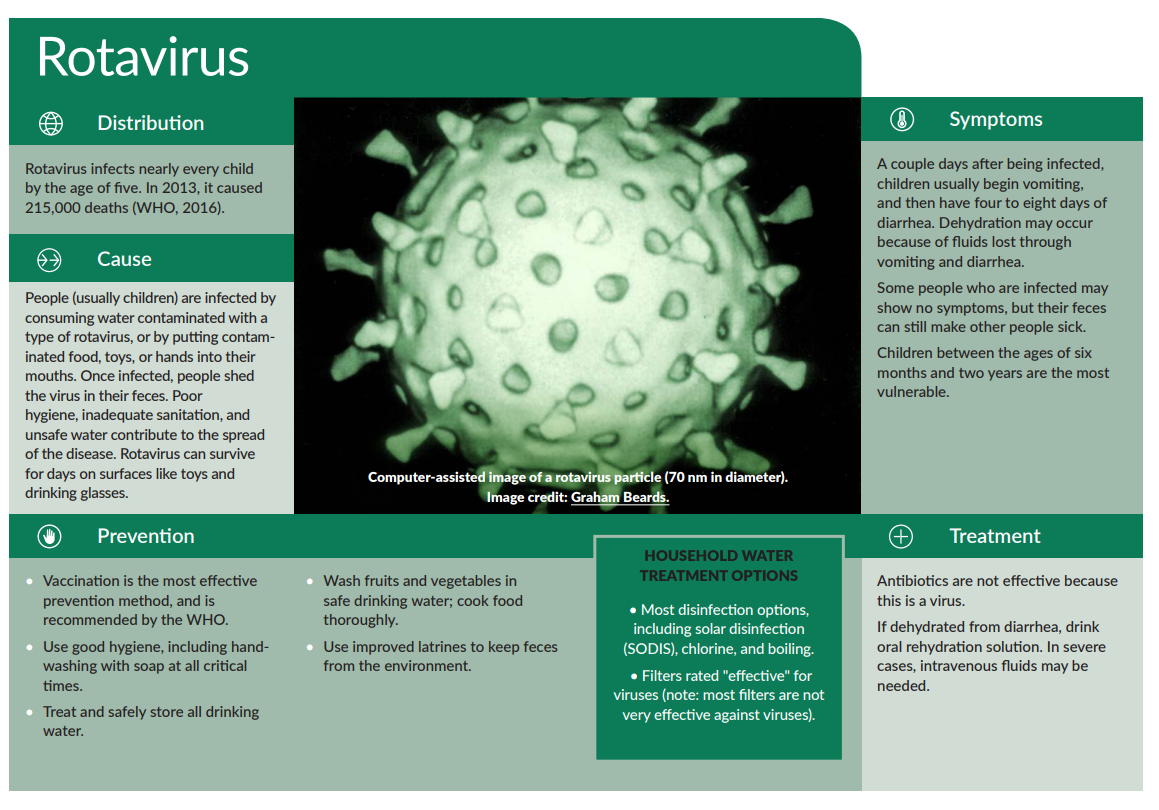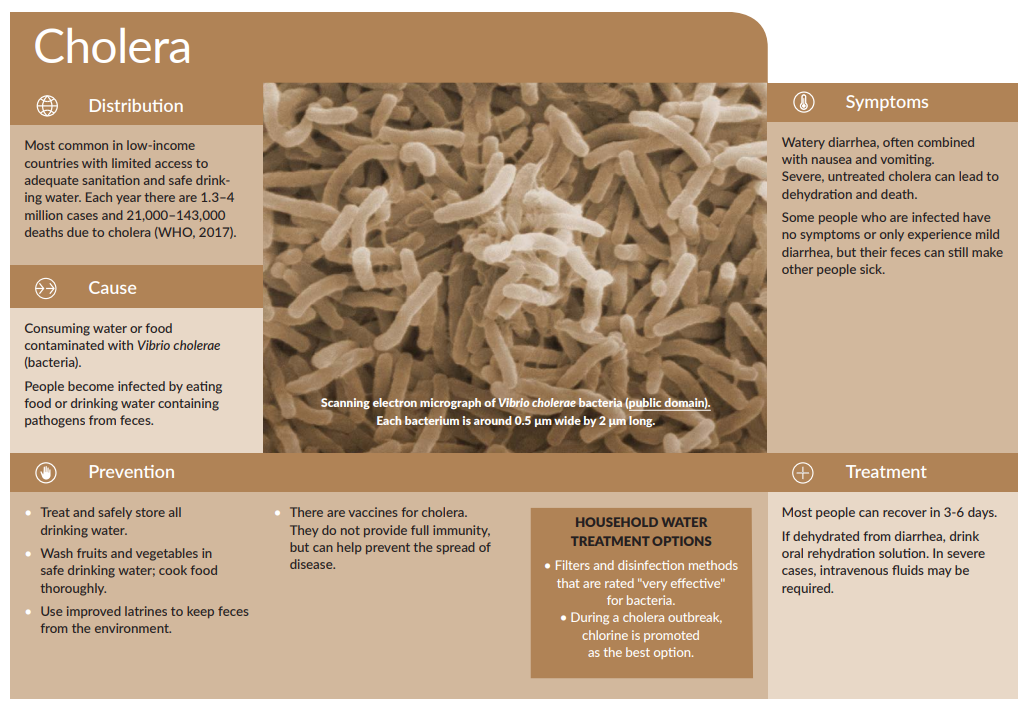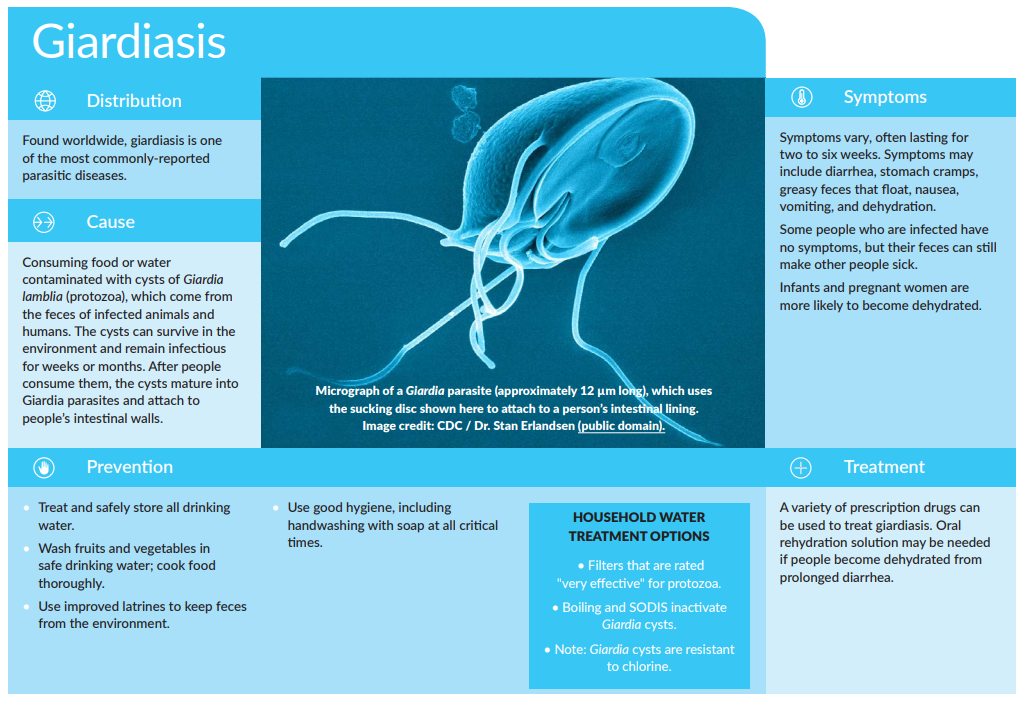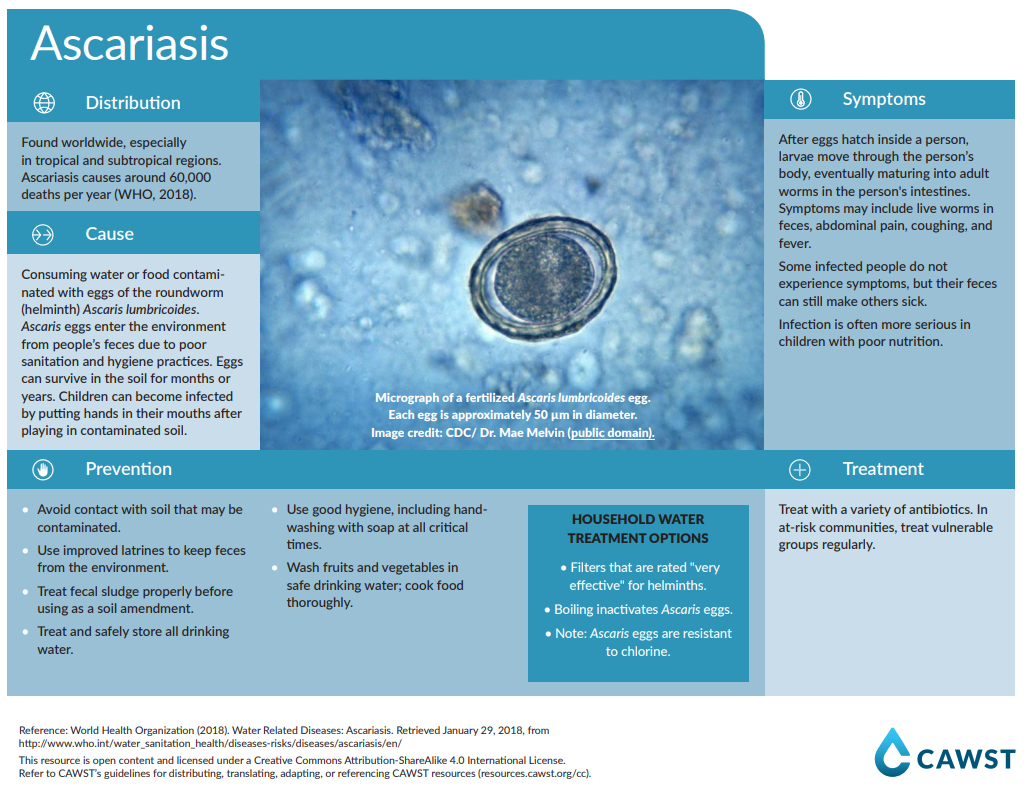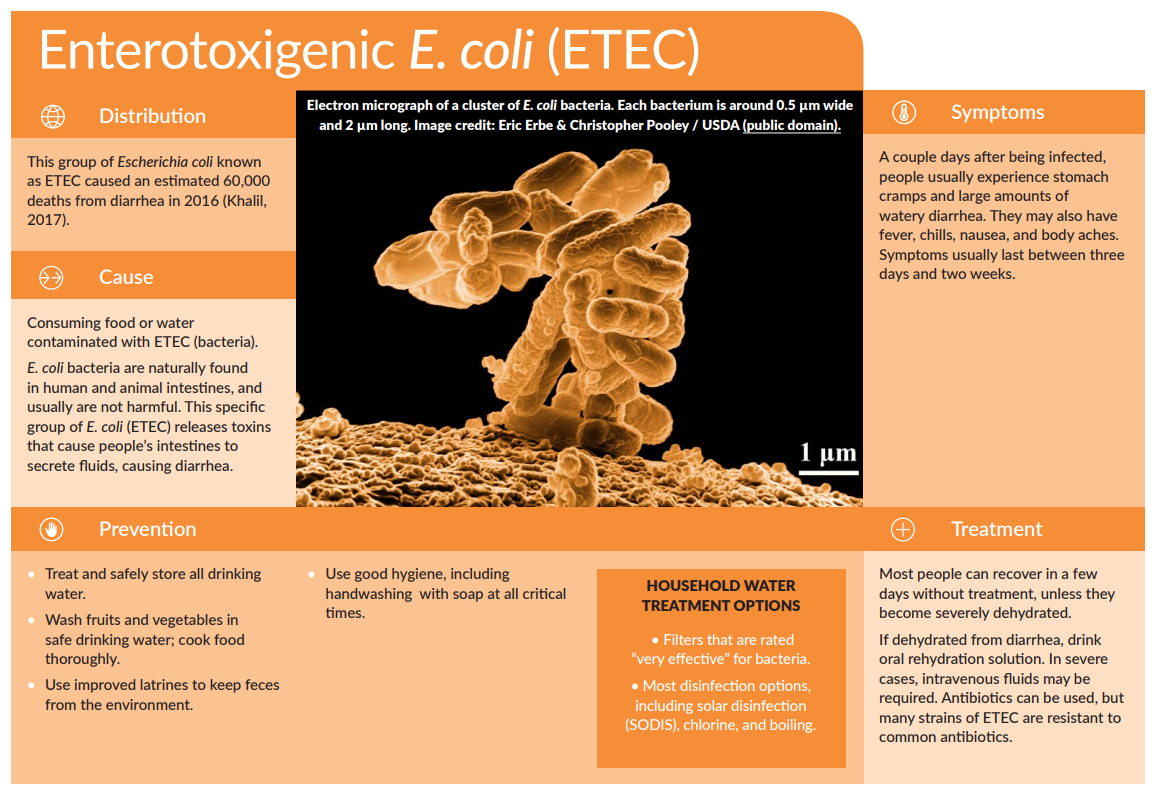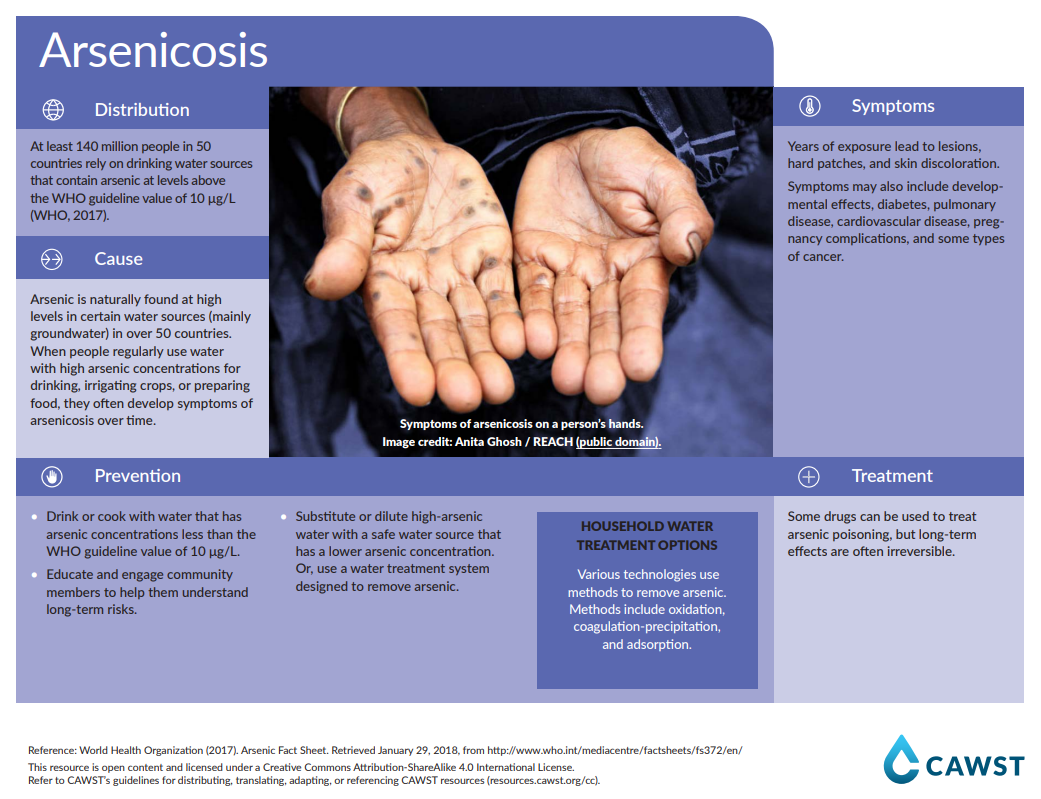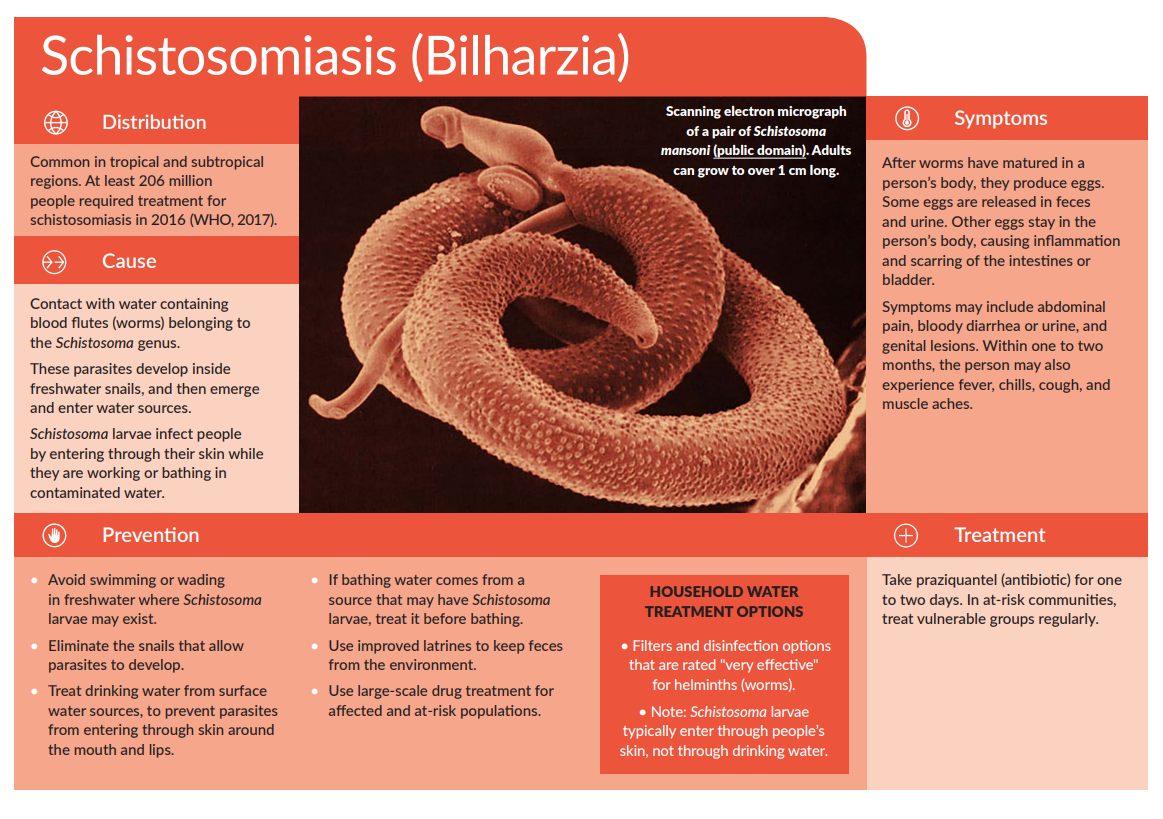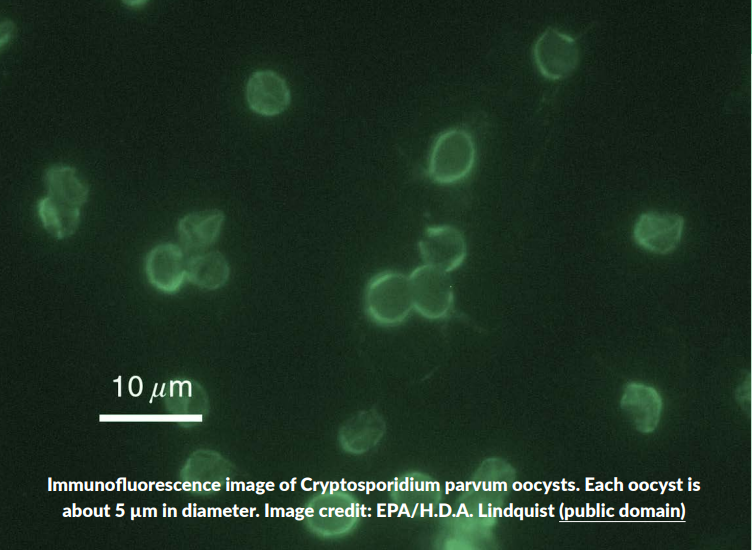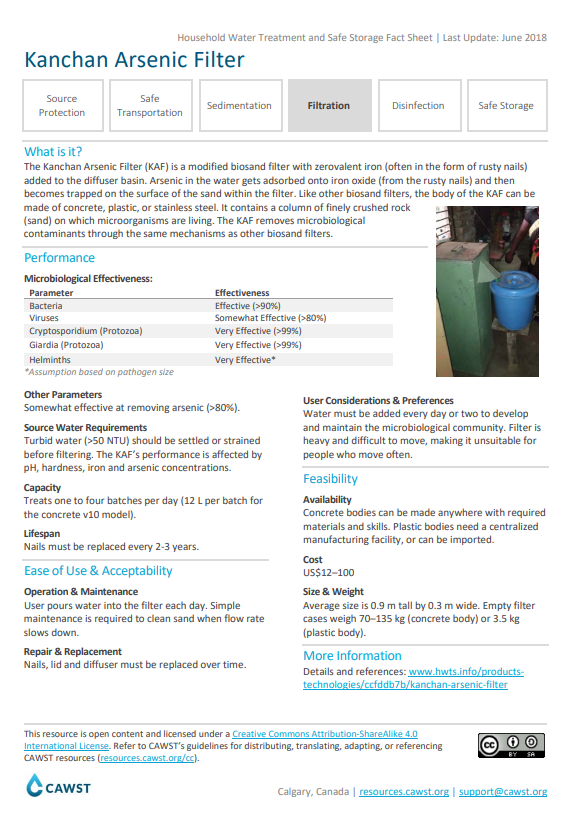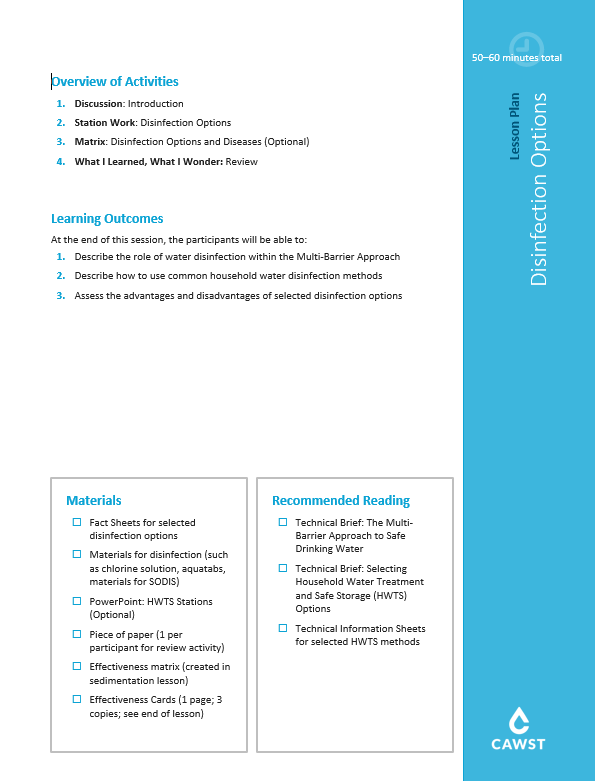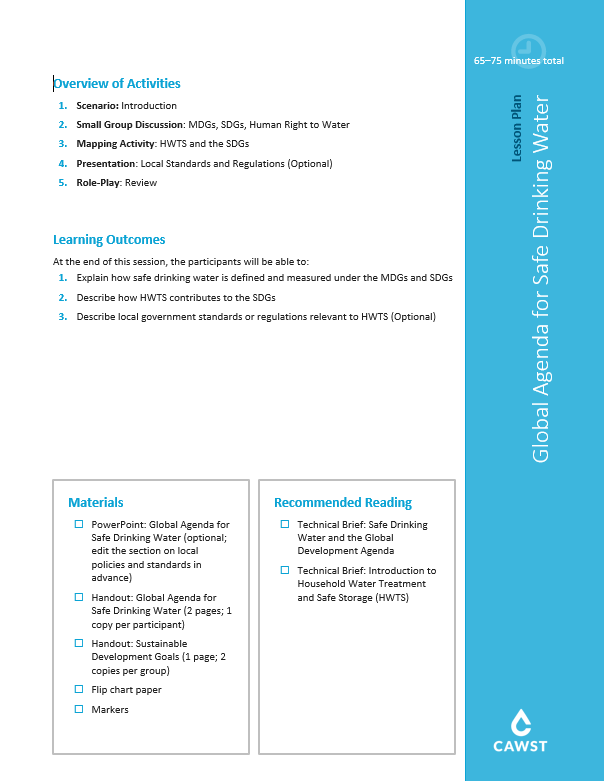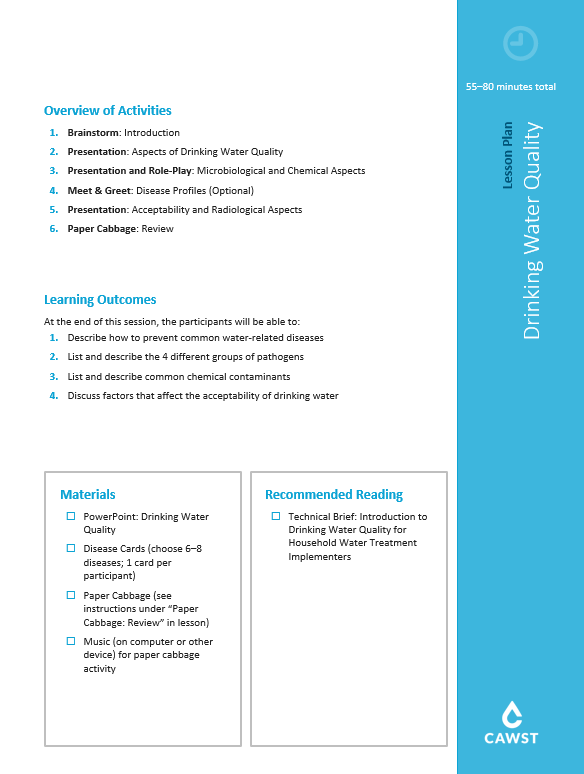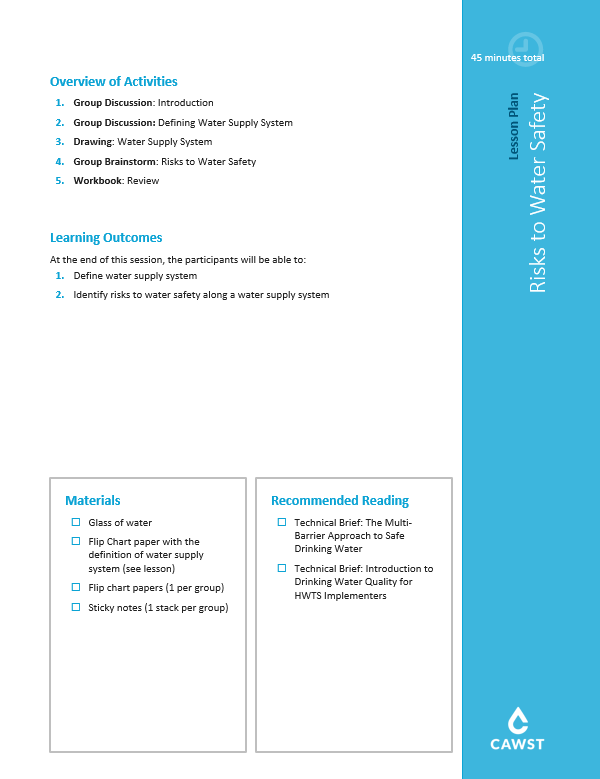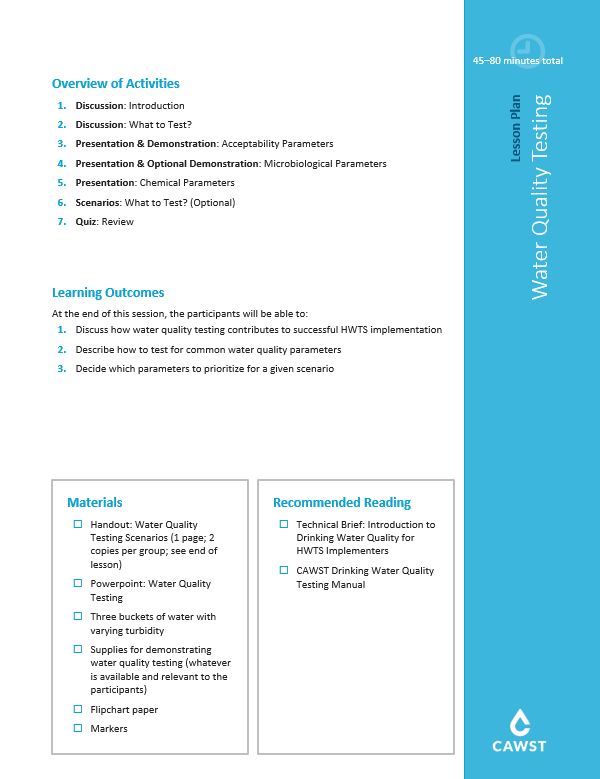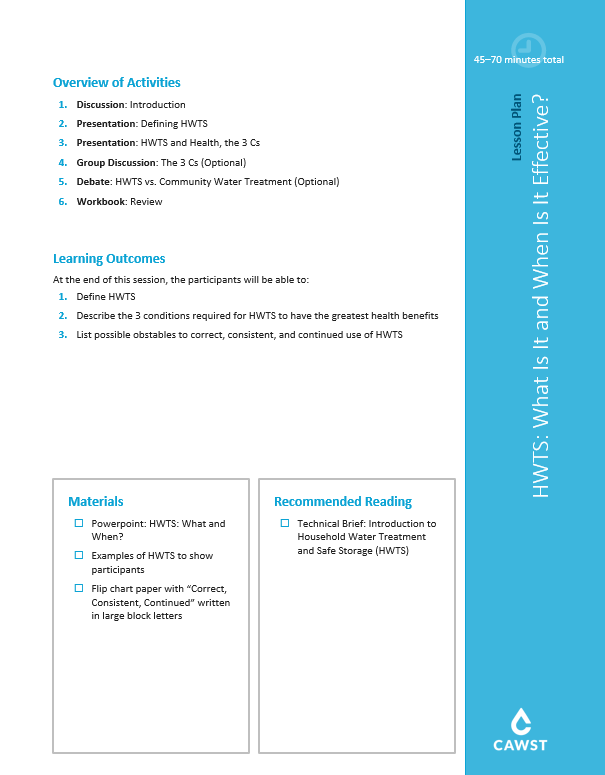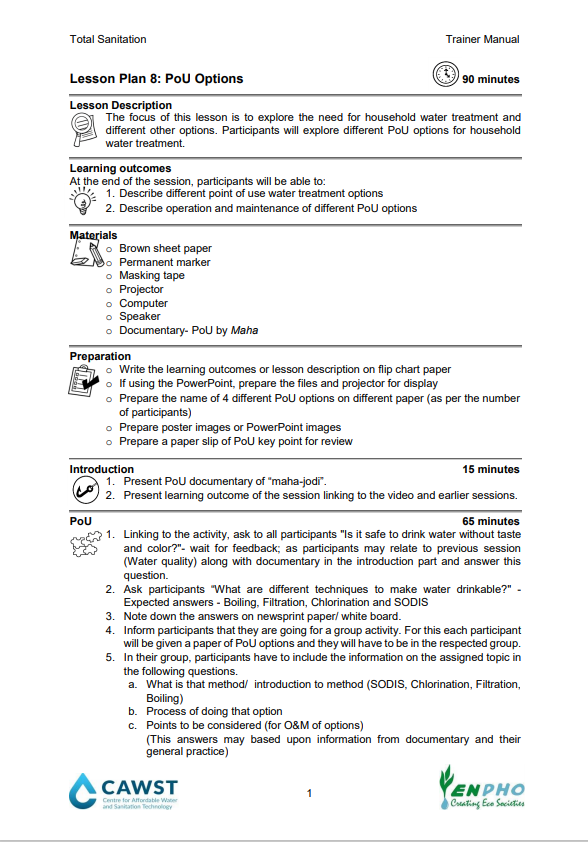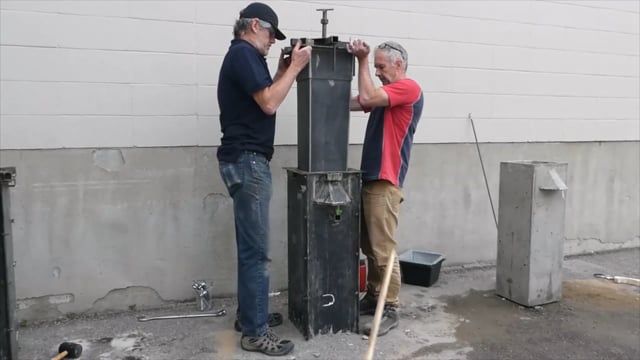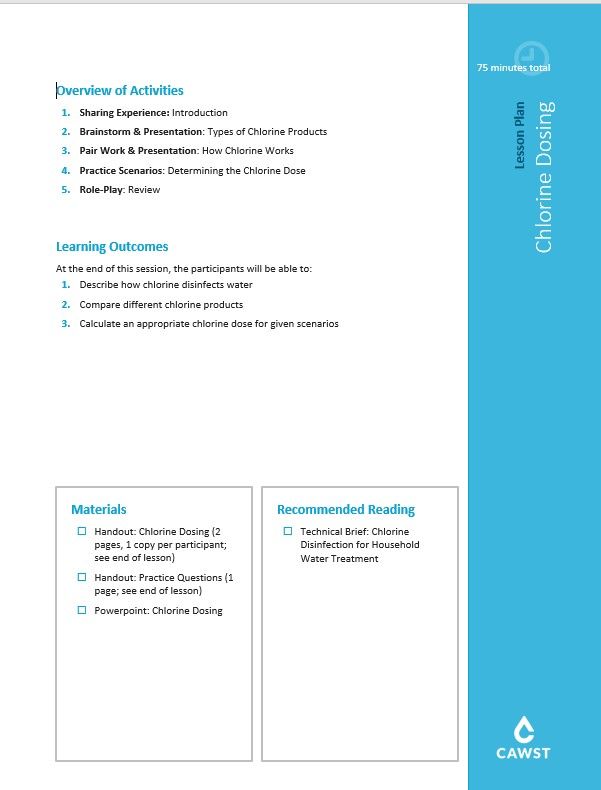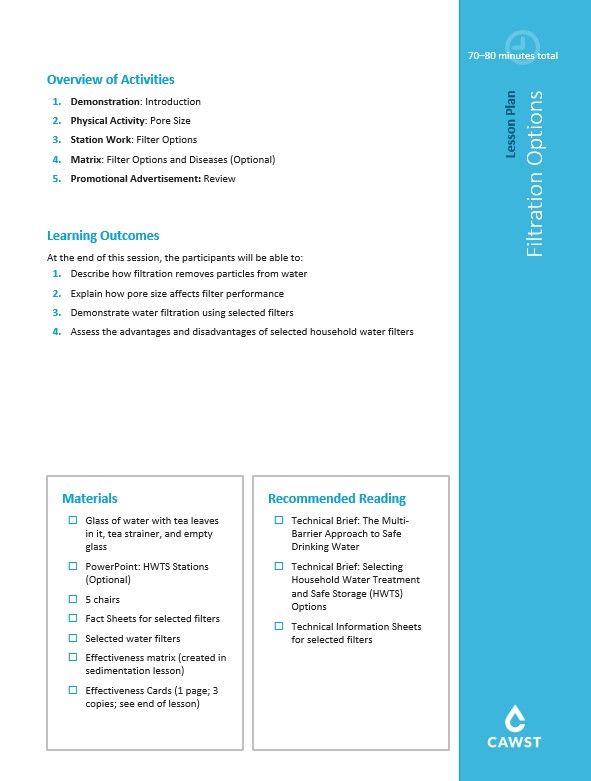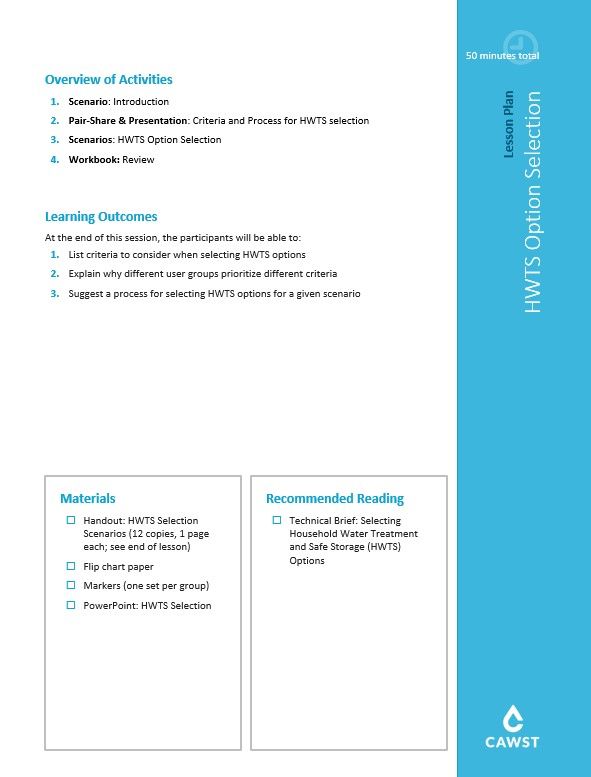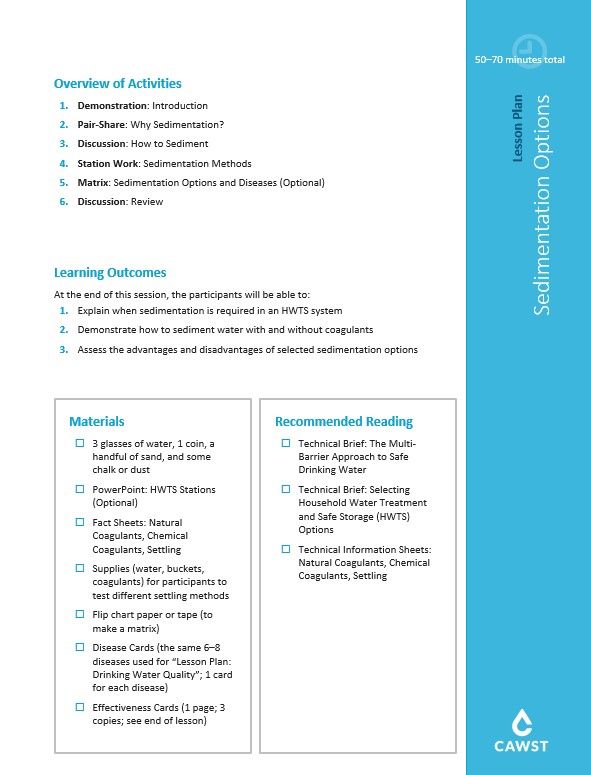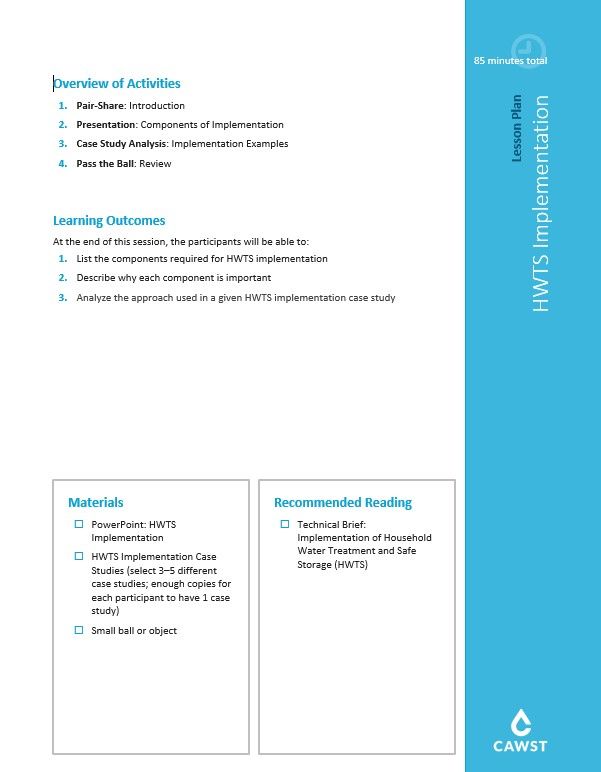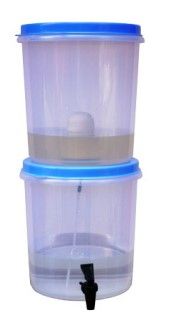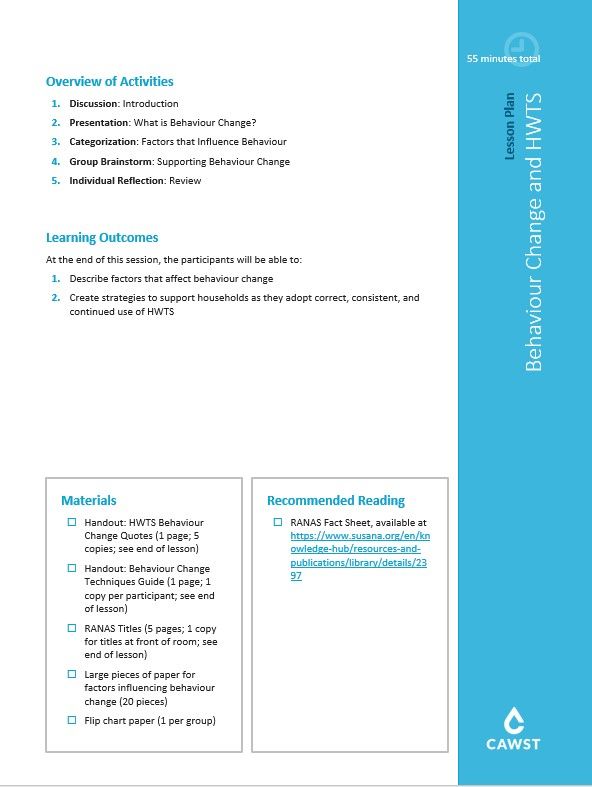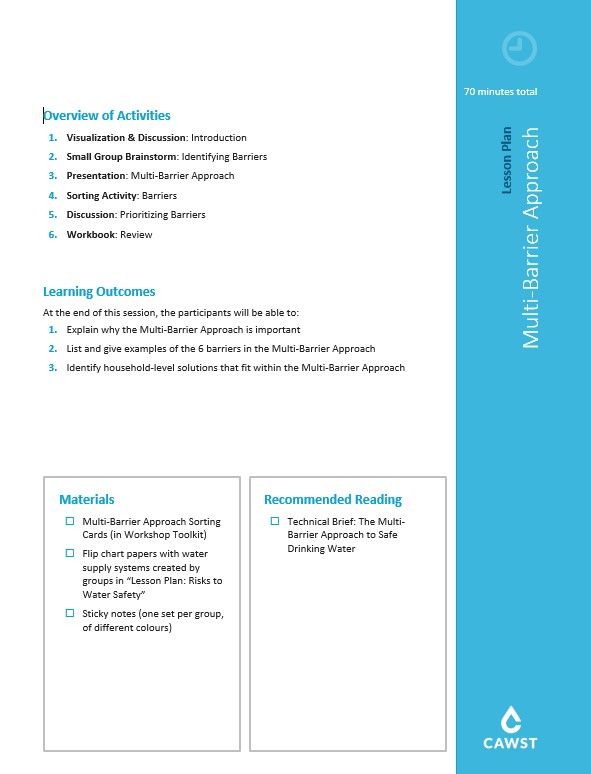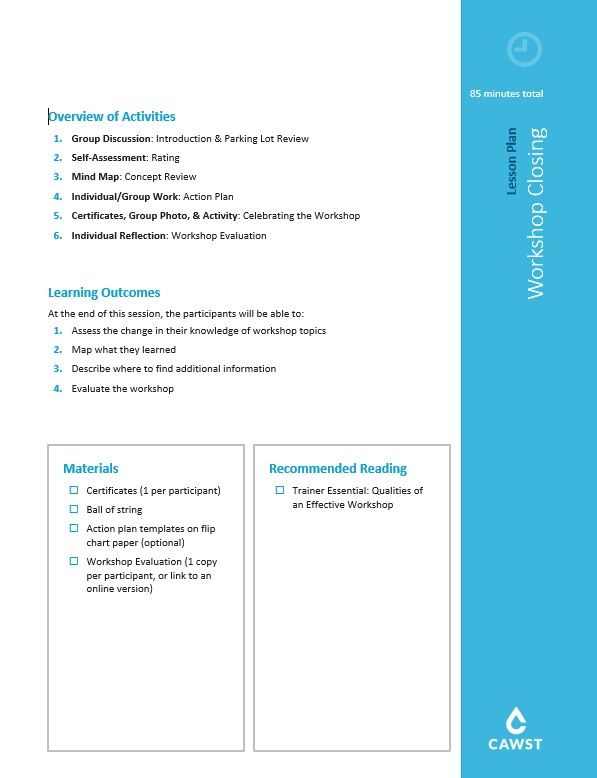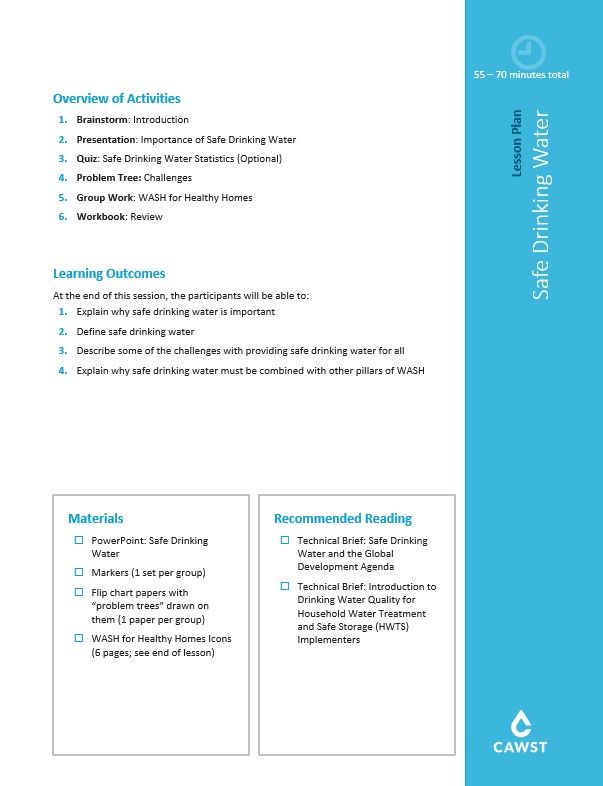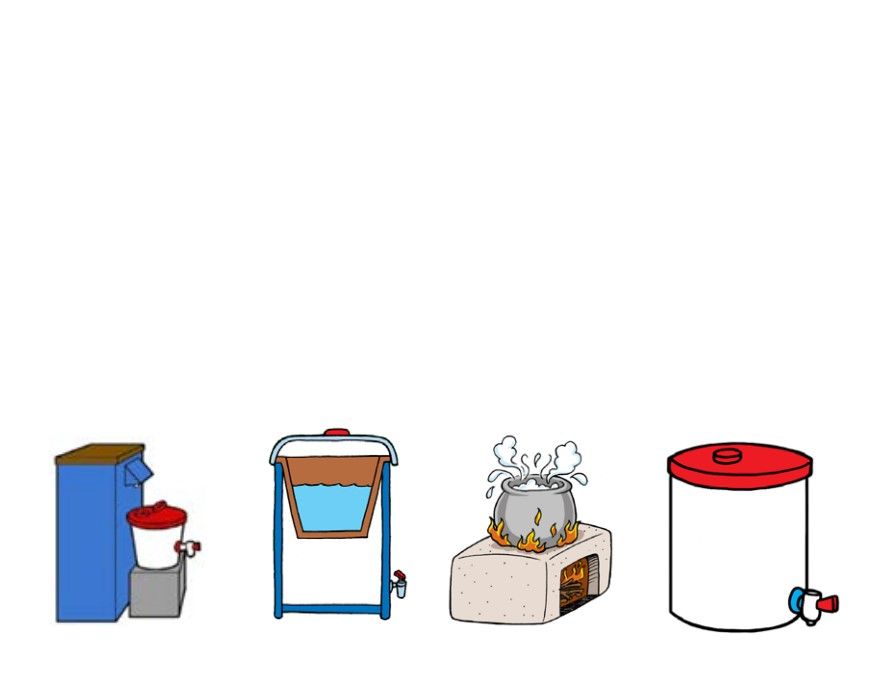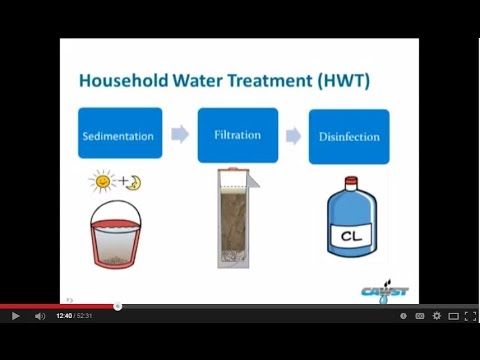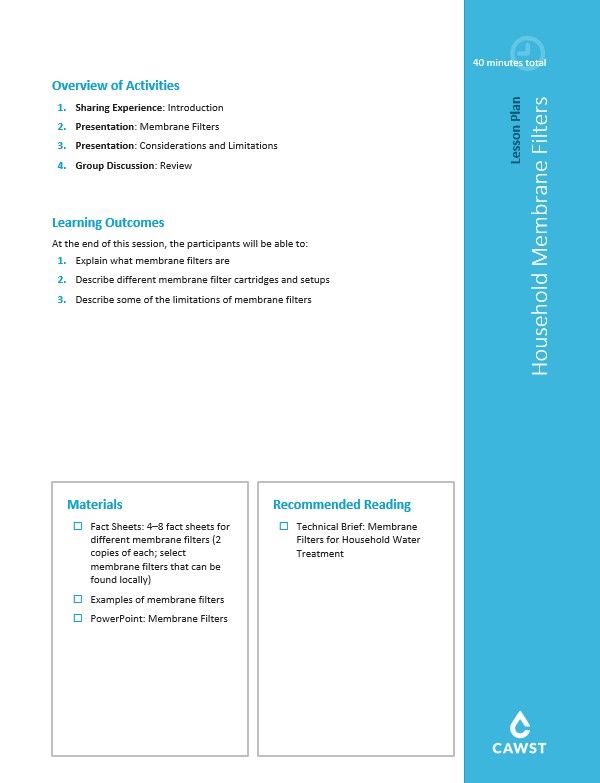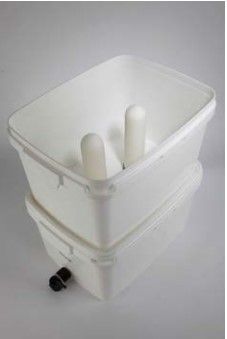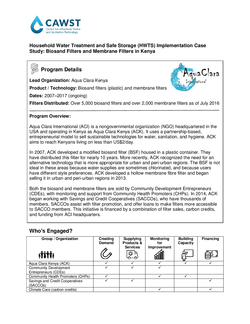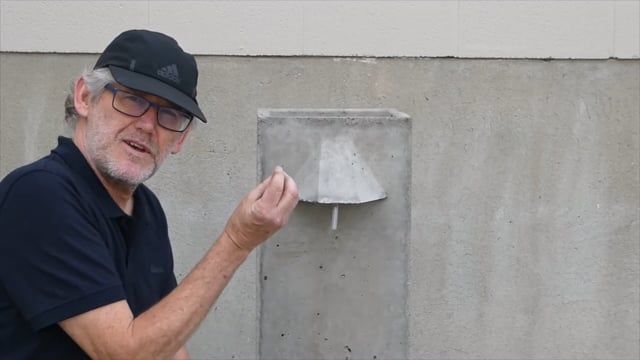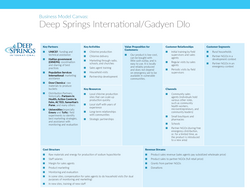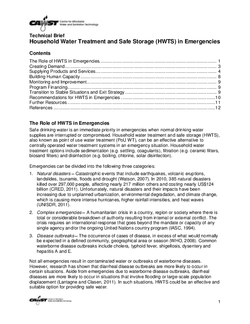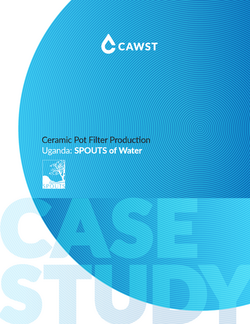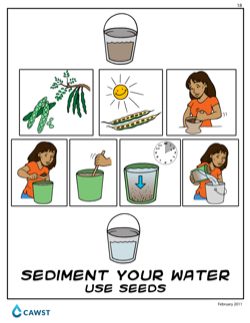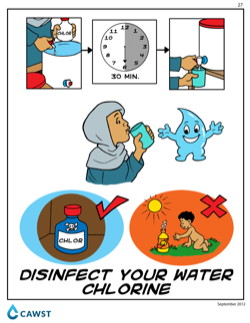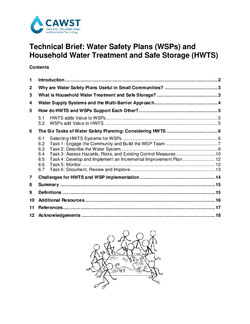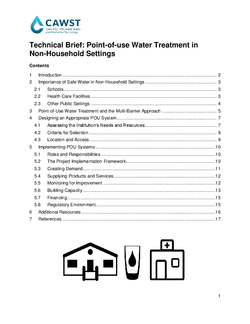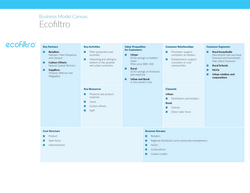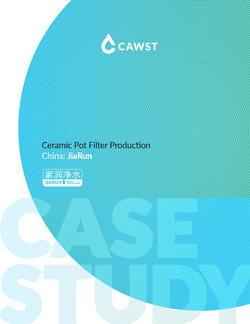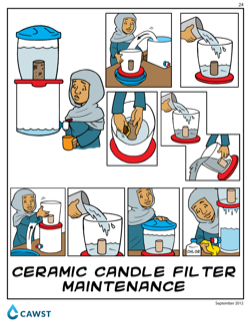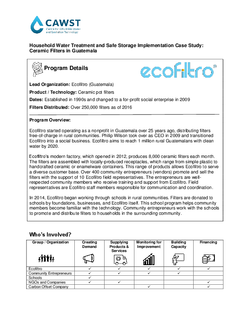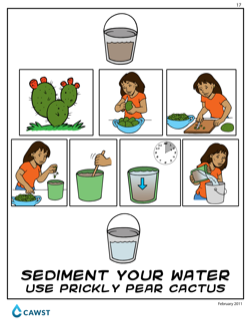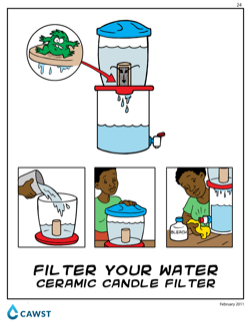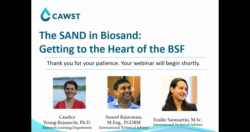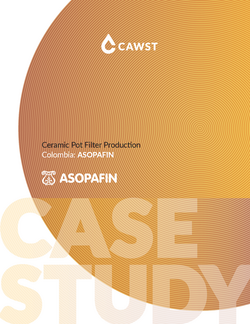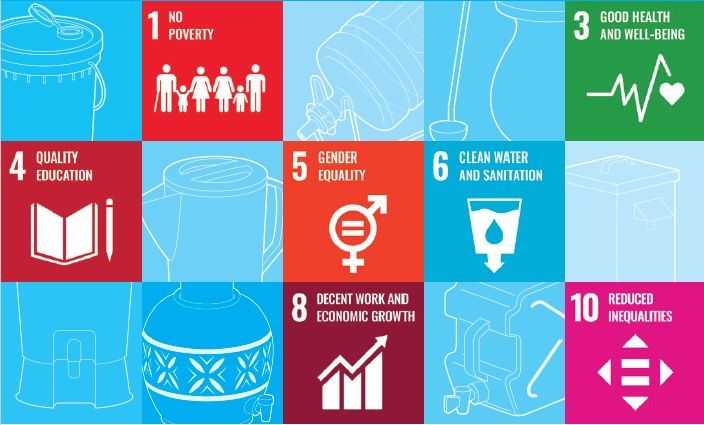Explore Household Water Treatment and Safe Storage
Water Treatment and Safe Storage Community Conversation Guide
A casual, community-based demonstration and discussion to raise awareness about water treatment and safe storage methods.
Languages
English
Amharic
Safe Drinking Water Treatment Options Posters
This simple poster depicts various household water treatment options for families.
Languages
English
Amharic
Safe Storage Poster
This poster encourages households to clean their safe storage containers.
Languages
English
Amharic
How to Clean Your Safe Water Storage Container
This poster outlines six simple steps for cleaning your safe water storage container.
Languages
Amharic
English
Household Water Treatment Technologies: Sanitary Inspection Forms
Use these sanitary inspection forms to evaluate actual and potential sources of contamination for different household water treatment technologies.
Languages
English
Thai
Spanish
French
Khmer
Boiling Fact Sheet
This simplified fact sheet describes disinfection of drinking water by boiling.
Languages
English
Spanish
French
Khmer
Sanitary Inspection Form: Boiling and Pasteurisation
This sanitary inspection form is used to evaluate potential sources of contamination and helps identify risks in boiling practices, equipment, storage, and everyday usage.
Languages
English
Sanitary Inspection Form: Household Slow Sand Filters
This sanitary inspection form is used to evaluate actual and potential sources of contamination for a household slow sand filter.
Languages
English
Thai
How to Clean a Safe Water Container Poster
This poster, developed as part of the Global Affairs Canada (GAC) project, is a practical guide for cleaning and disinfecting safe water storage containers.
Languages
English
Amharic
Settling Fact Sheet
This fact sheet describes sedimentation of drinking water using natural settling.
Languages
French
Spanish
English
Khmer
Natural Coagulants Fact Sheet
This fact sheet describes sedimentation of drinking water using natural coagulants.
Languages
English
Spanish
French
Khmer
Chemical Coagulants Fact Sheet
This fact sheet describes sedimentation of drinking water using chemical coagulants.
Languages
Spanish
French
English
Khmer
Straining Fact Sheet
This fact sheet describes filtration of drinking water by straining through a cloth.
Languages
English
French
Spanish
Khmer
Ceramic Pot Filter Fact Sheet
This fact sheet describes filtration of drinking water using a ceramic pot filter.
Languages
French
English
Spanish
Khmer
Concrete Biosand Filter Fact Sheet
This fact sheet describes filtration of drinking water using a concrete biosand filter.
Languages
French
English
Spanish
Khmer
Biosand Filter Construction Manual Adaptations
Resources adapted from the BSF Construction Manual
Languages
Nepali
Khmer
Burmese
kar
Thai
Biosand Filter Installation Monitoring Form
This simple checklist can be used by implementers installing biosand filters to ensure that the filter is in good condition and is installed correctly
Languages
Khmer
Source Water Protection
What influences the quality of water sources? How do you identify the best possible water source for your household or the households you serve? Be a WASH detective to find key sources of contamination and how to prevent them.
Languages
English
French
Spanish
How does the biosand filter remove pathogens from water? - Thai
This poster depicts the various methods in which pathogens are removed from water inside the biosand filter. This poster was created in Thai by Rain Tree Foundation
Languages
Thai
What is a biosand filter? - Thai
This poster gives an overview of what a biosand filter is, and how it works. Poster created in Thai by Rain Tree Foundation.
Languages
Thai
Safe Water Storage Poster - Thai
Learn how to store water safely to prevent recontamination of treated water. Poster created in Thai by Rain Tree Foundation
Languages
Thai
Learn About Water Treatment and Water Testing for Drinking Water Quality
A collection of short e-learning tools and job aids to help humanitarian and development workers test the quality of drinking water under field conditions.
Languages
English
French
Spanish
Arabic
Portuguese
Water-Related Disease Cards
These disease cards give an overview of the distribution, cause, symptoms, prevention, and treatment of common water-related diseases.
Languages
Spanish
English
French
Arabic
Household Water Treatment and Safe Storage Fact Sheets
This document contains all of CAWST's one-page fact sheets about Household Water Treatment and Safe Storage (HWTS) products and technologies.
Languages
English
Spanish
French
Arabic
Competency Frameworks
This collection of competency frameworks can be used by individuals and organizations in two main ways: Assess job performance and compare it against defined standards Identify potential areas for professional development to improve overall performance Competencies are the abilities required to perform specific tasks and express specific knowledge. CAWST’s competency frameworks use behavioural or task-based competencies in combination with knowledge components.
Languages
Spanish
French
English
Household Water Treatment and Safe Storage Trainer Manual
This manual is for trainers who are interested in delivering training on Household Water Treatment and Safe Storage. It includes lessons plans and guidance on training delivery.
Languages
French
Spanish
English
Hindi
Sediment Your Water Let it Settle
Natural settling can be used to help remove sediment from your water.
Languages
Khmer
English
Spanish
French
Swahili
Haitian Creole
Wayuu
Protect Your Treated Water
Using a safe storage container and cleaning it regularly will protect your treated water.
Languages
Khmer
Spanish
French
English
Swahili
Haitian Creole
Wayuu
Accelerating informed WASH behavior: A participatory community learning guide
This manual promotes sustainable practices through sensitization while addressing the challenges faced by community in WASH.
Languages
English
Hindi
WASH development in School
This manual equips school management and staff with the knowledge to instill WASH concepts among students.
Languages
English
Hindi
Safe Water Storage and Handling - Lesson Plan (CWP)
This lesson focuses on keeping water safe from re-contamination. It covers safe storage, as well as safe handling of clean water.
Languages
English
Arabic
French
Spanish
SODIS - Lesson Plan (CWP)
This lesson focuses on the use of SODIS to treat water. This lesson will also focus on how a Community WASH Promoter can verify that a household is using SODIS correctly, consistently, and continually.
Languages
English
Arabic
French
Spanish
Chlorine - Lesson Plan (CWP)
In this lesson, participants study how to use chlorine to treat their drinking water. This lesson will also focus on how a Community WASH Promoter can verify that a household is using chlorine correctly, consistently, and continually.
Languages
English
Arabic
Spanish
French
Ceramic Pot Filter - Lesson Plan (CWP)
In this lesson, participants will study how to use and maintain a ceramic pot filter. This lesson will also focus on how a Community WASH Promoter can verify that a household is using a ceramic pot filter correctly, consistently, and continually.
Languages
English
Arabic
Spanish
French
Ceramic Candle Filter - Lesson Plan (CWP)
In this lesson, participants will study how to use and maintain a ceramic candle filter. This lesson will also focus on how a Community WASH Promoter can verify that a household is using their filter correctly, consistently, and continually.
Languages
English
Arabic
Spanish
French
BSF - Lesson Plan (CWP)
In this lesson, participants will look at how to use and maintain a biosand filter. This lesson will also focus on how a Community WASH Promoter can verify that a household is using their filter correctly, consistently, and continually.
Languages
English
Arabic
Spanish
French
Multi-Barrier Approach - Lesson Plan (CWP)
In this lesson, participants explore how households can use the multi-barrier approach to ensure they are drinking safe water. The lesson will cover source protection, sedimentation, filtration, disinfection, and safe storage
Languages
English
Arabic
French
Spanish
How Water gets Contaminated - Lesson Plan (CWP)
Participants will explore how water gets contaminated by building a model of a watershed and discussing the impact of agriculture, industry, poor sanitation, and pollution on water quality. They will discuss how human activities are causes of water contamination.
Languages
English
Arabic
French
Spanish
Community WASH Promotion (CWP) Workshop
These workshop materials contain the resources for the Community WASH Promotion workshop. The role of the Community WASH Promoter is essential for the successful implementation of any household water treatment, sanitation, or hygiene (WASH) project. Through this workshop, participants will gain a clear understanding of the best practices for supporting community members in changing their behaviours of WASH practices with the aim of achieving improved community livelihoods.
Languages
English
Spanish
French
Arabic
Hindi
nt
HWTS Technology Applicability Framework (TAF)
If you aim to improve health through safe water, choosing the right HWTS technology for your community is key. Learn who to consult in your community before implementing a new technology and why it's important.
Languages
English
Spanish
French
Six Essential Components for the Implementation of HWTS Initiatives
The implementation of household water treatment and safe storage (HWTS) solutions aims to ensure water quality at the final point of use. Learn about the six essential components of HWTS initiatives and why they’re important.
Languages
English
French
Spanish
Learn About Household Water Treatment
Wondering how you can provide safe drinking water in homes, schools and clinics in your community? Household Water Treatment and Safe Storage (HWTS) is a simple and effective solution. Find all the basics to get started here!
Languages
English
Spanish
French
Arabic
Hindi
Correct, Consistent and Continued Use of HWTS
If you aim to improve health through safe water, correct, consistent, and continued use of HWTS is key. Learn why it's important to drink safe water every day!
Languages
English
Spanish
French
Dilutions
At the end of this module, you will be able to discuss the importance of diluting water samples and to calculate a Dilution Factor.
Languages
Spanish
English
French
Chlorine
In this unboxing video, you'll discover how to use chlorine to make your water safe to drink.
Languages
English
Spanish
HWTS Program Design Trainer Manual
This Trainer Manual is for people who organize and facilitate workshops about Household Water Treatment and Storage Program Design. The lesson/module plans and accompanying materials should be adapted by the trainer to the needs of the workshop participants and the context of the country where the participants work.
Languages
English
Aspects of Drinking Water Quality
Learn to identify different types of pathogens, and to describe microbiological indicator organisms. Also examine the impacts of priority chemicals on drinking water.
Languages
Spanish
English
French
Household Water Treatment and Safe Storage Workbook (HWTS)
This handout helps participants organize ideas, record notes, and answer questions throughout the HWTS workshop. It includes a self-assessment table, graphic organizers, and an action planning page. Participants can take this workbook home with them at the end of the workshop, to help them remember what they learned and what they committed to do with their new knowledge and skills.
Languages
Spanish
French
English
Household Water Treatment and Safe Storage Workshop
This collection contains the resources for both trainers and participants for the Household Water Treatment and Safe Storage workshop. This two to three day workshop provides an introduction to drinking water quality, the Multi-Barrier Approach to safe drinking water, household water treatment and safe storage (HWTS) options, behaviour change, and implementation best practices. The intended participants are people responsible for making decisions about HWTS selection and implementation.
Languages
French
Spanish
English
Arabic
Hindi
Household Water Treatment and Safe Storage Workshop Certificate Template (A4)
These certificate templates can be used for participants upon completing the Household Water Treatment and Safe Storage Workshop.
Languages
English
French
Spanish
Household Water Treatment and Safe Storage Workshop Certificate Template (Letterbox)
These certificate templates can be used for participants upon completing the Household Water Treatment and Safe Storage Workshop.
Languages
English
French
Spanish
Cholera Prevention Poster
This poster was created by the Haitian government using CAWST's images to educate people about how to prevent cholera.
Languages
Spanish
Haitian Creole
French
English
Household Water Treatment and Safe Storage Case Studies
Discover how other people run their HWTS projects, what works and what they would change if they could by checking out the following case studies and resources.
Languages
English
French
Spanish
Regulatory Changes to Enable Household Water Treatment, Colombia
This video outlines regulatory changes made by the Government of Colombia to enable Household Water Treatment as a method to acheive more universal access to safe drinking water.
Languages
English
HWTS Implementer Insights, HWTS learning exchange, Colombia
This video from an HWTS learning exchange in Colombia, 2019, provides a lot of inspiration and insights from participants as they share their experiences implementing HWTS programs.
Languages
English
Biosand Filter Case Study, Jerjet, La Guajira, Colombia
Learn more about this Biosand Filter Project in Colombia.
Languages
English
Biosand Filter Case Study, Viota, Cundinamarca Colombia
Learn more about this Biosand Filter Project in Colombia.
Languages
English
Stakeholder Analysis Template
A stakeholder analysis is a working document that you start at the beginning of every project and update periodically.
Languages
English
Arabic
French
Spanish
Capacity Development Needs Assessment Toolkit
This capacity development needs assessment Toolkit will support the program to analyze their programs different stakeholders.
Languages
English
Arabic
Spanish
French
Capacity Development Needs Analysis
Capacity is developed on three different levels — individual, organizational, and enabling environments. These instructions will support the program team.
Languages
English
Arabic
French
Spanish
Stakeholder Analysis Instructions
Stakeholder analysis allows program teams to gather information to determine whose interests, priorities, and goals should be considered for a WASH program.
Languages
English
Arabic
French
Spanish
PESTLE Context Assessment Guide
A PESTLE analysis is a form of formative research that allows a program to identify and analyze factors that are or could impact the program.
Languages
English
Arabic
French
Spanish
PESTLE Analysis template
This PESTLE analysis template identifies the factors that could impact the program and provides the space to document the findings.
Languages
English
Arabic
French
Spanish
Logic Framework for Monitoring and Evaluation
This logic framework for monitoring and evaluation is essential to ensuring impact in any program. Ensuring sustainable program goals and behaviours.
Languages
English
Arabic
French
Spanish
Approaches to WASH Program Design
Approaches to program design provides examples of approaches or activities that can be used to create demand to engage with stakeholders.
Languages
English
Arabic
French
Spanish
Data Collection Methods and Tools
Data Collection Methods is a tool to support program design teams with formative research during the analysis phase and throughout their program.
Languages
English
Arabic
French
Spanish
Water-Related Disease Cards
These disease cards give an overview of the distribution, cause, symptoms, prevention, and treatment of common water-related diseases.
Languages
Spanish
English
French
Arabic
Household Water Treatment Program Design Job Aids
This collection includes job aids that will help you to design, implement, monitor and evaluate your household water treatment program. These practical resources are easy to use and include tools and templates for budgeting, reporting, needs assessment, gap analysis and more.
Languages
English
French
Spanish
Arabic
Program Report Template
This report template offers one example of what a report could include. The following reporting structure may be a useful guide.
Languages
English
Arabic
French
Spanish
Program Reporting Guide
This program reporting guideline supports program teams in reporting essential data, updates and changes. Information was selected from a variety of sources.
Languages
English
Arabic
French
Spanish
Community WASH needs Assessment Survey
A water hygiene and sanitation needs assessment is a review process for determining and addressing essential WASH needs/discrepancies of a community or population.
Languages
English
Arabic
French
Spanish
Community WASH needs Assessment Guide
A water hygiene and sanitation needs assessment guide reviews the basic WASH needs/discrepancies between the current condition and the wanted or required status.
Languages
English
French
Spanish
Arabic
Behaviour Change Needs Assessment
This tool aims to help your program with its formative research by defining the behaviour it wants to change and supporting the program team to gather information.
Languages
English
Spanish
French
Arabic
Lessons Learned Instructions and Template
Lessons learned are an opportunity to reflect on activities or interventions and appreciate what worked well and should be kept or what could be improved.
Languages
English
Arabic
French
Spanish
Gap Analysis Instructions and Template
The gap analysis is used to assist with identifying both the desired or expected state and practices and the current state and practices.
Languages
English
Arabic
French
Spanish
GANTT chart Template
The GANTT chart template provides program designers and managers a visual understanding of a program's tasks and overall schedule spanning the program’s duration.
Languages
English
Arabic
Spanish
French
Program Budgeting Tips
A budget is a communication and planning tool essential for the effective design of any program. This Budgeting Tips Guide supports program design teams.
Languages
English
Arabic
French
Spanish
Budget Template by Activity
This budget template is created as an activity budget. Activity budgets separate the program into smaller groups of activities.
Languages
English
French
Spanish
Arabic
Technology Talks
In this series of unboxing videos, you will discover methods to make your water safe to drink.
Languages
English
Spanish
Hydraid Biosand Filter Fact Sheet
This fact sheet describes filtration of drinking water using a Hydraid biosand filter.
Languages
English
Spanish
French
Interpreting Results
Interpreting data is an important part of drinking water quality testing. You need to know how to make basic conclusions and recommendations, and to identify common errors in recording DWQT data. This module will help you acquire those skills.
Languages
Spanish
English
French
How to use a pool test kit
This tool teaches you step-by-step how to use a pool test kit to measure pH, free chlorine and total chlorine. It also includes troubleshooting tips.
Languages
Spanish
English
French
Microbiological Testing Methods
Learn to identify and evaluate different microbiological testing methods.
Languages
Spanish
English
French
Concentration and Unit Conversions
Are you confused about figuring out concentration and what units to use in water quality testing? This tool will help you make sense of it all, and will let you practice your unit conversion skills.
Languages
Spanish
English
French
HWTS Program Design Workshop
This collection contains the resources for both trainers and participants for the Household Water Treatment and Safe Storage Program Design workshop. The intended participants are people responsible for making decisions about HWTS program design and implementation.
Languages
English
Spanish
French
The Multibarrier Approach to Safe Drinking Water
How do you prevent and treat contaminated drinking water? Learn about the multi-barrier approach to ensure that water is safe to drink.
Languages
English
French
Spanish
Selecting a Drinking Water Container for Household Use
Are you providing households with the best drinking water container possible? Use this checklist to evaluate which type of container is best for your situation and learn how to properly clean the most common drinking water containers.
Languages
English
Spanish
French
Arabic
The Multi-Barrier Approach to Safe Drinking Water
This technical brief describes the multi-barrier approach to safe drinking water. It lists the most common causes of contamination at the source, during transportation and during storage. It also describes actions you or the community you work with can take to improve drinking water safety. These include practices for source protection, safe water transportation, household water treatment, and safe storage.
Languages
English
Spanish
French
Safe Water Transportation
In this interactive module, learn how to ensure water stays safe on its journey from the source to its point of use.
Languages
English
French
Spanish
Store Your Treated Water Safely
Treated water should be stored properly to keep it safe (good and bad storage containers).
Languages
English
French
Haitian Creole
Swahili
Spanish
Khmer
Safe Water Storage - Lesson Plan (Intro to WASH)
This lesson will discuss the importance of safe storage of water and characteristics of a safe storage container.
Languages
English
Safe Storage and Handling - Lesson Plan (HWTS)
In this lesson, participants explain why safe storage and handling of water is important. They brainstorm and demonstrate safe handling and storage practices.
Languages
English
French
Spanish
Get Good Water
You can have good water if you from protect the water source, treat your water and store your treated water safely.
Languages
English
Spanish
Swahili
French
Haitian Creole
Aseptic Practices for Water Sample Collection
Learn about the best practices and sanitary methods that limit errors and prevent secondary or cross contamination when collecting water samples for testing.
Languages
Spanish
English
Multi-Barrier Approach - Lesson Plan (Intro to WASH)
In this lesson participants discuss how to treat unsafe water at the household level. They will discuss the different steps of the Multi Barrier Approach (MBA) and will discover the different technology options, their availability and effectiveness for each step.
Languages
English
Water Contamination - Lesson Plan (Intro to WASH)
Participants explore the different ways that water can become contaminated, diseases caused by water contaminants, and explain the different types of pathogens.
Languages
English
Safe and Unsafe Water - Lesson Plan (Intro to WASH)
Participants explore the different ways to access safe water and discuss unsafe water points that require treatment before drinking.
Languages
English
Update of Design and Best Practices of an Intermittently Operated Slow Sand Filter - ISSF
In 2011 Samaritan’s purse, in Cambodia, utilized slow sand filtration and BSF principles to develop a filter appropriate for institutional scale use, such as that of schools. In 2012 a standard design was developed and subsequently a performance study was conducted in 2014 affirming the efficacy of the design principles in E.coli removal. Since then, Samaritan’s purse has continued to adapt the standard design in multiple contexts in 8 countries around the world to address biological contamination. In January 2017, Samaritan’s Purse in partnership with CAWST, published “Technical Manual: Intermittently Operated Slow Sand Filtration (iSSF) System” to be used by implementers wanting to use the design. Samaritan’s Purse has surveyed its field staff to provide updated insight on field adaptations of the technology and in this session will reintroduce basic design principles as alignment with the published manual as well as applicable insight gleaned since the January 2016 webinar hosted by CAWST.
Languages
English
Business Model Canvas: The Safe Water Project
The Business Model Canvas is a one page business plan that clearly sets out the nine key elements you need to consider in planning your business. The Business Model Canvas was created in 2010 by Osterwalder and Pigneur. This canvas describes The Safe Water Project's market-based approach to deliver biosand filters and bottle refilling services to consumers in South Sudan, Uganda, and Kenya.
Languages
Spanish
English
French
Business Model Canvas: Aqua Clara Kenya
The Business Model Canvas is a one page business plan that clearly sets out the nine key elements you need to consider in planning your business. The Business Model Canvas was created in 2010 by Osterwalder and Pigneur. This canvas describes Aqua Clara Kenya's market-based approach to deliver biosand filters and membrane filters, handwashing and safe water storage containers to consumers in Kenya.
Languages
English
Spanish
French
Preparing Construction Materials Video
Part 1 of a video series on how to build a biosand filter (BSF). It demonstrates how to sieve and sort gravel and sand to maintain consistent quality during construction of a BSF.
Languages
English
Mechanical Sand Screening Video
Part of a video series on how to build a biosand filter (BSF). It demonstrates how to sieve and sort gravel and sand using a mechanical sand sorter to ease the work load when preparing construction materials to build a BSF.
Languages
English
Installing Alternate BSF Containers Video
Part of a video series on how to build a biosand filter (BSF). It outlines how to install alternative BSF filter designs.
Languages
English
Drinking Water Quality Testing in BSF Implementation
This video interview explores why to use Drinking Water Quality Testing (DWQT) when implementing a Biosand Filter (BSF) project. The interview with experienced BSF implementers includes Lalit Sharma of Sehgal Foundation (India), Elijah Mutafya of Seeds of Hope International Partnership (Zambia) and Suneel Rajavaram of CAWST (Canada) sharing their experiences using DWQT in support of their BSF projects.
Languages
English
Mixing the Concrete Video
Part of a video series on how to build a biosand filter (BSF). It outlines how to correctly mix the concrete before pouring the BSF body. It includes tips and tricks to get the right concrete consistency to get a strong filter body with a smooth, even surface.
Languages
English
Preparing the Mold Video
Part of a video series on how to build a biosand filter (BSF). It outlines how to clean and oil a BSF mold and to install the outlet tube before pouring the concrete container to achieve a smooth, trouble free concrete filter body.
Languages
English
Steel Mold Properties Video
Part of a video series on how to build a biosand filter (BSF). It oulines what to look for in a BSF steel mold. It includes tips and valuable information about the properties of a mold for the successful construction of a BSF concrete filter body.
Languages
English
Installing a Concrete BSF Container Video
Part of a video series on how to build a biosand filter (BSF). It outlines how to correctly install a concrete BSF with layers of gravel and sand and how to check the flowrate.
Languages
English
Wash Separation and Drainage Gravel Video
Part of a video series on how to build a biosand filter (BSF). Find out how to correctly wash the separation and drainage gravel layers used for installing the filters.
Languages
English
Pouring the Filter Video
Part of a video series on how to build a biosand filter (BSF). It shows step by step how to pour the concrete into the mold to avoid air pockets and to eliminate cracks between the concrete layers.
Languages
English
Demolding the Filter Video
Part of a video series on how to build a biosand filter (BSF). Learn step by step how to remove a concrete biosand filter (BSF) from a steel mold. Learn tips to make demolding the filter easier and to prevent damage or cracks.
Languages
English
Pouring the Filter with Wet and Dry Concrete Mixes Video
Part of a video series on how to build a biosand filter (BSF). It shows the pitfalls of using too wet and too dry concrete mixtures when pouring a BSF concrete filter body.
Languages
English
Sediment and Disinfect Your Water
Some products treat your water by sedimenting and disinfecting your water at the same time.
Languages
English
Swahili
Spanish
French
Biosand Filter Competencies - Sand
This competency assessment tool was designed by CAWST to measure and guide the professional development of BSF Technicians in the area of sand.
Languages
English
French
Spanish
Biosand Filter Competencies - Box
This competency assessment tool was designed by CAWST to measure and guide the professional development of BSF Technicians in the area of box construction.
Languages
English
Spanish
French
Biosand Filter Competencies - Installation
This competency assessment tool was designed by CAWST to measure and guide the professional development of BSF Technicians in the area of installation.
Languages
English
Spanish
French
Chlorine Disinfection of Household Drinking Water
This technical brief describes different types of chlorine products available for household water disinfection, and how chlorine inactivates microorganisms in water. It provides guidelines for chlorine use, including safety considerations and methods for calculating appropriate doses.
Languages
Spanish
English
French
SODIS Implementation in Uganda by Water School Uganda (WSU)
This case study describes Water School Uganda (WSU)'s implementation of SODIS in Uganda.
Languages
Spanish
French
English
Membrane Filters for Household Water Treatment
This technical brief explains what membrane filters are and how they work. It shows different types of household membrane filters, by pore size, membrane configuration, and container setup. It lists and describes criteria to consider when evaluating whether a membrane filter is appropriate for your context. Finally, it introduces some limitations you should be aware of before using household membrane filters.
Languages
Spanish
French
English
Chlorine Solution Implementation by ENPHO and EcoConcern in Nepal
This case study describes ENPHO and EcoConcern's implementation of Piyush chlorine solution in Nepal.
Languages
Spanish
English
French
Introduction to Drinking Water Quality for Household Water Treatment Implementers
This technical brief describes four aspects of drinking water quality: microbiological, chemical, radiological, and acceptability. It gives an overview of the sources, impacts, and household-level treatment options for common microbiological and chemical contaminants. It also discusses factors that affect the acceptability (taste, smell, appearance) of drinking water.
Languages
Spanish
French
English
Selecting Household Water Treatment and Safe Storage (HWTS) Options
This technical brief gives some steps you can follow to identify, evaluate, and test household water treatment and safe storage (HWTS) options with your potential user group. It describes criteria you can use to assess the appropriateness of different HWTS options for your context. It also explains why HWTS selection should take place within a multi-barrier approach to safe drinking water.
Languages
Spanish
English
French
Safe Drinking Water and the Global Development Agenda
This technical brief defines safe drinking water and describes why it is necessary. It discusses some of the most important global goals, declarations, and approaches that have influenced the global agenda for safe drinking water (for example, Millennium Development Goals, water safety planning, the human right to water, and the Sustainable Development Goals). It also briefly describes how household water treatment and safe storage (HWTS) can contribute to the global agenda for safe drinking water.
Languages
French
Spanish
English
Implementation of Household Water Treatment and Safe Storage (HWTS)
This technical brief lists six key components of household water treatment and safe storage (HWTS) initiatives, describes why each component is important, and gives examples of ways in which these components can be addressed by HWTS implementers.
Languages
French
English
Spanish
Treat Your Water
Contaminated water can be treated to make it safe (sedimentation, filtration, disinfection).
Languages
English
Khmer
Swahili
French
Haitian Creole
Spanish
Filtration Method: Cloth Filter
How well does cloth filtration work? Learn about the advantages and limitations of using a cloth filter in a point-of-use water treatment system.
Languages
English
Spanish
French
Filtration Method: Ceramic Pot Filter
Explore the advantages and limitations of using a ceramic pot filter in a point-of-use water treatment system.
Languages
English
Spanish
French
Filtration Method: Ceramic Candle Filter
Considering ceramic candle filters for your point-of-use water treatment system? Learn about their advantages and limitations, in this module.
Languages
English
Spanish
French
Filtration Method: Biosand Filter
Why would you use a biosand filter in a point-of-use water treatment system? Learn about the strengths and limitations of the Biosand filter.
Languages
English
Spanish
French
Filtration Method: Membrane Filter
What are the benefits and drawbacks of using a membrane filter? Learn about using a membrane filter in a point-of-use water treatment system.
Languages
English
Spanish
French
Disinfection Method: SODIS
How well does solar disinfection work? Learn about the advantages and limitations of using a clear bottle placed in the sun to disinfect drinking water.
Languages
English
Spanish
French
Sedimentation Method: Natural Coagulants
Why would you choose a natural coagulant for sedimentation? Learn about their advantages and limitations as a method of sedimentation in a point-of-use water treatment system, in this module.
Languages
English
French
Spanish
Sedimentation Method: Chemical Coagulants
Learn about the advantages and limitations of using chemical coagulants as a method of sedimentation in a point-of use water treatment system.
Languages
English
French
Spanish
Sedimentation Method: Settling
Learn about the advantages and limitations of using settling as a method of sedimentation in a point-of-use water treatment system.
Languages
English
French
Spanish
Safe Drinking Water Storage and Handling
How do you keep your treated water safe? Learn about how to prevent water from becoming recontaminated during storage and handling.
Languages
English
French
Spanish
Disinfection for Safe Drinking Water
Water disinfection techniques are capable of destroying microbes without harming humans. Learn how they can be used as part of an HWTS system.
Languages
French
English
Spanish
What is Household Water Treatment and Safe Storage (HWTS)?
Learn about how to use household water treatment and safe storage (HWTS) as an option to improve access to clean drinking water. HWTS allows people to treat their water where it is consumed, such as in the home, in schools, or in health centres, which is why it is referred to as a “point-of-use treatment."
Languages
English
Spanish
French
Filtration for Safe Drinking Water
What do you need to consider when selecting filtration technologies? To start, we’ll explore the needs and preferences of the user, contamination risks in the water source, performance, affordability, and ease of use.
Languages
English
Spanish
French
Sedimentation for Safe Drinking Water
You want to treat your water, but what could be your first step? Learn why sedimentation can be a crucial first treatment step in Household Water Treatment and Safe Storage. Discover different ways to reduce the turbidity of water.
Languages
English
French
Spanish
Front End (HWTS-Program Design)
This is a section of the manual for trainers who are interested in delivering training on HWTS Program Design. It includes agendas, and guidance on training delivery. It does not include lesson plans or appendices.
Languages
English
Cover (HWTS-Program Design)
This is the cover of the trainer manual for HWTS Program Design Workshop.
Languages
English
Appendix 3 - Participant Workbook (HWTS-Program Design)
Appendix 3 of the HWTS Program Design Trainer Manual includes the Participant Workbook that is used throughout the training.
Languages
English
Appendix 1 - Daily Opening and Closing Activities (HWTS-Program Design)
Appendix 1 of the HWTS Program Design Trainer Manual includes instructions for daily opening and closing review activities.
Languages
English
Workshop Closing - Lesson Plan (HWTS-Program Design)
In this lesson participants will evaluate how their knowledge of HWTS Program Design has changed over the workshop. Participants will take time to create a personal action plan for continued learning and application, and they will complete a workshop evaluation.
Languages
English
Monitoring - Lesson Plan (HWTS-Program Design)
This lesson outlines why monitoring is critical for all HWTS programs and outlines different monitoring activities and indicators.
Languages
English
Finances - Lesson Plan (HWTS-Program Design)
This lesson introduces the different costs of an HWTS program, both obvious and unexpected. Participants will explore various funding and financing models.
Languages
English
Capacity Development - Lesson Plan (HWTS-Program Design)
This lesson introduces the role of capacity development in HWTS programs. Participants practice conducting a capacity needs assessment and selecting appropriate capacity development activities.
Languages
English
Demand Creation - Lesson Plan (HWTS-Program Design)
This lesson emphasizes the importance of demand creation in successful HWTS programs and the key linkage between understanding behavioural factors and demand creation strategies.
Languages
English
Products and Services - Lesson Plan (HWTS-Program Design)
This lesson introduces participants to the concepts of HWTS products, services and supply chains. It elaborates of the complex contextual considerations required when selecting HWTS technologies.
Languages
English
Stakeholder Engagement - Lesson Plan (HWTS-Program Design)
This lesson introduces participants to the process of identifying, analyzing and engaging with the different stakeholders that could be involved in a HWTS program.
Languages
English
Understanding Behaviour - Lesson Plan (HWTS-Program Design)
This lesson introduces the impact of behavioural factors in program design. Participants will learn about the behavioural factors of Risk, Ability, Norms, Attitude and Self-Regualtion (RANAS) and how behavioural factors should be considered in setting programatic goals.
Languages
English
Panau Village Mystery - Lesson Plan (HWTS-Program Design)
This lesson introduces a fictional village called Panau, participants will learn about the village and their water treatment challenges and practice identifying overall program goals.
Languages
English
ADDIM Introduction - Lesson Plan (HWTS-Program Design)
This lesson introduces the importance of a program design framework. Participants will learn about the different stages of the ADDIM model and how they relate to program design workflow.
Languages
English
Workshop Introduction - Lesson Plan (HWTS-Program Design)
This lesson opens the workshop and sets the tone for the training and learning environment by using a variety of participatory activities. Participants have an opportunity to meet the trainer, host organization and other participants, as well as create their ground rules for how they are expected to work together during the workshop. The trainer has the opportunity to better understand the participant’s background, assess their knowledge and skills, and determine their learning expectations.
Languages
English
Household Water Treatment and Safe Storage Workshop Report Template (HWTS-Program Design)
This is a workshop report template that will guide you in writing a professional report of your Household Water Treatment and Safe Storage Program Design Workshop.
Languages
English
Spanish
French
HWTS Program Design Certificate Template (HWTS-Program Design)
These certificate templates can be used for participants upon completing the Household Water Treatment and Safe Storage Program Design Workshop.
Languages
English
Spanish
French
Household Water Treatment and Safe Storage Workshop Agendas
These four agendas provide suggestions for how trainers can structure their HWTS workshops, with options ranging from 2 days to 3.5 days. Lesson plans and training resources can be found in the Household Water Treatment and Safe Storage Workshop Toolkit.
Languages
Spanish
French
English
Household Water Treatment and Safe Storage Workshop Outline
This workshop outline contains a workshop description, objectives, audience, content and training materials needed for this workshop
Languages
English
French
Spanish
Monitoring (HWTS-Program Design)
This presentation accompanies HWTS Program Design Lesson Plan: Monitoring
Languages
English
Finances (HWTS-Program Design)
This presentation accompanies HWTS Program Design Lesson Plan: Finances
Languages
English
Capacity Development (HWTS-Program Design)
This presentation accompanies HWTS Program Design Lesson Plan: Capacity Development
Languages
English
Demand Creation (HWTS-Program Design)
This presentation accompanies HWTS Program Design Lesson Plan: Demand Creation
Languages
English
Products and Services (HWTS-Program Design)
This presentation accompanies HWTS Program Design Lesson Plan: Products and Services
Languages
English
Stakeholder Engagement (HWTS-Program Design)
This presentation accompanies HWTS Program Design Lesson Plan: Stakeholder Engagement
Languages
English
Understanding Behaviour (HWTS-Program Design)
This presentation accompanies HWTS Program Design Lesson Plan: Understanding Behaviour
Languages
English
Introduction to the ADDIM model (HWTS-Program Design)
This presentation introduces learners to the ADDIM Program Design theory. (Designed for Lesson Plan: ADDIM Introduction)
Languages
English
Workshop Introduction (HWTS-Program Design)
This presentation introduces learners to the HWTS Program Design workshop. (Designed for Lesson Plan: Workshop Introduction)
Languages
English
Chlorine Dosing Presentation (HWTS)
This presentation is for use with “Lesson Plan: Chlorine Dosing” in the Household Water Treatment and Safe Storage (HWTS) Trainer Manual
Languages
English
Spanish
French
Safe Drinking Water Presentation (HWTS)
This presentation is for use with “Lesson Plan: Safe Drinking Water” in the Household Water Treatment and Safe Storage (HWTS) Trainer Manual.
Languages
Spanish
French
English
Global Agenda for Safe Drinking Water Presentation (HWTS)
This presentation is for use with “Lesson Plan: Global Agenda for Safe Drinking Water” in the Household Water Treatment and Safe Storage (HWTS) Trainer Manual
Languages
French
Spanish
English
Water Quality Testing Presentation (HWTS)
This presentation is for use with “Lesson Plan: Water Quality Testing” in the Household Water Treatment and Safe Storage (HWTS) Trainer Manual
Languages
Spanish
French
English
Selecting HWTS Options Presentation (HWTS)
This presentation is for use with “Lesson Plan: Selecting HWTS Options” in the Household Water Treatment and Safe Storage (HWTS) Trainer Manual
Languages
Spanish
French
English
HWTS - What is it and When is it Effective Presentation (HWTS)
This presentation is for use with “Lesson Plan: HWTS (What Is It and When Is It Effective?)” in the Household Water Treatment and Safe Storage (HWTS) Trainer Manual
Languages
English
French
Spanish
Membrane Filters Presentation (HWTS)
This presentation is for use with “Lesson Plan: Household Membrane Filters” in the Household Water Treatment and Safe Storage (HWTS) Trainer Manual
Languages
Spanish
English
French
Multi-Barrier Approach Sorting Cards (HWTS)
This activity includes full-page titles and images of different options for protecting water through source protection, safe transportation, sedimentation, filtration, disinfection, and safe storage. These sorting cards are designed to be used for “Sorting Activity: Barriers” in CAWST Lesson Plan: Multi-Barrier Approach.
Languages
English
French
Spanish
HWTS Implementation Presentation (HWTS)
This presentation is for use with “Lesson Plan: HWTS Implementation” in the Household Water Treatment and Safe Storage (HWTS) Trainer Manual
Languages
Spanish
English
French
HWTS Stations Presentation (HWTS)
This presentation is for use with activities within the following lessons in the Household Water Treatment and Safe Storage (HWTS) Trainer Manual: "Lesson Plan: Sedimentation Options," "Lesson Plan: Filtration Options," and "Lesson Plan: Disinfection Options."
Languages
Spanish
French
English
Water Quality Presentation (HWTS)
This presentation is for use with “Lesson Plan: Drinking Water Quality” in the Household Water Treatment and Safe Storage (HWTS) Trainer Manual
Languages
French
English
Spanish
Behaviour Change and HWTS Presentation (HWTS)
This presentation is for use with “Lesson Plan : Behaviour Change and HWTS” in the Household Water Treatment and Safe Storage (HWTS) Trainer Manual
Languages
French
English
Spanish
Water Safety Planning and HWTS Presentation (HWTS)
This presentation is for use with “Lesson Plan: Water Safety Planning and HWTS” in the Household Water Treatment and Safe Storage (HWTS) Trainer Manual
Languages
English
French
HWTS Program Design Workshop Outline
This workshop outline contains a workshop description, objectives, audience, content and training materials needed for this workshop.
Languages
English
Spanish
French
HWTS Program Design Pre-Workshop Questionnaire
This questionnaire helps the trainer to understand their audience and their level of knowledge pre-workshop.
Languages
English
French
Spanish
HWTS Program Design Participant List Template
This participant List template is a tool that will help you keep a database of participant information.
Languages
English
Spanish
French
HWTS Program Design Final Evaluation
This questionnaire is to be handed out at the end of the workshop to give the trainer constructive feedback on the workshop.
Languages
English
French
Spanish
HWTS Program Design Final Evaluation Summary
This is a template of how to display the results of your final evaluations.
Languages
English
Spanish
French
HWTS Program Design Workshop 4-Day Agenda
This is the 4-day agenda as part of the HWTS Program Design Workshop.
Languages
English
French
Spanish
Demand Creation Approaches and Strategies
This handout highlights the most common demand creations strategies used in WASH programs.
Languages
English
Workshop Introduction - Lesson Plan (HWTS)
This lesson opens the workshop and sets the tone for the training and learning environment by using a variety of participatory activities. Participants have an opportunity to meet the trainer, host organization and other participants, as well as create their ground rules for how they are expected to work together during the workshop. The trainer has the opportunity to better understand the participant’s background, assess their knowledge and skills, and determine their learning expectations.
Languages
Spanish
French
English
Household Water Treatment and Safe Storage Final Evaluation
This questionnaire is to be handed out at the end of the workshop to give the trainer constructive feedback on the workshop
Languages
Spanish
French
English
Household Water Treatment and Safe Storage Final Evaluation Summary
This is a template of how to display the results of your final evaluations
Languages
Spanish
French
English
Household Water Treatment and Safe Storage PreWorkshop Questionnaire
This questionnaire helps the trainer to understand their audience and their level of knowledge pre-workshop
Languages
Spanish
French
English
Household Water Treatment and Safe Storage Participant List Template
This participant List template is a tool that will help you keep a database of participant information
Languages
English
French
Spanish
Total Sanitation (3-Day Nepal) Workshop
This workshop is especially designed targeting total sanitation in community. With the whim of attaining open defecation free, the focus is shifted in constructing latrine; the quantitative goal only. However, this workshop is more focused on WASH details and headed to achieve safe water, improved sanitation, proper hygiene and their sustainability. Along with total sanitation, the flavor of delivering effective training adds up more weightage in training, with knowledge enhance the knowledge as well as skill of the trainer.
Languages
English
Learn About Drinking Water Treatment for Emergency Contexts
A collection of short e-learning tools and job aids to help water technicians treat, disinfect and safely handle drinking water under field conditions.
Languages
English
French
Spanish
Arabic
Portuguese
Hindi
Competency Framework for Biosand Filter Technicians
This collection contains the resources to support the professional development needs of our clients and partners in biosand filter quality control. It contains an overview of our competency framework, as well as useful tools to help biosand filter technicians improve their skills. The competency framework includes tools for three different areas: constructing concrete boxes, preparing the filtration sand and gravel, and installing filters.
Languages
Spanish
French
English
Introduction to WASH
This is an introductory level workshop that was co-developed with our partners in Afghanistan at DACAAR. This workshop is for those who are just starting to work in the Water, Sanitation, and Hygiene sector. It covers the basic of WASH which include topics of disease transmission, household water treatment, solid waste management, vector control, sanitation, hygiene, and behaviour change.
Languages
English
Protect Your Family
There are water, sanitation and hygiene practices that will protect your family.
Languages
English
Rainwater Harvesting - Building From the Existing
Explores different ways to access the existing potentials to start or re-start a RWH project
Languages
English
Ceramic Pot Filter
In this unboxing video you'll discover how Ceramic Pot Filters can be used to make your water safe to drink.
Languages
English
Spanish
P&G Purifier of Water Fact Sheet
This fact sheet describes a product for flocculation-disinfection: P&G's Purifier of Water.
Languages
French
Spanish
English
Solar Pasteurization Fact Sheet
This fact sheet describes disinfection of drinking water using solar pasteurization.
Languages
English
French
Spanish
Iron Chemical Fact Sheet
This fact sheet describes the sources of iron in water, health effects, WHO guidelines and treatment options.
Languages
English
Spanish
French
Ceramic Pot Filter Maintenance
Maintain your ceramic pot filter to ensure good quality water.
Languages
English
Khmer
Haitian Creole
French
Spanish
Swahili
Nitrate and Nitrite Chemical Fact Sheet
This fact sheet describes the sources of nitrate and nitrite in water, health effects, WHO guidelines and treatment options.
Languages
French
English
Spanish
Sediment Your Water Use Chemicals
Different chemicals can be used to help remove sediment from your water.
Languages
French
English
Khmer
Swahili
Spanish
Rainfresh MP4U Gravity Filter Fact Sheet
This fact sheet describes filtration of drinking water using the Rainfresh MP4U Gravity Filter (ceramic filter).
Languages
French
Spanish
English
Chemical Fact Sheets
These fact sheets describe the sources of chemicals in water, health effects, WHO guidelines and treatment options.
Languages
English
Spanish
French
Arsenic Chemical Fact Sheet
This fact sheet describes the sources of arsenic in water, health effects, WHO guidelines and treatment options.
Languages
French
Spanish
English
Household Water Treatment and Storage - After the Nepal 2015 Earthquake - Webinar
A video recording of the webinar on December 8, 2015 - Household Water Treatment and Storage - After the Nepal 2015 Earthquake. Arinita Maskey Shrestha and Tai Ring Teh of UNICEF discuss Household Water Treatment implementation in Nepal after the 2015 earthquake.
Languages
English
SODIS Fact Sheet
This fact sheet describes disinfection of drinking water using SODIS (solar disinfection).
Languages
Spanish
French
English
Biosand Filter Fact Sheet
This fact sheet describes filtration of drinking water using a biosand filter.
Languages
English
Spanish
French
Ceramic Candle Filter Fact Sheet
This simplified fact sheet describes filtration of drinking water using a ceramic candle filter.
Languages
English
Spanish
French
Solar Distillation Fact Sheet
This fact sheet describes disinfection of drinking water using solar distillation.
Languages
Spanish
English
French
Lifestraw Fact Sheet
This fact sheet describes filtration of drinking water using a LifeStraw membrane filter.
Languages
Spanish
English
French
Total Dissolved Solids Chemical Fact Sheet
This fact sheet describes the sources of total dissolved solids in water, health effects, WHO guidelines and treatment options.
Languages
English
French
Spanish
Fluoride Chemical Fact Sheet
This fact sheet describes the sources of fluoride in water, health effects, WHO guidelines and treatment options.
Languages
English
Spanish
French
Manganese Chemical Fact Sheet
This fact sheet describes the sources of manganese in water, health effects, WHO guidelines and treatment options.
Languages
Spanish
English
French
Biosand Filter Maintenance
Good maintenance practices of the biosand filter will ensure good quality water.
Languages
English
Swahili
Khmer
French
Spanish
Haitian Creole
Intermittently Operated Slow Sand Filtration (iSSF) Manual
This technical manual, written by Samaritan's Purse Canada and CAWST, is a guide for potential implementers of the intermittently operated slow sand filter (iSSF, also called the school biosand filter). This manual outlines principles and best practices for adapting, installing, commissioning and maintaining the filtration system.
Languages
Spanish
English
French
HWTS and Water Safety Planning - Lesson Plan (HWTS)
In this optional lesson, participants describe the process of water safety planning for small communities. Participants explain how HWTS and water safety planning can add value to each other. The lesson includes a presentation, pair work, and personal reflection.
Languages
French
English
Spanish
Ceramic Candle Filter
In this unboxing video you'll discover how Ceramic Candle Filters can be used to make your water safe to drink.
Languages
English
Spanish
The Biosand Filter
In this unboxing video you'll discover how the Biosand Filter can be used to make your water safe to drink.
Languages
English
Spanish
Cloth Filter
In this unboxing video you'll discover how cloth can be used to strain sand, silt, clay, and some pathogens out of water.
Languages
English
Spanish
Boiling
In this unboxing video you'll discover how boiling can be used to make your water safe to drink.
Languages
English
Spanish
Contamination Cards for Ceramic Candle Filter Promotion in Nepal
These contamination cards were used during a behaviour change intervention to promote the behaviours to purchase, use, and maintain a ceramic candle filter in Nepal. The intervention is called, "Take no chances!"
Languages
nt
Ceramic Candle Filter Promotion in Nepal Affiliation Poster
This poster was used to target the motive "affiliation" during a behaviour change intervention to promote the behaviours to purchase, use, and maintain a ceramic candle filter in Nepal. The intervention is called, "Take no chances!"
Languages
English
Ceramic Candle Filter Poster for Shops and Villages in Nepal
This ceramic candle filter poster for villages and shops was used during a behaviour change intervention to promote the behaviours to purchase, use, and maintain a ceramic candle filter in Nepal. The intervention is called, "Take no chances!"
Languages
English
Ceramic Candle Filter Poster for Health Posts in Nepal
This ceramic candle filter poster for health posts was used during a behaviour change intervention to promote the behaviours to purchase, use, and maintain a ceramic candle filter in Nepal. The intervention is called, "Take no chances!"
Languages
English
Ceramic Candle Filter Instructional Leaflet
This ceramic candle filter instructional leaflet includes basic operation and maintenance information. It was used during a behaviour change intervention to promote the behaviours to purchase, use, and maintain a ceramic candle filter in Nepal. The intervention is called, "Take no chances!"
Languages
English
Ceramic Candle Filter Leaflet
This ceramic candle filter leaflet to select an appropriate filter was used during a behaviour change intervention to promote the behaviours to purchase, use, and maintain a ceramic candle filter in Nepal. The intervention is called, "Take no chances!"
Languages
English
Ceramic Candle Filter Promotion in Nepal Facilitator Diary
This facilitator diary was used during a behaviour change intervention to promote the behaviours to purchase, use, and maintain a ceramic candle filter in Nepal. The intervention is called, "Take no chances!"
Languages
English
Ceramic Candle Filter Promotion in Nepal Facilitator Toolkit
This facilitator (triggerer) toolkit was used for a behaviour change intervention promoting the purchase, use, and maintenance of ceramic candle filter in Nepal. The intervention is called, "Take no chances!"
Languages
English
Ceramic Candle Filter Promotion in Nepal Formative Research and Design Brief
Review the formative research findings and design brief for a behaviour change intervention promoting the behaviours to purchase, use, and maintain a ceramic candle filter in Nepal. The intervention is called, "Take no chances!"
Languages
English
Biosand Filter Implementation by Clear Cambodia in Cambodia
This case study describes Clear Cambodia's implementation of Biosand Filters in Cambodia.
Languages
Spanish
French
English
Chlorine Implementation in an Emergency by DSI in Haiti
This case study describes DSI's implementation of chlorine in an emergency setting in Haiti.
Languages
French
Ceramic Pot Filter Factories: Challenges, Successes, and the Way Forward
Kaira Wagoner of Potters for Peace presentation on the challenges and successes of production, plans for innovation moving forward, and ongoing research to expand the ceramic pot filter’s capacities.
Languages
English
Water for Life: Improving Access to Drinking Water on Pacific Islands
On the Pacific Islands, fresh water is scarce. Rainwater is a main water source of drinking water and other critical needs. This session will address how reliable, sustainable supplies of quality, drinkable rainwater can be achieved in an economically feasible fashion.
Languages
English
Biochar Adsorbent for Control of Synthetic Organic Contaminants in Affordable Decentralized Water Treatment
The public health consequences of chemical exposure are now comparable to or greater than those of widespread infectious diseases such as HIV/AIDS, tuberculosis, and malaria. However, despite large human and economic costs, chemical pollution of the environment and water sources has been overlooked in the WASH development agenda. Chemical pollution control currently receives less than 0.5% of global development spending. Biomass char (biochar) has shown promise as a low-cost adsorbent for uptake of SOCs from drinking water that can be generated using local resources in developing communities.
Languages
English
Ecofiltro - Selling Water Filters in Mexico and Central America: success reached by failing fast!
Ecofiltro is a social enterprise that set a goal in 2010 of reaching 1 million families in rural Guatemala with a clean water solution by the year 2020. A cross subsidy strategy was setup whereby urban filters were used to subsidize rural sales. From the beginning, the rural poor were viewed as potential customers as opposed to objects of pity. A low price point was set to make the water filters very attractive by having a 3 month or less payback. The strategy started with a focus on community entrepreneurs as primary sales agents and has evolved to making schools in the countryside the main channel to selling filters to parents of school children. Financing models were setup and tweaked and today Ecofiltro has reached over 250,000 paying customers in rural Guatemala. The model is now being exported to Mexico and the rest of Central America.
Languages
English
Chlorine NaDCC Tablets Fact Sheet
This fact sheet describes disinfection of drinking water using NaDCC tablets.
Languages
Spanish
French
English
Katadyn Drip Filter Fact Sheet
This fact sheet describes filtration of drinking water using the Katadyn Drip ceramic filter.
Languages
Spanish
English
French
Sawyer PointONE Filter Fact Sheet
This fact sheet describes filtration of drinking water using the Sawyer PointONE membrane filter.
Languages
French
English
Spanish
Solvatten Fact Sheet
This fact sheet describes disinfection of drinking water using Solvatten (solar pasteurization unit).
Languages
French
Spanish
English
Tulip Siphon Filter Fact Sheet
This fact sheet describes filtration of drinking water using the Tulip Siphon Filter (ceramic filter).
Languages
French
Spanish
English
UZima Filter Fact Sheet
This fact sheet describes filtration of drinking water using the Uzima Filter UZ1 (membrane filter).
Languages
French
English
Spanish
Take No Chances: Promoting Ceramic Candle Filters in Nepal
This collection of materials includes trainer tools and resources to promote the behaviours to purchase, use, and maintain a ceramic candle filter in Nepal. The intervention is called, "Take no chances!"
Languages
English
nt
Grifaid Family Filter Fact Sheet
This fact sheet describes filtration of drinking water using the Grifaid Family Filter.
Languages
English
Spanish
French
Ceramica Stefani Flex Filter Fact Sheet
This fact sheet describes filtration of drinking water using the Ceramica Stafani Flex filter.
Languages
English
Spanish
French
Membrane Filter Fact Sheet
This fact sheet describes filtration of drinking water using membrane filters. Refer to other fact sheets for details about specific membrane filter products.
Languages
Spanish
English
French
LifeStraw Family 1.0 Filter
This fact sheet describes filtration of drinking water using the LifeStraw Family 1.0 membrane filter.
Languages
French
English
Spanish
Rainfresh P2S Siphon Filter Fact Sheet
This fact sheet describes filtration of drinking water using the Rainfresh P2S Siphon Filter (ceramic filter).
Languages
French
English
Spanish
Quality Control Process Certification for Ceramic Filter Factories
Justine Rayner of Tufts University discusses the need for and development of a scheme for evaluating quality at ceramic pot filter factories.
Languages
English
Water-Related Disease Card: Hepatitis A and E
This water-related disease card gives an overview of the distribution, cause, symptoms, prevention, and treatment of hepatitis A and E.
Languages
Spanish
French
English
Water-Related Disease Card: Typhoid Fever
This water-related disease card gives an overview of the distribution, cause, symptoms, prevention, and treatment of typhoid fever.
Languages
Spanish
English
French
Water-Related Disease Card: Fluorosis
This water-related disease card gives an overview of the distribution, cause, symptoms, prevention, and treatment of fluorosis.
Languages
French
Spanish
English
Water-Related Disease Card: Shigellosis
This water-related disease card gives an overview of the distribution, cause, symptoms, prevention, and treatment of shigellosis.
Languages
Spanish
French
English
Water-Related Disease Card: Rotavirus
This water-related disease card gives an overview of the distribution, cause, symptoms, prevention, and treatment of rotavirus.
Languages
English
Spanish
French
Water-Related Disease Card: Cholera
This water-related disease card gives an overview of the distribution, cause, symptoms, prevention, and treatment of cholera.
Languages
English
Spanish
French
Water-Related Disease Card: Giardiasis
This water-related disease card gives an overview of the distribution, cause, symptoms, prevention, and treatment of giardiasis.
Languages
English
Spanish
French
Water-Related Disease Card: Ascariasis
This water-related disease card gives an overview of the distribution, cause, symptoms, prevention, and treatment of ascariasis.
Languages
English
Spanish
French
Water-Related Disease Card: ETEC
This water-related disease card gives an overview of the distribution, cause, symptoms, prevention, and treatment of Enterotoxigenic E. coli (ETEC).
Languages
Spanish
French
English
Water-Related Disease Card: Arsenicosis
This water-related disease card gives an overview of the distribution, cause, symptoms, prevention, and treatment of arsenicosis.
Languages
French
Spanish
English
Water-Related Disease Card: Schistosomiasis
This water-related disease card gives an overview of the distribution, cause, symptoms, prevention, and treatment of schistosomiasis.
Languages
English
Spanish
French
Water-Related Disease Card: Cryptosporidium
This water-related disease card gives an overview of the distribution, cause, symptoms, prevention, and treatment of cryptosporidium.
Languages
English
French
Spanish
Kanchan Arsenic Filter Fact Sheet
This fact sheet describes filtration of drinking water using the kanchan arsenic filter (KAF)
Languages
English
French
Spanish
Disinfection Options - Lesson Plan (HWTS)
In this lesson, participants explore different low-cost options for water disinfection at a household level. After hands-on practice, they assess the advantages and disadvantages of selected disinfection options.
Languages
English
French
Spanish
Global Agenda for Safe Drinking Water - Lesson Plan (HWTS)
In this lesson, participants discuss how safe drinking water is defined and measured under the MDGs and SDGs. They use a mapping activity to explore how HWTS contributes to the SDGs. An optional presentation can be added to describe local government standards or regulations.
Languages
English
French
Spanish
Drinking Water Quality - Lesson Plan (HWTS)
In this lesson, participants learn about aspects that affect drinking water quality, including: common chemical contaminants, microbiological contaminants, and acceptability aspects. This lesson includes a presentation, role play, disease card activity, and paper cabbage activity.
Languages
French
Spanish
English
Risks to Water Safety - Lesson Plan (HWTS)
In this lesson, participants draw a water supply system and identify risks to water safety from the source to the user’s glass.
Languages
French
Spanish
English
Water Quality Testing - Lesson Plan (HWTS)
In this lesson, participants discuss how water quality testing can contribute to successful HWTS implementation. They discuss how to decide which parameters to measure, and what tools or approaches they can use for water quality testing. This lesson provides a very general introduction to water quality testing.
Languages
Spanish
French
English
HWTS - What is it and When is it Effective - Lesson Plan (HWTS)
In this lesson, participants learn what is required for HWTS to be effective at improving health. They list possible barriers to correct, consistent, and continued use of HWTS. The lesson includes a presentation, group discussion, debate, and individual reflection.
Languages
Spanish
English
French
Daily Opening and Closing - Lesson Plan (HWTS)
This document provides suggested activities and questions for daily opening and closing activities.
Languages
French
English
Spanish
Point of Use Options - Lesson Plan (TS3 Nepal)
The focus of this lesson is to explore the need for household water treatment and different other options. Participants will explore different PoU options for household water treatment.
Languages
English
Demold and Check Wet and Dry Concrete Mix Filters Video
Part of a video series on how to build a biosand filter (BSF). Learn how to remove the concrete filter from the steel mold when the concrete mixtures used to pour the filters were too wet or too dry. Check the quality and see if the filters meet the standards.
Languages
English
Chlorine Dosing - Lesson Plan (HWTS)
In this optional lesson, participants describe how chlorine works to disinfect water. They compare different chlorine products, and they calculate appropriate doses for different scenarios. The lesson includes a presentation, pair work, calculations, and a role play.
Languages
French
Spanish
English
Filtration Options- Lesson Plan (HWTS)
In this lesson, participants explore different low-cost options for water filtration at a household level. After hands-on practice, they assess the advantages and disadvantages of selected filters.
Languages
English
Spanish
French
Selecting HWTS Options - Lesson Plan (HWTS)
In this lesson, participants list criteria to consider when selecting HWTS options. They explain why different user groups prioritize different criteria, and they suggest a process for selecting HWTS options for a given scenario. The lesson includes a presentation, scenario work, and individual reflection.
Languages
Spanish
French
English
Sedimentation Options - Lesson Plan (HWTS)
In this lesson, participants learn how to sediment water with and without coagulants. After hands-on practice, they assess the advantages and disadvantages of selected sedimentation options.
Languages
Spanish
English
French
HWTS Implementation - Lesson Plan (HWTS)
In this lesson, participants learn about the six components required for HWTS implementation. They analyze the approaches used in selected HWTS implementation case studies.
Languages
English
Spanish
French
Tulip Table Top Filter Fact Sheet
This fact sheet describes filtration of drinking water using the Tulip Table Top Filter (ceramic filter).
Languages
French
Spanish
English
Behaviour Change and HWTS - Lesson Plan (HWTS)
In this lesson, participants read quotes that highlight reasons why behaviour change in HWTS is difficult to achieve. Participants then create strategies to support households as they adopt correct, consistent, and continued use of HWTS. The lesson includes a shot presentation, sorting activity, group work, and individual reflection.
Languages
Spanish
French
English
The Multi-Barrier Approach - Lesson Plan (HWTS)
In this lesson, participants identify ways to protect drinking water from contamination through the Multi-Barrier Approach. They list and give examples of the 6 barriers in the Multi-Barrier Approach. The lesson includes group discussion and a sorting activity.
Languages
English
Spanish
French
Workshop Closing - Lesson Plan (HWTS)
In this final lesson, participants assess what they learned, evaluate the workshop, and find out where they can get additional information. Trainers review key concepts, present workshop certificates, and create plans for following up with participants.
Languages
Spanish
French
English
Safe Drinking Water - Lesson Plan (HWTS)
In this lesson, participants define safe drinking water, describe some of the challenges with providing safe drinking water for all, and explain why safe drinking water must be combined with other pillars of WASH. The lesson uses a presentation, quiz, problem tree activity, and group work.
Languages
French
English
Spanish
Introduction to Household Water Treatment and Safe Storage (HWTS)
This technical brief introduces and defines household water treatment and safe storage (HWTS). It describes how HWTS systems fit within a multi-barrier approach to safe drinking water. It also discusses the benefits and limitations of HWTS.
Languages
French
Spanish
English
Introduction to Household Water Treatment & Safe Storage
This introductory webinar presented: (1) Different technologies available for Household Water Treatment and Safe Storage (HWTS). (2) Four main criteria for evaluating HWTS technologies - Effectiveness, appropriateness, acceptability and cost. (3) How to evaluate and select the most appropriate technology for specific scenarios.
Languages
English
Household Membrane Filters - Lesson Plan (HWTS)
In this optional lesson, participants learn about different types of membrane filters, and assess the advantages and limitations of selected options. The lesson includes a presentation and group discussion.
Languages
French
Spanish
English
British Berkefeld Household Filter Fact Sheet
This fact sheet describes filtration of drinking water using the British Berkefeld Household Filter.
Languages
Spanish
English
French
Membrane and Biosand Filter Implementation by Aqua Clara Kenya
This case study describes Aqua Clara Kenya's household water treatment initiatives in Kenya.
Languages
French
Spanish
English
Quality Check and Curing the Filter Video
Part of a video series on how to build a biosand filter (BSF). It shows step by step how to check the quality of a newly constructed BSF. Learn how to check for flowrate, leaks or cracks and water level. Then how to cure the concrete to make sure the filter will work well for years to come.
Languages
English
Biosand Filter Implementation by Aqua Clara in Kenya
This case study describes Aqua Clara International's implementation of Biosand Filters in Kenya.
Languages
English
French
Spanish
Arsenic Removal Fact Sheets for technologies that use oxidation
These fact sheets describe technologies that remove arsenic from drinking water using oxidation.
Languages
Spanish
English
French
Business Model Canvas: Deep Springs International/Gadyen Dlo
The Business Model Canvas is a one page business plan that clearly sets out the nine key elements you need to consider in planning your business. The Business Model Canvas was created in 2010 by Osterwalder and Pigneur. This canvas describes Deep Springs International/Gadyen Dlo market-based approach to deliver a liquid chlorine solution (Gadyen Dlo) to consumers in Haiti.
Languages
English
Spanish
French
Household Water Treatment and Safe Storage in Emergencies Technical Brief
This technical brief is for people who are interested in the implementation of Household Water Treatment and Safe Storage (HWTS) in emergencies.
Languages
French
English
Spanish
Ceramic Pot Filter Production Uganda: SPOUTS of Water
This Ceramic Pot Filter Production Case Study gives a detailed overview of ceramic filter production in the SPOUTS of Water factory in Uganda. The case study describes how the producer addressed components of establishing and maintaining filter production, and some challenges they have faced.
Languages
French
Spanish
English
Biosand Filter Implementation by Tearfund in Afghanistan
This case study describes Tearfund's implementation of Biosand Filters in Afghanistan.
Languages
Spanish
English
French
Fluoride Removal Fact Sheet - Activated Alumina
These fact sheets describe technologies that remove fluoride from drinking water using activated alumina.
Languages
English
French
Spanish
pH Chemical Fact Sheet
This fact sheet describes the chemical parameter of pH in drinking water, WHO guidelines and treatment options.
Languages
English
French
Spanish
Sediment Your Water Use Seeds
Different seeds can be used to help remove sediment from your water.
Languages
French
English
Haitian Creole
Spanish
Swahili
Arsenic Removal Fact Sheets
This document contains all the CAWST fact sheets about Arsenic Removal for drinking water.
Languages
Spanish
French
English
Ceramic Filter Implementation by ThirstAid in Myanmar
This case study describes ThirstAid's implementation of Ceramic Filters in Myanmar.
Languages
French
English
Spanish
Ceramic Filter Implementation by RDI in Cambodia
This case study describes RDI's implementation of Ceramic Filters in Cambodia.
Languages
Spanish
English
French
Arsenic Removal Fact Sheets for technologies that use sorption
These fact sheets describe technologies that remove arsenic from drinking water using sorption.
Languages
Spanish
French
English
Research Q&A - Sustainability And Scale-Up Of Household Water Treatment And Safe Storage Practices
CAWST, Edema Ojomo and Mark Elliot presentation slides from a one-hour Q&A-style webinar discussing their latest paper on HWTS: "Sustainability and scale-up of household water treatment and safe storage practices: Enablers and barriers to effective implementation" Edema Ojomo, Mark Elliott, Lorelei Goodyear, Michael Forson, Jamie Bartram http://www.sciencedirect.com/science/article/pii/S1438463915000255
Languages
English
Fluoride Removal Fact Sheet - Contact Precipitation
These fact sheets describe technologies that remove fluoride from drinking water using contact precipitation.
Languages
French
Spanish
English
Water Safety Plans (WSPs) and Household Water Treatment and Safe Storage (HWTS) Technical Brief
This Technical Brief introduces the importance of water safety planning for small communities. It describes the benefits of including household water treatment and safe storage (HWTS) in a water safety plan (WSP), and explains how the WSP approach can improve HWTS implementation. It also provides an overview of the six water safety planning tasks for small communities, with considerations for integrating HWTS throughout the tasks.
Languages
Spanish
English
French
Chlorine Implementation by ENPHO in Nepal
This case study describes ENPHO's implementation of Chlorine in Nepal.
Languages
French
Spanish
English
Point-of-Use Water Treatment for Non-Household Settings
This Technical Brief introduces the importance of point-of-use (POU) water treatment in non-household settings. These institutions include schools, health care facilities, workplaces, temporary use settings (e.g., restaurants, markets, places of worship, public facilities), mass gatherings (e.g., public events, festivals), and dislocated populations (e.g., refugee camps, prisons).
Languages
Spanish
English
French
Fluoride Removal Fact Sheet - Clay
These fact sheets describe technologies that remove fluoride from drinking water using clay.
Languages
Spanish
English
French
Business Model Canvas: Ecofiltro
The Business Model Canvas is a one page business plan that clearly sets out the nine key elements you need to consider in planning your business. The Business Model Canvas was created in 2010 by Osterwalder and Pigneur. This canvas describes Ecofiltro's market-based approach to deliver ceramic pot filters to consumers in Guatemala, Mexico, Honduras, El Salvador, Nicaragua, and Costa Rica.
Languages
Spanish
French
English
Fluoride Literature Summary
This document summarized published studies and information about fluoride contamination and treatment for drinking water.
Languages
Spanish
English
Ceramic Pot Filter Production China: JiaRun
This Ceramic Pot Filter Production Case Study gives a detailed overview of ceramic filter production in the JiaRun factory in China. The case study describes how the producer addressed components of establishing and maintaining filter production, and some challenges they have faced.
Languages
French
English
Spanish
Ceramic Candle Filter Maintenance
Maintain your ceramic candle filter to ensure good quality water.
Languages
English
Spanish
Haitian Creole
French
Swahili
Chlorine Implementation in and Emergency by DSI in Haiti
This case study describes DSI's implementation of chlorine in an emergency setting in Haiti.
Languages
Spanish
English
Arsenic Literature Summary
This document summarizes published studies and information about arsenic contamination and treatment for drinking water.
Languages
Spanish
French
English
Fluoride Removal Fact Sheet - Bone Char Filter
These fact sheets describe technologies that remove fluoride from drinking water using bone char.
Languages
English
Spanish
French
Chlorine Implementation by Aman Titra in Indonesia
This case study describes Aman Titra's implementation of Chlorine in Indonesia.
Languages
Spanish
English
French
Fluoride Removal Fact Sheets
This document contains all of CAWST's factsheets on technologies that remove fluoride from drinking water.
Languages
French
English
Spanish
Chlorine Chemical Fact Sheet
This fact sheet describes the chemical chlorine and its use in water, health effects, WHO guidelines and treatment options.
Languages
Spanish
English
French
Chlorine Implementation by PSI in Myanmar
This case study describes PSI's implementation of Chlorine in Myanmar.
Languages
English
French
Spanish
Ceramic Pot Filter Implementation in Guatemala by Ecofiltro
This case study describes Ecofiltro's implementation of ceramic pot filters in Guatemala
Languages
French
Spanish
English
Sediment Your Water Prickly Pear Cactus
Prickly pear cactus can be used to help remove sediment from your water.
Languages
English
Spanish
Fluoride Removal Fact Sheet - Nalgonda Technique
These fact sheets describe technologies that remove fluoride from drinking water using the Nalgonda Technique.
Languages
French
Spanish
English
Filter Your Water Ceramic Candle Filter
The ceramic candle filter can provide good quality water.
Languages
Spanish
English
Haitian Creole
Swahili
French
The Sand in Biosand - Getting to the Heart of the Biosand Filter - Webinar
The most important part of the biosand filter is the filter sand. It is the sand that does the actual work of removing dangerous pathogens from the water. Biosand filters can come in all shapes and sizes, with filter containers successfully being made from concrete, plastic, PVC, ferrocement, sheet metal, and other materials. However, if the sand is not right, the filter will not work. This webinar goes over the most important aspects about filter sand, reviews the latest research, and addresses common questions and challenges people run into in their projects.
Languages
English
Ceramic Pot Filter Production Colombia: ASOPAFIN
This Ceramic Pot Filter Production Case Study gives a detailed overviews of ceramic filter production in the ASOPAFIN factory in Colombia. The case study describes how the producer addressed components of establishing and maintaining filter production, and some challenges they have faced.
Languages
English
Spanish
French
Water, Sanitation and Hygiene Poster Set
This poster set includes water, sanitation and hygiene (WASH) posters to teach about good WASH practices, including household water treatment technologies.
Languages
English
Khmer
Swahili
French
Haitian Creole
Spanish
Wayuu
The Contribution of Household Water Treatment to the Sustainable Development Goals
This resource highlights the contribution of household water treatment and safe storage (HWTS) to a range of sustainable development goals.
Languages
English
Spanish
French
About CAWST
CAWST is a Canadian charity and licensed engineering firm. We address the global need for safe drinking water and sanitation by building local knowledge and skills on household solutions people can implement themselves.








